
BRITAIN’S LEADING MAGAZINE FOR ENTREPRENEURS AND BUSINESS PROFESSIONALS DECEMBER/JANUARY 2023 • £6.95 www.businessleader.co.uk powering change in the uk tech sector business leader talks to child prodigy turned business disruptor dr anne-marie imafidon mbe is your business ready for ai? is profit no longer a dirty word in business? > PAGE 8 > PAGE 23 explore how companies are utilising this technology and what real-world impact it is having > PAGE 56 we look at the ingredients that make a fast-growth business


Unlock the power of MacBook Air from just £24 per month* MacBook Air Take productivity anywhere.
Accu 62
Albert Goodman 47 Alibaba 60–61
Ashton Gate 13 BCMS 21
Being Well Together 70–71
BKL Advance 63
BPE Solicitors IBC
Bright Data 63

Buzzacott 63 Caribbean Blinds 62 Chorus 5 Cleanology 62 Clearcourse 63
Descartes 64–65
Dragos 69 Ecoserv Group 62 FinnCap 18–19
Guy Rigby Entrepreneurs’ Adviser 62
Home Grown 68
HSBC IBC Hubble 63 Huboo 63 Mailchimp 29 Mattress Online 62
companies featured in this edition 23 37 56
MHI 63 Monahans 25 Moni Talks IBC
Moore Barlow Lawyers 56–58 Newable 55 OCI Group 62
OFX 7
Oracle Netsuite 23 Osborne Clarke IBC
PensionBee 62 People First Mobility 62 Queen Ethelburga’s Collegiate 8–10 randee IBC
Regency Purchasing Group 62 Rocketmakers 63 Servcorp 63 Shelforce 62 Snap IBC Strategic Coach 63 Sync IFC
The Specialist Works 63 Tiny Box Company 26–28 Total Processing 62 Under the doormat 62 Vistage 66–67 XLedger 62
The above list includes companies who are sponsoring, or have won awards, but excludes companies who have supplied comments for editorial features.
Front Cover Image © Sam Photography
LATEST NEWS 4
COVER INTERVIEW: DR ANNE-MARIE IMAFIDON MBE 8


Our exclusive interview with child prodigy turned TV personality and businesswoman on a mission to get more females interested in technology
AGENDA: POLITICAL ROUND-UP 12 FEATURE: FUNDING 14 INTERVIEW: JOHN FARRUGIA 18
DEALS ROUND-UP 20
DEBATE: FAST-GROWTH 23 FAST TRACK: TINY BOX COMPANY 26 FEATURE: HR, QUIET QUITTING 30
FEATURE: LEADERSHIP 32
TOP 32: NON-EXEC DIRECTORS 37
The people responsible for providing independent oversight and constructive challenges to company executives, Non-Executive Directors (NEDs) can be a highly useful resource in boardrooms.



LEADER IN FOCUS: HUIB VAN BOCKEL 48 INSPIRATION: BERNARD MARR 52
DEBATE: AI & BUSINESS 56
APPOINTMENTS ROUND-UP 59 REVIEW: SUSTAINABILITY 64 INTERVIEW: MARCUS HERBERT 70
IPO ROUND-UP 72
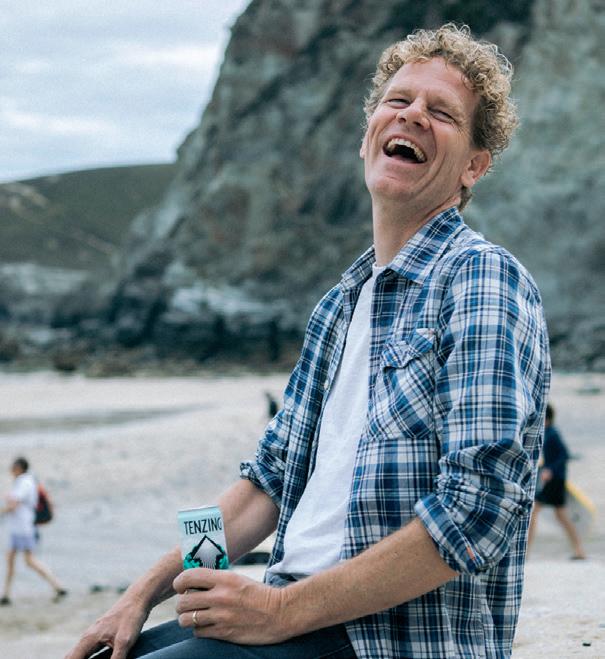
Business Leader - Inspire • Inform • Connect 1
CONTENTS
48
8
EDITORIAL
Oli Ballard - Director
E: oli.ballard@businessleader.co.uk
James Cook - Digital Editor
E: james.cook@businessleader.co.uk
Serena Haththotuwa - Digital Editor
E: serena.haththotuwa@businessleader.co.uk
Alice Cumming - Digital Editor
E: alice.cumming@businessleader.co.uk
DESIGN/PRODUCTION
Adam Whittaker - Head of Design
E: adam.whittaker@businessleader.co.uk
SALES
Emma Filby - Head of Advertising
E: emma.filby@businessleader.co.uk
Sam Clark - Head of Awards Sponsorship
E: sam.clark@businessleader.co.uk
DIGITAL & WEB
Josh Dornbrack - Head of Multimedia
E: josh.dornbrack@businessleader.co.uk
Gemma Crew - Social Media & Community Manager
E: gemma.crew@businessleader.co.uk
Rosie Coad - Marketing Executive
E: rosie.coad@businessleader.co.uk
Joshua Phillips - Website Development
E: joshua.phillips@businessleader.co.uk
CIRCULATION
Adrian Warburton - Circulation Manager
E: adrian.warburton@businessleader.co.uk
ACCOUNTS
Jo Meredith - Finance Manager
E: joanne.meredith@businessleader.co.uk
MANAGING DIRECTOR
Andrew Scott - Managing Director
E: andrew@businessleader.co.uk
OUR COMMITMENT
Business Leader Magazine is committed to a zero carbon future and supports the World Land Trust by using recyclable paper wrap rather than plastic polywrapping. Carbon-balanced PEFC® certified paper, which is sourced from responsible forestry, is produced in an environmentally-friendly way to offset our CO2 emissions.
The festive period and fresh quarter are almost upon us. With the turbulence that 2022 has brought, and with ever-lingering talk of the economy sinking into an official recession, a break and time to reflect may just be what the doctor ordered for business leaders across the country.
Despite the well-reported doom-and-gloom, we took over the Tobacco Dock in London for our annual Scale-Up Awards ceremony. The night was a spectacular celebration of UK business, recognising some of the country’s most exciting and innovative companies. Expertly hosted by comedian Russell Kane and with Dragons Touker Suleyman and Theo Paphitis in attendance, it was difficult not to look past the glum outlook to appreciate the breadth of talent and entrepreneurialism in the business world. Congratulations to all of the winners and a special thanks to our judges and sponsors.
In this edition of Business Leader magazine, we bring you our exclusive interview with the incredible Dr Anne-Marie Imafidon MBE. But there’s much more than meets the eye with the child prodigy turned founder of Stemettes, a social enterprise which encourages girls and young women aged 5–25 to pursue careers in Science, Technology, Engineering and Maths.
We also look into the role of a NED and how it could shape your business, the ‘quiet quitting’ phenomenon, the future of AI in business and much more. So sit back, sip your bubbly, nibble on your mince pie and get ready to change the landscape of business in 2023.
Oli Ballard Director Editor@businessleader.co.uk
| @Oli_BLeader
December/January 2023 2
CBP006462 PEFC/16-33-254 PEFC Certified This product is from sustainably managed orests and controlled sources www.pefc.org WELCOME KEEP UP TO DATE WITH BUSINESS LEADER MAGAZINE TWITTER @BLEADERNEWS REGISTER FOR EVENTS TALK TO THE TEAM ABOUT CAMPAIGNS AND PR FACEBOOK BUSINESS LEADER LINKEDIN BUSINESS LEADER RECEIVE BUSINESS LEADER MAGAZINE AT HOME
EDITOR’S WORD


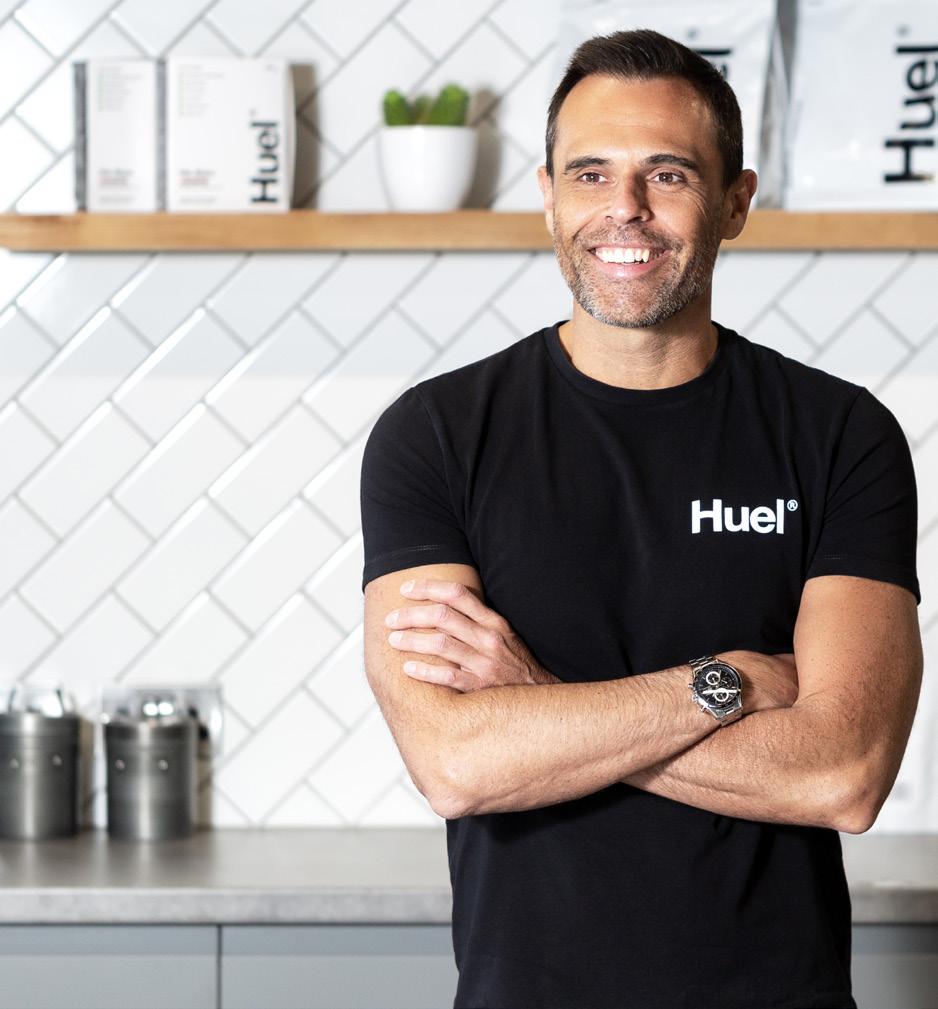
WWW.BUSINESSLEADER.CO.UK/SUBSCRIBE EMAIL: SUBSCRIBE@BUSINESSLEADER.CO.UK DON’T MISS A SINGLE ISSUE OF BUSINESS LEADER MAGAZINE Each issue of Business Leader Magazine is packed with news, interviews and features from some of the UK’s most inspirational and thought-provoking leaders in business. SCAN HERE 9 772632 715003 ISSN 2632-7155 9.75 ISSN 2632-7155 9 772632 715003 ISSN 2632-7155 9.75 SUBSCRIBE CHOOSE FROM 6 Editions £34.95 12 Editions £59.95 (VOLUME DISCOUNTS AVAILABLE) Printed on recycled paper and delivered in a plastic-free recycled envelope, subscribe today and have each edition delivered to your door. You’ll also get early-bird access to events and special features.
“many sleepless nights” for made.com founder as company collapses
Made.com has announced it will go into administration after failed attempts to find a buyer. The online furniture retailer previously announced its shares had been suspended and that it was on the brink of collapse.

Founded in 2010, the firm has offices and warehouses across Europe and Asia and operates in seven European markets. The London-based retailer also employs 650 people worldwide. The company shot into the spotlight as a result of the pandemic when many consumers turned to the brand.
In a statement on Linkedin, Ning Li, the Founder of the company, exclaimed
that he had “many sleepless nights” as the company descended into collapse. In the post, Li explained how he submitted a final proposal to the board of directors and PwC, going in with his own money as investors were sceptical. However, his proposal was unsuccessful.
Li exclaimed in his post: “Just like you all, I wanted the brand to live on and live well. Last Friday, I submitted my 3rd and final proposal to buy the company back to the board of directors and PwC.
“I couldn’t raise external money – all the investors were spooked by the situation – so I went all in with my own cash.”
DEMAND FOR METAVERSE AND NFT SOARS WITH RISING TRADEMARK APPLICATIONS
A new report has shown that there has been double the amount of trademark applications for NFTs and metaverse-related items in 2022 compared to the previous year.

The report from BitStacker.com illustrates that there were 6,290 trademark requests for NFTs sent to the USPTO between January and September 2022. This contrasts to just 2,179 trademark applications in 2021, which is an increase of 188.66%.
Similarly, there have been over 4,600 requests for metaverse trademarks in 2022 so far compared to just 1,798 in 2021. An increase of over 156%.
dragons’ den star launches fourth successful business
Matt Jones, who built and sold a UK advertising agency in October 2019 before launching a men’s skincare business and appearing on Dragons’ Den, is now enjoying success with a fourth company.
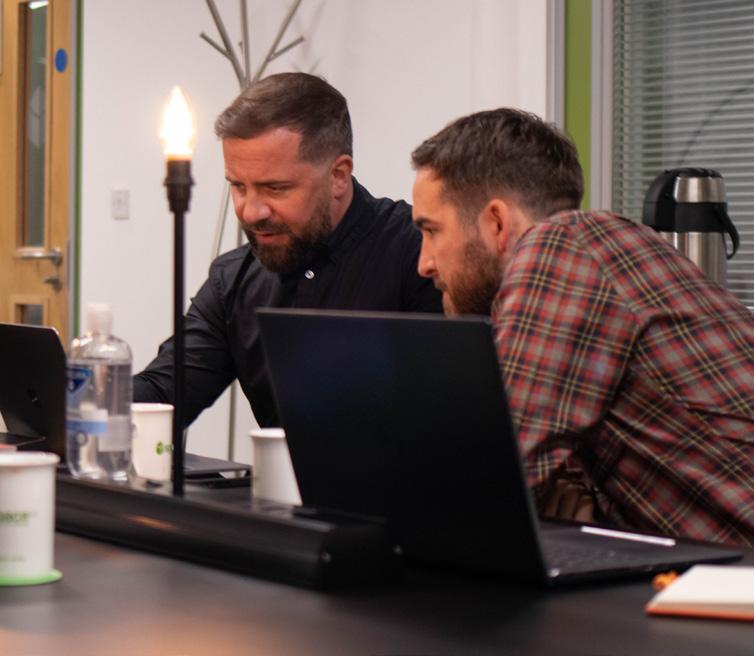
Cardiff-based Rebel Lion Advertising, which launched in 2022, has already surpassed the six-figure turnover mark and has an impressive client list of businesses across the UK.
Rebel Lion Advertising uses their three disciplines of Advertising, Growth, and Creative to get their clients results with significant impact. Rebel Lion has taken on several clients that are challenger brands to their industry or have a strong purpose and story.
Rachael Flanagan, CEO of Mrs. Buckét said: “We wanted to focus on how Mrs Buckét is committed to changing the face, and practices, of commercial cleaning, so Rebel Lion Advertising’s ethos of being ‘designed to do things differently’ really sang to our intention.
“They have taken both us as a brand, and myself, out of our comfort zones, encouragingly pushing us into uncharted territory. The result was a campaign to celebrate our launch as a national business as we push further into the UK, expanding our horizons and potential.”
CEO of Rebel Lion Advertising Matt said: “The team at Rebel Lion Advertising are communication specialists that are obsessive about doing things differently.
“We only want to work with the most innovative, progressive brands that have the agility and foresight to try new ways of engaging audiences. Our success, I think, is down to this ethos. Our clients are open to trying new things, which is fantastic for our agency and their results.”
December/January 2023 4 NEWS




USING MICROSOFT? Be fearless wi Protect Everything, Be Fearless Protect your business today. Your leading security partner delivering world class Microsoft Security tools in a new era of cyber threats www.chorus.co
MELISSA SNOVER RAISES MORE FUNDING TO FUEL INTERNATIONAL EXPANSION FOR HER BUSINESS
Personalised vitamin brand Rem3dy Health have secured funding of over £5m to support international expansion and the development of new technologies.
After launching in the UK and US in 2020, Nourished (the vitamin brand under Rem3dy Health) has long seen Asia as a key target region for expansion and it says partnering with Suntory Group will help with this. Rem3dy says it recognised the opportunity to grow as the sector continues to expand.
Founder Melissa Snover is no stranger to securing large investments for Rem3dy Health. In 2019, she broke the record for the highest UK Seed Funding by a woman, securing over £2m. Then in 2021, she locked in a further £8m in Series A funding.
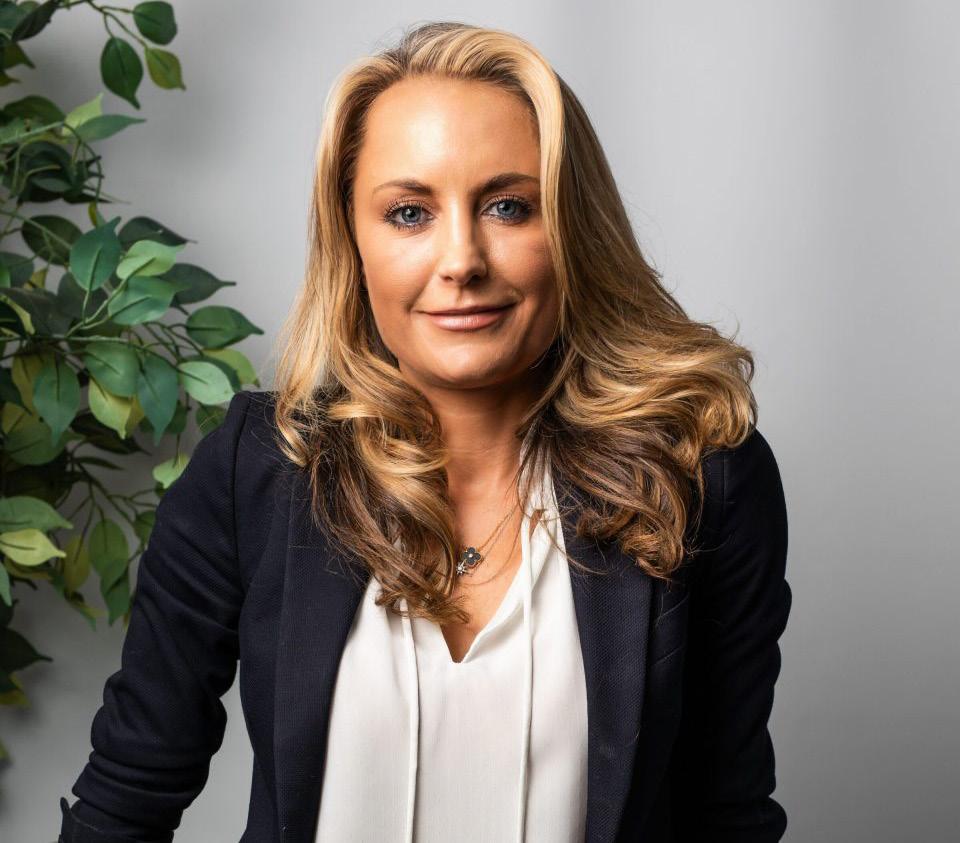
ELON MUSK RANKED 2022’S MOST INFLUENTIAL CEO

New research from the end-toend automated payment solutions company, Tipalti has looked into Instagram mentions, Twitter followers, TikTok views, IMDB credits, YouTube appearances, and overall Net Worth to conclude which CEOs are the most influential in 2022.
Elon Musk has been crowned as the most influential CEO with a score of 9.95 out of 10. He has been incredibly successful as the CEO of Tesla since earning the job in 2008 and he just purchased Twitter.
Elon Musk had the most fan-created merchandise, returning over 25,000
results when searching for his name. He also has a perfect social media score of 10 out of 10, as he has the most followers on Instagram, Twitter, and Tiktok.
Bill Gates takes second place with a CEO influencer score of 9.54 out of 10. The Microsoft co-founder has the most TV appearances with 241 IMDB credits.
Jeff Bezos completes the top three with a CEO influencer score of 9.24 out of 10. The Amazon founder was the richest man in the world with a net worth of £121bn for four years before Elon Musk overtook him this year.
UK NOW HOME TO MORE THAN 1,000 B CORP BUSINESSES
Britain has one of the largest and fastest-growing communities of sustainable businesses in the world, as B Lab UK announces that there are now over 1,000 Certified B Corporations in the UK.
B Corporations (or B Corps) are businesses verified to high standards of social and environmental performance, transparency, and accountability.
Household names who are part of the first 1,000 to have achieved B Corp status in the UK include Innocent Drinks, Jojo Maman Bébé, Baringa, Finisterre, Sipsmith and Simplyhealth, while a number of famous faces, including Jamie Oliver, Matthew Freud, Emma Bunton, Jamie Laing, and Bear Grylls, have also worked to certify their businesses.

December/January 2023 6 NEWS
Three factors driving currencies
Global currencies continue to be buffeted by headwinds, both political and economical. Our experts spell out what this could mean for you.
1. Electric nightmares
The energy crisis is expected to deepen going into 2023.
In its latest World Energy Outlook, the International Energy Agency warns “the upcoming Northern Hemisphere winter promises to be a perilous moment and a testing time for EU solidarity – and the winter of 2023-24 could be even tougher.” 1
Russia’s gas outflows to Europe have fallen by 80% since the war and although gas reserves have been topped up, all eyes will be on the weather. “A cold snap could see these stockpiles rapidly depleted,” says Jake Trask, Senior Corporate Client Manager at OFX. “Rationing of supplies would cripple economic output and see the euro under even more pressure, driving investors to the safety of the US dollar.”
2. Deepening conflict
Russian President Vladimir Putin shows no sign of backing down from the disastrous war in Ukraine. On top of the 300,000 new conscripts, Putin has been mobilising Russian industry and the economy for his “special military operation”effectively sending the message the country was digging in for a protracted war. 2 He has raised the spectre of nuclear action by asserting Ukraine was preparing
a “dirty bomb” 3 and on November 1 suspended participation in the deal to allow safe passage of Ukrainian grain exports.
AS SEEN ON TV
“Food and energy costs will likely remain elevated, adding upward pressure to global inflation, especially in the Eurozone,” says Trask. “If Russia blocks the export of grain from Ukraine or completely cuts off energy supply altogether, food and energy could spike higher.” That will place further downward pressure on the euro and the pound.
3. Diverging economies
The Eurozone and UK are clearly facing headwinds that will dampen growth. By contrast, the US continues to power along, with the October quarterly figures showing 0.6% growth after two consecutive quarters of contraction.
Despite hits to private sector demand and the housing market, the job market remains strong and consumer spending also increased. 4 Inflation continues to rise albeit at a slower pace5 , prompting the Federal Reserve to raise interest rates by another 0.75% in November.
Despite high inflation the European Central Bank and Bank of England will be wary of raising rates too sharply in the face of such challenging economic conditions.
The expectation of further aggressive rate hikes from the US Federal Reserve means the US dollar is likely to extend its gains even further against the pound and the euro as we head into 2023, says Trask.
OFXpert Tip
Having an ongoing currency risk management plan can be an effective way for your business to manage volatile markets. Our OFXperts help businesses get more certainty over their FX costs and even maximise upsides using the right combination of simple FX tools. And they’re here to help 24/7.
1 www.iea.org/news/world-energy-outlook-2022-shows-the-global-energy-crisis-can-be-a-historic-turning-point-towards-a-cleaner-and-more-secure-future. 2 www.bbc.com/news/world-europe-63414324. 3 www.nytimes.com/2022/10/24/us/politics/russia-dirty-bomb-west-ukraine.html. 4 www.nytimes.com /2022/10/27/business/economy/us-economy-gdp.html. 5 www.marketwatch.com/story/coming-up-pce-inflation-and-consumer-spending-11666959077

Visit OFX.com or talk to an OFXpert 0207 614 4195
Jake and See Wah, OFXperts
Queen Ethelburga’s Collegiate
Welcoming day students from 3 months to 19 years and boarders from Year 3 www.qe.org

SHE’S IN CTRL
MEET THE ‘CHILD GENIUS’ TURNED TV PERSONALITY AND BUSINESSWOMAN ON A MISSION TO GET MORE FEMALES INTERESTED IN TECHNOLOGY
Dubbed a child prodigy, Dr Anne-Marie Imafidon MBE was the youngest girl to pass A-level computing at 11 years old. She then went on to receive a Master’s in Mathematics and Computer Science from the University of Oxford at the tender age of 20.





Having held positions at Goldman Sachs, Hewlett-Packard and Deutsche Bank, Imafidon is no stranger to having a seat at the table. However, she soon realised the table was far from diverse.
In between stints on Channel 4’s Countdown and running her own project, Stemettes - a social enterprise that aims to empower and enable young women in the STEM sector - we sat down for a conversation with Anne-Marie to speak about her new book She’s in CTRL, her motivations, and more.

YOU HAD A UNIQUE EXPERIENCE AT SCHOOL BEING A CHILD PRODIGY. HOW WOULD YOU DESCRIBE GROWING UP?








It was a lot of fun. I’m the eldest of five, so there were seven of us in one house – which meant there was never anywhere you could go to be by yourself. We did everything together. We ate together and watched TV together. From the outside, it probably seemed fast-paced, but on the inside, it wasn’t like that - it was good times. My parents were active in the church so there were always people around our house.
WAS THERE SOMETHING ABOUT THIS ENVIRONMENT THAT WAS A DRIVING FACTOR BEHIND YOUR SUCCESS?


Not really. I never had a plan growing up. I try things out to see where it goes and follow it to some sort of logical conclusion. I never felt like I really wanted to do well at school – more than any external forces or expectations from others, I just thought “this is cool”.
I’m a doer but I’m not the type of person that puts pressure on myself to be the first or the best. That’s not really the way I live my life. My motivations have obviously changed as I’ve gotten older, but really, I’m just here for a good time.
Some might assume you were put under pressure from people around you growing up. It’s interesting to hear you say you were just following what you were good at…







I was just doing what I enjoy at my own pace. No one can get me to do anything that I don’t want to do. It still annoys my parents now, I’m sure there are a lot of things that they wish I was doing that I’m not.
I genuinely enjoy the maths, the tech, and learning. I also enjoy trying new things and applying what I’ve learned – that’s really been what’s driven me. Those stereotypes that people have of child geniuses and child actors are just things that didn’t play out for me in my life.
December/January 2023 8 COVER STORY
Cont.
watch the interview here

“I’M A DOER BUT I’M NOT THE TYPE OF PERSON THAT PUTS | PRESSURE ON MYSELF TO BE THE FIRST OR THE BEST. THAT’S NOT REALLY THE WAY I LIVE MY LIFE. MY MOTIVATIONS HAVE OBVIOUSLY CHANGED AS I’VE GOTTEN OLDER, BUT REALLY, I’M JUST HERE FOR A GOOD TIME.”

DR
IMAFIDON MBE
ANNE-MARIE
WERE THERE ANY ROLE MODELS THAT INSPIRED YOU AT THAT TIME?










It was less about role models for me. I remember learning about Tim BernersLee, because I was on the Web a lot, and thinking: “He’s a British Physicist and I’m British and like science and maths too.” I remember feeling it was cool that he made something so impactful throughout the world. I felt if that’s something that I could do one day, then why not?
More than role models, I had the right people around me who wanted to open opportunities for me. I believe that if you can see it, then you can be it. For me, I could see the tech and the logic – this was my motivation.
DO YOU THINK YOU WENT INTO STEM FOR YOUR SHEER LOVE AND ENJOYMENT OF IT?

It was my love for creativity that made me go into it. Whether it was playing with databases, which I was fascinated with from the age of ten, or typing stories on my dad’s computer at the age of four, my motivation for going into STEM was about exploration, learning and understanding.
It was about me being able to logically apply things I had seen and learned about databases, the Web, or about whatever maths we had looked at that week in school. That creativity is what drew me to STEM – it was a way to understand the world.



Queen Ethelburga’s Collegiate
Welcoming day students from 3 months to 19 years and boarders from Year 3 www.qe.org
WHERE DID YOUR MOTIVATION TO START STEMETTES COME FROM?
I went to a conference in America in 2012 and there were 3,500 technical women there. It was the first time I was in a majority female environment, and we were all technical – there were data scientists, developers, or women working in cybersecurity. It wasn’t even something I knew I was missing in my life.

There was a keynote at the conference and this woman explained how in the US, the number of women engaging in tech had been in freefall over the last decade. I did more research into it and realised this has implications for us economically, ethically, politically and societally. I wanted to do something about it for my unborn children - if I ever have daughters, I want them to know STEM is an option for them.
When technology is so ubiquitous and driving so many decisions that are made across society and a part of the things people use every day, us not having different voices in the room is doing more harm.


I love being a technologist, but I want to be proud of the legacy that we’ve left. That’s why my book is called She’s In CTRL, so that women can take back tech because these problems are so far-reaching. So, that’s my motivation no matter what I do.
DID

OPPORTUNITY FOR
TO START STEMETTES COME ABOUT?
When we started Stemettes in 2013, the stats were that almost 50% of the schools in the country didn’t have any girls doing A-Level Physics. So, these girls feel like they are the only ones in their school even






December/January 2023 10
COVER STORY
HOW
THE
YOU
“MORE THAN ROLE MODELS, I HAD THE RIGHT PEOPLE AROUND ME WHO WANTED TO OPEN OPPORTUNITIES FOR ME. I BELIEVE THAT IF YOU CAN SEE IT, THEN YOU CAN BE IT.”
though they aren’t the only ones in the country in that position. So, I asked: “How do we connect these people?” If you’ve got mentors and a network, you’re more likely to have the resilience to stay in STEM. Some people take up yoga, I took up the Stemettes project. Within eleven months, we were at Downing Street. We were the disruptors in the corner saying that this issue is of national and international importance. But I like sleeping and I had a full-time job.
I actually called it ‘a monster’ because it took on a life of its own, and I was going to close it down because it had been a year. But I had people come and tell me their kids were relying on me, so I decided it was time to get funding in and grow it.
WHY HAVE WOMEN AND GIRLS TYPICALLY BEEN EXCLUDED FROM STEM SUBJECTS?
If you want someone to name a scientist or technologist, it will most likely be a dead white man with a beard.
Not that these men haven’t contributed to STEM, but there are a lot of people that have contributed to STEM. There is a rich ‘herstory’. Whether it’s in the invention of GPS, Wi-Fi, bulletproof vests, or Bluetooth, there are many things women have done or contributed towards. But there’s been a very overt erasure of those stories and that narrative. It’s something we don’t see in our headlines, in our storytelling and we don’t see it as part of our collective history.
In the UK, there were housewives in the 1960s who were coding from their kitchen tables, but when we think about the 60s, we think of Twiggy and miniskirts – that’s it. Women have done great things, but it isn’t a part of their psyche.
WHAT WAS YOUR EXPERIENCE OF ACHIEVING FUNDING?
Because we are a social enterprise, we went down a different route in terms of raising funds and generating investment. I wasn’t full-time on Stemettes until about three years into the journey. We were being paid to provide the services we were doing; we were essentially bootstrapping.
We had funders and people who were willing to pay for what we were doing, and people wanting to sponsor, fund and donate to us. Whether it’s statutory funding, foundations, or companies that know they have a problem on their hands and they want to invest in the future, that’s
how it’s been. Not everything is about investment, you can build a business in other ways.
HAVE YOUR MOTIVATIONS CHANGED AT ALL?
The overall mission hasn’t changed. It’s still trying to avoid that dystopian world where women aren’t involved in so many decisions. Day-to-day it’s tough –managing a team of 21 people can be tough. Especially during the pandemic and post-pandemic when there were all these new ways of working. Human beings are human beings. They’re not algorithms or databases.
The motivation is the time I get to spend with young people, so I do that as much as I can. You get to see connections being made and young people coming back to the sessions. Young people come back and tell stories about how they didn’t get the results they wanted and now they’ve got a First Class Degree and are going to do Computer Science.
people or considerations when rolling out these technologies. I’m a trustee at the Institute for the Future of Work – a lot of these technologies are data-driven. The technology is allowed to do what it has been created to do, without any checks, balances, considerations, impact assessments or any real accountability.
We can’t be as arrogant as we have been up until this point – knowing computer science doesn’t mean you know the scenarios that it’s being applied in. This isn’t just deterministic, in a vacuum, this is affecting real lives.
It’s important for computer scientists to be wise about the roll-out of these technologies, rather than getting caught up in the technology and excitement of being a computer scientist. What are the decisions we can make today to make sure we leave a legacy we are proud of tomorrow?
YOU HAVE A UNIQUE AND ASPIRATIONAL STORY. DO YOU EVER GET MOMENTS
OF SELF-DOUBT?
I wouldn’t say I have any negative self-talk or even imposter syndrome. For me, a lot of the spaces I’m in I have been invited to, so I know there is value I can bring –because I know the experiences I’ve had and the network I have.

As a mathematician and computer scientist, everything is deterministic and logical. Humans are not. I could say hello to someone on two different days and get two completely different responses based on what else is going on in their lives. As a leader, that’s a tough thing for me to try and understand – how to build a culture that allows different types of people to thrive.
HOW DO YOU DEAL WITH FAILURE AND ADVERSITY?
There’s not just one threat. I wouldn’t say either AI, robotics, the metaverse or blockchain are the biggest threat. For me, the threat is not having the right
I believe in the process of ‘build, measure, learn’, which is all about failure. If anything, it makes me suspicious if something doesn’t go wrong. I enjoy failures because you hit the ground and then you build back up, so that’s how I know I’ve succeeded. Life’s an iteration. You live, and you learn. If there are no mistakes, you won’t learn. As a business leader, you already know that, so it’s then how you go about managing those failures as opposed to avoiding them altogether. I’m very efficient in my brain, so I only remember the lesson learned rather than the failure itself.
Business Leader - Inspire • Inform • Connect 11
IMAFIDON MBE
DR ANNE-MARIE
WHAT MIGHT BE THE BIGGEST TECHNOLOGICAL THREAT IN THE FUTURE?
“NOT THAT THESE MEN HAVEN’T CONTRIBUTED TO STEM, BUT THERE ARE A LOT OF PEOPLE THAT HAVE CONTRIBUTED TO STEM. THERE IS A RICH ‘HERSTORY’.”
This
THAT WAS THE YEAR THAT WAS…
The 1st of January 2022 was the warmest New Year’s Day on record – an omen that political temperatures were about to rise considerably throughout the year?
Let’s see how politics in 2022 played out…
JANUARY
With large numbers of Covid infections and deaths still being reported the year starts ominously.
Days later, ITV News publish an email sent to Downing Street staff, during the first lockdown, inviting them to a “bringyour-own-booze” party at No 10. Christian Wakeford, Conservative MP in Bury South, defects to Labour, citing Partygate as the reason.
Inflation hits 5.4%.
FEBRUARY
Trying to get on the front foot, the PM publishes the government’s Levelling Up White Paper, to help redistribute investment to the North. The strategy gets little attention because the next day senior advisors at No 10 start resigning.
More Partygate evidence comes to light, including a picture of Boris stood next to a bottle of champagne and a tinselwearing official.
The Queen celebrates her Platinum Jubilee, on the 6th February, marking 70 years on the throne.
The weather takes a turn for the worse with three major storms battering the country. Russia invades Ukraine.
MARCH
The month is relatively quiet, though the Bank of England raises interest rates from 0.5 to 0.75%. Inflation goes from 5.5 to 6.2%.
The Met Police have now investigated Partygate and say Fixed Penalty Notices are to be issued.
APRIL
April Fools Day is marked by the not-sofunny 54% increase in the energy price cap from £1,278 to £1,971. On the 6th, National Insurance contributions increase by 1.25%, then inflation hits 7% by the middle of the month.
As if to help deal with family pressures, the government introduce ‘no fault’ divorces, though soon after barristers start striking for extra pay – making it difficult to get legal representation, should you need it.
Home Secretary Priti Patel announces her Rwanda immigration plan and Boris Johnson, his wife, and Rishi Sunak are issued with Fixed Penalty Notices over Partygate.
MAY
Interest rates hit 1.0% and later in the month inflation reaches 9%, though unemployment drops to its lowest level since 1974, whilst rail workers vote for strike action.
More Partygate revelations are published and Conservative MPs start calling for Boris Johnson to stand down as PM. To top it all, monkeypox hits our shores and numerous outbreaks are reported.
JUNE
The Queen’s Platinum Jubilee celebrations cheer everyone up, though this is marred by rail strikes throughout the month, interest rates reaching 1.25% and inflation topping 9.1%.
The Rwandan immigration policy is halted by the European Court of Human Rights, just to prove we still don’t have sovereignty, and Boris Johnson survives a vote of no confidence from his MPs.
JULY
With claims the PM knew about sexual allegations against a Tory whip, Chris Pincher MP, when he appointed him, dozens of government ministers start to resign, including Sunak, citing concerns over Johnson’s leadership.
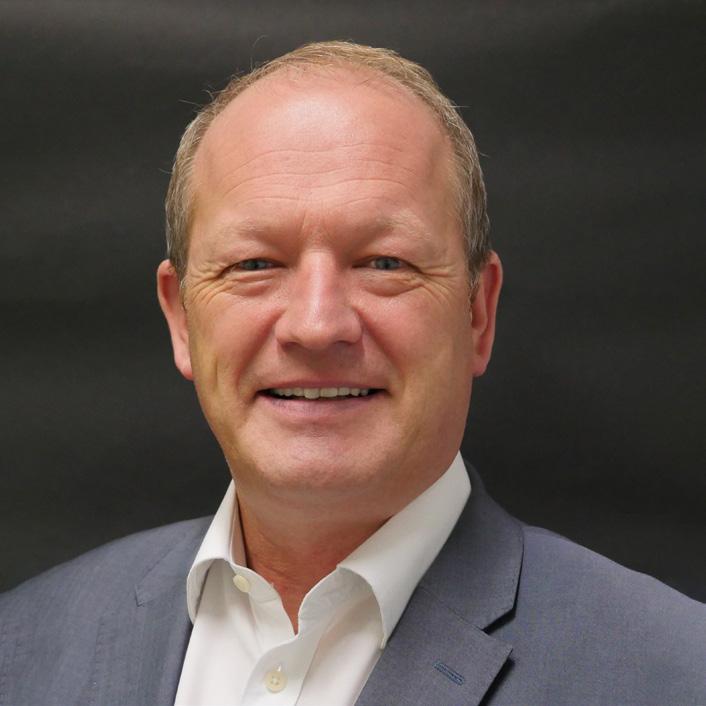



Boris announces his resignation, and a Conservative leadership election begins, seeing Rishi Sunak and Liz Truss down to the last two.
With inflation reaching 9.4%, record temperatures are recorded and grassfires break out around London.

December/January 2023 12 AGENDA
article is written for Business Leader by former MP, businessman and author, Simon Danzcuk.
AUGUST
Interest rates reach 1.75%, inflation tops 10.1%, dockers and postal workers start striking, rail workers and barristers continue striking, and Just Stop Oil protesters upset nearly everyone.
SEPTEMBER
Liz Truss wins the Conservative leadership race and becomes PM on the 6th, two days later the Queen dies at Balmoral, and Prince Charles becomes King.
With the country in mourning a state funeral takes place on the 19th. Days later the new Chancellor, Kwasi Kwarteng, holds a mini-budget which panics the markets, sees the pound collapse, and pension funds have to be propped up by the Bank of England.
OCTOBER
By mid-October the new PM has sacked her new Chancellor, replacing him with Jeremy Hunt, and most of the mini-budget is reversed. On the 19th Suella Braverman,
the new Home Secretary, resigns and the next day Truss announces her resignation as PM – just 45 days into the job, making it the shortest tenure in UK history.
Another Conservative leadership election ensues, but with Penny Mordaunt failing to get enough nominations, and Boris Johnson refusing to stand, Rishi Sunak is elected unopposed and becomes PM.
A new cabinet is formed, and Suella Braverman becomes Home Secretary again.
NOVEMBER
Interest rates reach 3.0% and inflation tops 11.1%. Jeremy Hunt, who has remained Chancellor, delivers another budget, the Autumn Statement, which increases taxes and cuts public spending.
Gavin Williamson resigns as a Minister over bullying allegations, and the disgraced former Health Secretary, Matt Hancock joins ‘I’m a Celebrity… Get Me Out of Here!’
DECEMBER
A by-election takes place in Chester, the Levelling Up policy is dropped in all but name, inflation and interest rates remain high, strike action, Just Stop Oil protests and high levels of illegal immigration all continue.
With a year like 2022, one can only hope both the weather and our politics in 2023 are more moderate and less tempestuous. Happy New Year!

Business Leader - Inspire • Inform • Connect 13 POLITICAL ROUND-UP
WHAT ARE THE LATEST TRENDS IMPACTING THE FUNDING WORLD?
Raising money in today’s climate is tough. There is a pullback in funding. The figures are off of 2021’s highs. The drop is another upshot of soaring inflation and widespread economic uncertainty.
The combination of an unfriendly tax system and the abolition of the entrepreneur's relief has had a devastating impact on investment. Add to that the ongoing complications of Brexit, the current cost of living crisis, the devastating Ukraine war and the shaky political climate, and the obstacles continue to mount. After years of an optimistic money boom, is the tide turning?
According to Dealroom figures, there is still plenty of life left in finance and funding. There was $385m invested at the pre-seed stage in Europe in 2012. In 2021, that figure hit $1.3bn. The global tech slowdown is having an impact on larger, more established firms, but entrepreneurial tech talent is at an all-time high, alongside a shift in investor emphasis to preseed and seed-stage start-ups.
This change of focus is evident. For example, global VC firm Antler has made a £960,000 pre-seed investment into eight UK technology start-ups. Likewise, companies like Londonbased Sidekick, a digital active investment manager, is just one example showing the everpresent appetite for investment. Sidekick raised a £3.33m pre-seed equity round on the 27th of October 2022, led by Octopus Ventures, one of Europe’s largest and most active VC investors.

ROUND AFTER ROUND AFTER ROUND
Within Silicon Valley and the technology industry, big funding rounds continue to capture a lot of headlines. Peers and competitors rush to congratulate founders who take in millions of pounds in a B or C round, as if raising money was the desired outcome of the business.
Investments in US tech start-ups plunged 23% over the last three months, to $62.3bn, the
steepest fall since 2019, according to PitchBook. What has changed? Are investors noticeably retreating from the market as the economy buckles up for a potential recession, or are they still writing cheques. Are investors getting more risk-adverse?
Not according to Nick Kingsbury, Partner at Amadeus Capital Partners
“No, we are not more risk averse. We are still backing great teams with unique tech in large markets, what has changed is that we are expecting the pace of spending by our companies will be slower than they would have been last year; very aggressive hiring plans are out, as are expensive marketing campaigns!”
14 FEATURE
In 2021, VC funds were being raised and invested in businesses at a record pace, pushing competition and valuations up to unseen heights. 2022 has been characterised by fears of a recession, as inflation has spiked to generational highs. With interest rates rising fast to combat an overheating economy, investors in start-ups may turn off the funding taps as capital becomes more expensive.

Jeremy Chelot, Chief Executive Officer at Netomnia, is optimistic about available funds, while recognising the growing discernment of investors.
“There is capital available, but the debt market is becoming more expensive and equity providers are being more selective,” comments Chelot.
Malcolm Ferguson, Partner at Octopus Ventures, advises that investors may vary across the board, can be glass half full or half empty, but risktakers still triumph.
“Many are taking more risk averse approaches while others, Octopus Ventures among them, see now as an excellent time to make new investments - historically, challenging economies produce world changing new businesses”, he says.
Limited Partners are taking a more cautious route, experiencing the impact of the ‘denominator effect,’ which is causing LPs to be more prescriptive with allocations.
“LPs - the institutions that provide the capital for VCs to invest - are being more cautious in providing funds and VCs are investing more slowly, being more measured in where they invest their money. These forces combined mean funding rounds are taking longer, are less competitive, and generally conclude at more reasonable (by historical measures) valuations,” concludes Ferguson.
INVESTORS LIKE CONCEPTS… AND CASH
What a year for start-up investment. From the outside, it can look simple to start a company and raise millions of pounds on just an idea and little more. The media attention given to VC-funded
companies offers a skewed notion of what it takes to build a business. Success stories like Zayo, Groupon, Snap, Nexon, amongst others, make it look easy. A good idea is just the beginning. Raising capital requires information, patience, resilience, determination and, perhaps, a lot of luck.
Malcolm Ferguson offers a tip to prospective leaders.
"My advice to founders is to ensure growth efficiency is top of mind and also that business plans ensure two to three years of runway, instead of the traditional 18 months."
Malcolm Ferguson
FUNDAMENTAL FUNDS, FINANCES AND FAILURES
Securing funding is one of the most challenging aspects of starting and scaling a business. The UK is the go-to breeding ground for tech unicorns in Europe with 41 billion-dollar companies spanning fintech, e-commerce and artificial intelligence. The UK attracted $40.8bn of VC funding in 2021 - $20bn more than Germanyboasts 48 unicorns and has more than 40,000 start-ups, including companies like Multiverse and Nothing. In fact, the number of unicorns being minted in Europe is growing at a faster rate than Silicon Valley ever experienced. While the US leads the way when it comes to actual numbers of unicorns, Europe, and especially the UK, are catching up, and fast.
UK businesses attracted £7.2bn in VC investment during April–July 2022, down on the £8.5bn raised in the opening quarter of the year, according to KPMG’s Venture Pulse report. VC investment for the quarter was up however, year on year, with £7bn raised in the same period last year.
15 FUNDING Business Leader - Inspire • Inform
Cont.
“MANY ARE TAKING MORE RISK AVERSE APPROACHES WHILE OTHERS, OCTOPUS VENTURES AMONG THEM, SEE NOW AS AN EXCELLENT TIME TO MAKE NEW INVESTMENTS - HISTORICALLY, CHALLENGING ECONOMIES PRODUCE WORLD CHANGING NEW BUSINESSES.”
There are many successes. Crowdfunding investors in Scottish craft brewery BrewDog received a 2,765% return on their equity investment. However, there’s also a high risk of losses, given that approximately 50% of start-ups fail within the first three years, according to the Office for National Statistics.
The past decade has been one of explosive growth with more than 1,000 global unicorns, according to CB Insights. Again, this year looks different. In 2022 YTD, seven companies became a unicorn, down by 68% from last year's YTD. Average funding raised by a company until it became a unicorn in 2022 (YTD) was $304m, up by 22% from last year.
IS AN IDEA STILL INVESTABLE?
Yes, according to Kingsbury, but it has to be truly exceptional and backed up with unique and protectable technology.
“We more often back companies with products in the market, albeit still at an early stage”, he says.

Ideas still need money. And access to funding is drying up as caution escalates in light of the cost-of-living crisis. VC for the third quarter of 2022 totalled $81bn, down by $90bn (53%) year over year and by $40bn (33%) quarter over quarter, according to a Crunchbase News analysis.
While most participants in the start-up ecosystem were expecting a downturn, this dramatic pullback in deployment is sure to send chills down the spine of many founders and funders. Following a record year for venture financings and IPOs, the tech financing market is largely frozen in 2022, particularly at the late stage.
David Belle, self-proclaimed Chief Do-er at Macrodesiac, recognises that financing comes down to opportunity cost of capital.
“When we are in a place where yields (read interest rates) are increasing, the benchmark that capital is effectively weighed against - which tends to be the 10-year yield on US Treasuries - makes investing in firms without a bottom line less attractive. This is why we are seeing tech firms failing, reducing headcount and abandoning projects that otherwise would exist in a low interest rate environment.”
CHANGE IS AFOOT
With estimates from the National Institute for Economic and Social Research showing that there’s well over 270,000 businesses operating in the digital economy, you’ll be in good company if you’re bitten by the tech bug. But do founders and leaders looking for cash need to expect a different future?
“Having the ability as a founder to deploy your own capital and demonstrate the investment case is becoming more important. Having ‘skin in the game’ can help to drive success in securing investment,” according to Chelot.
The past decade has seen a lot of investors value businesses that show tremendous growth over anything else, often at the expense of some business fundamentals like growth efficiency and unit economics. Ferguson thinks that period is over and those all-out growth strategies will no longer work so well.
“That's because higher interest rates mean investors who have been putting money into venture capital funds in the past decade can get returns in risk-free ways and will allocate less to VCs. The knock-on effect is less money to invest in start-ups and less money to throw at growth,” he adds.
At the earlier stages, companies are being forced to show a more efficient sales model and strong revenue retention in order to capture investor interest, but there is still funding for strong companies with strong ideas.

“Great companies are still getting backed. One of the start-ups Amadeus invested in at the seed stage has just closed a $100m Series B investment round. Others are raising £10m, £15m or even £25m! That said, start-ups with weaker propositions are finding it even harder than usual to raise, and I expect angel investors to be especially cautious going forward,” said Kingsbury.
WILL SLOW AND STEADY
WIN THE RACE?
Many companies, like Mailchimp, Shutterstock and Tuft and Needle, have earned billion-dollar valuations, some even have billions of dollars in revenue, but none started with anything greater than
FEATURE
with VC funds being

and geopolitical environment, investors have reverted to more 'normal' behaviours this year.
There is a time and a place for funding, but there is a fundamental change in how we think about it. By deemphasizing investment rounds, there is more opportunity to celebrate companies who develop measurable milestones of value creation, focus on serving a customer with a real need, and generate sustainable businesses with good margins. This is the future of funding.
ACROSS THE POND
Even as US venture funding falls from peak levels, things are still far from slow. Investors have poured more than $16bn into Series A rounds alone this year. Biotech, crypto, property and legal services sectors stood out, but climate tech is winning the race.
Jeremy Chelot
Climate tech start-ups raised around $19bn across 500 VC deals in the first half of 2022, according to Powerhouse Ventures, but will that rate continue?
Carbon and climate start-ups have attracted record investments at a time when other industries are struggling to tap funds from VCs. VC fundraising increased nearly three times and VC investment increased more than five times over the last six years, reaching $56bn in the US.
PitchBook rated climate tech in third place - behind fintech, and artificial intelligence
and machine learning - for the emerging technology most likely to disrupt capital flow from investors in the next five to 10 years.
GOING FORWARD
Private companies valued at over $1bn flourished in 2021, doubling in number. However, growth funding will continue to bear the brunt of a slower market this year. According to the Office for Budget Responsibility, the UK is predicting an economic slowdown between 2023 and 2026, with a short-term recession during the last half of 2022.
Moving away from celebrating funding rounds, founders won’t have to always work toward the big raise. As the global economic downturn continues, everyone, VCs included, are more cautious with cash. Going into 2023, founders focus on staying lean, talking to customers and discovering product-market fit.


How long it will take the VC market to reset, or how many of today’s investors and start-ups will still be standing when it does, remains to be seen.
HUNDREDS OF UK BUSINESSES SLASHING MILLIONS FROM THEIR INVESTMENT PLANS
According to a new survey by Together, hundreds of businesses across the UK have made dramatic changes to their investment plans amid economic turbulence.
Business leaders heading up 300 small and medium enterprises said they had invested an average of £565,000, substantially less than the planned investment of £710,000 over the past 12 months.
The survey findings highlight that the main factors having an impact on businesses are the cost of fuel (37%), input price inflation on the cost of raw materials, labour and transportation (34%) difficulties in recruiting and retaining staff (28%), global supply chain issues (27%) and high taxes (26%).
Meanwhile, nine in ten (89%) business leaders said they’d taken action as a result of the gloomy economic outlook. Nearly a third (30%) have delayed expanding their workforce, 29% have built up cash reserves as a contingency and 26% have reduced their staff headcount or are not replacing workers who’ve left.
Business Leader - Inspire • Inform • Connect 17 FUNDING
“HAVING THE ABILITY AS A FOUNDER TO DEPLOY YOUR OWN CAPITAL AND DEMONSTRATE THE INVESTMENT CASE IS BECOMING MORE IMPORTANT. HAVING ‘SKIN IN THE GAME’ CAN HELP TO DRIVE SUCCESS IN SECURING INVESTMENT.”
money is great and
fuels growth,
With over fifty successful corporate deals under his belt, two businesses created and sold, and over twenty years of experience in the financial services sector, John Farrugia recently became CEO of finnCap Group Plc. We met him to take the temperature of the public and private markets and discuss his plans for the group.
WHAT IS YOUR CURRENT ASSESSMENT OF THE FINANCIAL MARKETS?
Public markets are underperforming but private markets, mergers and acquisitions and debt advisory are still performing well. It’s a new economic environment for many though as lots of investment bankers in their mid-thirties will have never been through a high inflation, high interest rate environment like we are witnessing now.
HOW ARE YOU ENSURING YOU’RE GIVING BUSINESSES THE ADVICE THEY NEED?
finnCap Group is a full-service advisory business, which isn’t common in the market, and as a result we always look to provide businesses with the right advice.

Entrepreneurs will often say they wish to sell their business but sometimes, once spending time with them, you realise the best option is for them to go down the private equity or IPO route. Quite often you see the passion they still have for their business and these two options provide a route to de-risk and to keep growing.
WHAT IS YOUR ADVICE TO SOMEBODY LOOKING TO EXIT THEIR BUSINESS?
Talk to an advisory firm as early as possible as you need the time to ensure the business is as “exit ready” as possible.
Thinking about succession planning, evaluating the operational structure, assessing financial robustness and budgeting and forecasting as well as tax structuring are just some of the issues that should be addressed pre-sale.
Quite often small changes such as appointing the right finance director or measuring your business against the right KPIs can help drive a higher exit multiple Planning early usually results in a smooth M&A process.
WHAT IS YOUR PROGNOSIS FOR THE MERGERS AND ACQUISITIONS MARKET?
Private mergers and acquisitions are as buoyant as ever. I’m not sure it will dramatically slow down. What you typically read about in the papers is the big bulge bracket deals which have certainly dried up. However, we’re seeing a lot of deals happening in the mid-market typically with corporates who continue to make bolt on acquisitions.
You often hear the phrase ‘there is a lot of dry powder’ in the private equity market and it is indeed at record levels. Over the last 5 – 7 years many new funds have been formed focused on the lower mid market and I expect many of these have a continued need to make investments. In conclusion, we’ll be seeing lots of activity and the deals will happen but perhaps at lower prices.
INTERVIEW
‘raising
it
but it is the start of the journey, and you must go and build something that is profitable.’
business leader talks to eminent deal maker john farrugia
YOU JOINED FINNCAP GROUP IN 2008 DURING THE GREAT RECESSION – HOW WOULD YOU COMPARE THEN AND NOW?
M&A deal volume did reduce post the financial crisis by circa 30% in the lower mid market (£10m - £100m) but started to recover by mid 2011. Many of those deals that went on hold during the crisis did end up happening albeit much later than planned.
There are a number of factors at play now; the war in Ukraine, high inflation, increasing interest rates which does impact the economic outlook for corporates, institutional investors and private equity. Due to the high level of uncertainty many are sitting on their hands but I expect in the New Year deal volumes will begin to increase slightly albeit I expect at lower prices.
In addition many entrepreneurs have begun to ask questions about higher levels of capital gains tax. In the short term this may increase the number of transaction but deep down I don’t think there are many entrepreneurs who set up a business who think much about CGT rates on exit.
DO YOU FEEL THAT ENTREPRENEURS IN THE UK EXIT TOO QUICKLY, COMPARED TO OTHER COUNTRIES?
I would say so. I would like to see more UK companies becoming unicorns like you see in the USA. We have a very strong entrepreneurial ecosystem in the UK but I feel that there are many great companies that could have been even greater, had they not sold out so early. We need the private equity and public markets to support them.
It is improving though, compared to ten years ago – if you think about businesses like Ideagen, The Access Group and IRIS, they have all reached unicorn status with both backing of public and private money.

MERGERS AND ACQUISITIONS ARE AS BUOYANT AS EVER. I’M NOT SURE IT WILL DRAMATICALLY SLOW DOWN. WHAT YOU TYPICALLY READ ABOUT IN THE PAPERS IS THE BIG BULGE BRACKET DEALS WHICH HAVE CERTAINLY DRIED UP.”
YOU HAVE STRUCK MANY DEALS IN THE TECH SECTOR – HOW WOULD YOU ASSESS THE UK TECH SPACE?
We have a great tech ecosystem in the UK, which attracts both talent globally as well as investors from Europe and USA setting up firm roots here. This provides the ecosystem with a diverse talent pool as well as access to capital where those investors provide so much support to help those companies grow at pace.
When I look at our financial advisory sector though, I feel we have not evolved as quickly as other sectors in embracing technology such as artificial intelligence and business intelligence, for the benefit of our clients.
YOU RECENTLY TOOK OVER FROM SAM SMITH AS CEO OF FINNCAP GROUP – HOW DO YOU WANT TO LEAD THE ORGANISATION?
My nature is to be the best I can possibly be and to lead from the front and look to dominate the market in which we operate in. Whilst I may be driven by data and constantly look for marginal gains what I did very much learn from Sam was the human touch. I very much want to create an environment where colleagues want to come to work every day, create solid friendship groups but also feel challenged and excel in what they do.
Prior to taking over, I spent a number of months really trying to understand the state of the market both from a private and public markets standpoint. Having assessed many of our competitors, as a Group, given our uniqueness in having a true end to end financial advisory business
we are now looking to implement a plan to accelerate our growth.
WHAT
IS YOUR VISION FOR THE GROUP?
We’re still talked about as a broker but we’re a financial services company. I want to drill home our position as a group that provides excellent strategic-level advisory services to our clients. It’s not just about coming to us to find a new investor, but it’s about us sitting down and working with you to help grow and develop your business –whether that’s bringing a new non-executive director on board, helping the management team set new targets and goals, provide access to capital whether that be public or private, provide constant advice and knowledge of what is happening in the market that is relevant to them.
A key strength in our business is our diversified strategy. Obviously the public markets are quiet right now but our M&A and Debt divisions are still performing well. I look forward to seeing what the Group can do when it is firing on all cylinders.
WITH CORPORATION TAX RISING AND OTHER TAXES GOING UP, DO YOU SUPPORT GOVERNMENT PLANS?
What the Prime Minister is trying to do is correct and we need to find a way to balance the books without strangling growth in our economy – that is a hard job for him and the Bank of England.
I’ve been working in this sector for twenty two years and what you find with leaders, is that when they face adversities like we are going through, they just navigate and overcome them.
Business Leader - Inspire • Inform • Connect 19 JOHN FARRUGIA
“WE HAVE A GREAT TECH ECOSYSTEM IN THE UK, WHICH ATTRACTS BOTH TALENT GLOBALLY AS WELL AS INVESTORS FROM EUROPE AND USA SETTING UP FIRM ROOTS HERE.”
“PRIVATE
deal room
Business Leader highlights a selection of significant deals that have taken place in the last few months.
CONSTRUCTION


HomeServe UK has announced a sixth addition to its portfolio of locally branded companies with the acquisition of Essexbased plumbing and heating maintenance firm Koziwarm. Koziwarm, which has its headquarters in Colchester, was founded in 2014 by MD Terry Maddison and in the last eight years had become firmly established as a reputable and well-regarded business, with a loyal customer base of over 3,500 domestic homeowners.
FINANCE






















Perspective Financial Group Ltd has announced it has completed its tenth acquisition of 2022 with the purchase of Goldwyns Wealth Management Ltd in Southend-on-Sea, Essex. This deal adds 225 households as clients and £70m AUM to the Group. It also gives Perspective a new local office in South East Essex, making a total of 23 offices nationally.
HEALTHCARE
A&U Dental has acquired Citident Dental Practice in Milton Keynes, marking its expansion into Buckinghamshire, and taking its portfolio of surgeries to seven.
A&U Dental was first established by siblings Ambareen Tejani-Sharif and Aly S. Tejani in 2016 and Santander UK has provided the family-run firm with a £2.5m funding package to support the acquisition.




FEATURED DEAL











DISTRIBUTION



Corporate Finance advisor BCMS has advised Audiologic, the UK distributor of professional audio visual (AV) solutions, on its sale to EAV Group, an alliance of distributors of professional AV products and services.
Alongside BCMS, the shareholders of Audiologic were advised by Edward Lee at Blaser Mills Law.




Jim Whitaker of BCMS commented: “One of the great pleasures of this job is helping our clients’ businesses ‘break through’ and move to the next level, and this is exactly what has happened here.”

ENERGY




































































































































































































































Octopus Energy Group has announced it is paying the government to take on Bulb Energy’s 1.5 million customers. The moves come after an almost-year long administration process. It is believed that this will represent a higher amount per customer than suppliers typically paid to take on any of the 29 suppliers who have failed since September 2021.







TECHNOLOGY



xDNA, a global digital agency group, has announced that it has completed the acquisition of Climb Online, a commercialfirst digital marketing agency founded by The Apprentice winner Mark Wright and Lord Sugar in 2015. The acquisition strengthens xDNA’s digital capabilities and brings the group to over 130 people globally, creating one of the largest fullservice digital marketing and software agencies in the UK.
SPORTS Global sports, music, and entertainment agency Wasserman has acquired BSE Media Group and hired the company’s founder Oscar Morilla as Senior Vice President, Talent Marketing and Partnerships, EMEA. BSE will rebrand as Wasserman effective immediately, whilst Morilla and his staff will join Wasserman’s sports talent division.

December/January 2023 20
DEALS ROUND-UP

www.bcms.com YOUR M&A PARTNER Considering your succession planning and exit options? Talk to a team you can trust SCAN ME Tel 0118 207 9800 info@bcms.com “ The service and end result delivered by the expert team at BCMS was exemplary. I cannot recommend BCMS enough as a friendly and safe pair of hands for any company looking to go through a successful business sale process. Simon Stoll, Audiologic, sold to EAV Group, 2022


December/January 2023 22 DEBATE
Future Proof Your Business and Scale With Ease

Cloud users are 50% more likely to effectively expand their go-to market channels


COMPANIES THAT ARE ACTUALLY MAKING A PROFIT’
In this feature, we look at the ingredients that make a fast-growth business. People, funding and technology are put under the microscope.
Tom Callow is Head of External Affairs at myenergi, a business that is one of the fastest growing in both its sector and the UK.
He says that growth is all about overcoming challenges: “If you are wanting to achieve fast growth, you will need to overcome challenges and they can be daily, weekly and longer term. For example, we have had challenges around supply chains during the semiconductor crisis, but we sourced a different kind of microchip, which allowed us to be agile. You have to innovate and find ways through different crises.”
Another ingredient to leading a fast-growth business is people and Dominic Ponniah, who is CEO of Cleanology, says getting the right group of people together has been key to the firm’s explosive growth.
He says they have had twenty years of consecutive growth and in the last eighteen months, the business has seen a 50% increase on the previous period.
He comments: “It sounds obvious but a key ingredient to high growth is people and surrounding yourself with ones that can go and grow the business. You need everything at once too and when all the plates spin in the same direction, that is when the magic happens.”
Dominic also says that he has become better at loosening control of everything.
He explains: “You want people in your team that will come and do a better job than you. You have to let people fail and learn from their mistakes,
but make sure they are good people who won’t fail and screw your business up.”
Jonathan Lister-Parsons, who is Chief Technology Officer at PensionBee, says it is also key to have people in the business that think differently to you.
He says: “As you scale, you need people who will take a different route to achieving goals that you do, and you need to learn from them too. Micromanaging and wanting to have all the answers as you scale is also a challenge, and you need to be honest that you don’t have all the answers.
“You need to be very clear on what the goals of the company are too and what you want to achieve and by when.”
Roni Savage, who is the Founder and Managing Director of Jomas Associates, agrees it is all about the people.
She explains: “For us, it is two-pronged: it’s about the people that work for me and the people we work for. You need to address the needs of both and keep them on side and provide them with the solutions that you know are the best for the company.”
THE PERSONAL CHALLENGE
A fish rots from the head and without clear and visionary leadership, it is not easy to achieve high growth. This is why focusing on personal development and keeping motivated is vital.

Business Leader - Inspire • Inform • Connect 23
Cont.
Future Proof Your Business and Scale With Ease
Cloud users are 50% more likely to effectively expand their go-to market channels
Roni says it is also about mentality: got a positive mindset and I have to have goals in front of me and focusing on the end goal is what keeps me motivated, so I’m not pulled back by certain challenges.”
Dominic adds: achieve success and this doesn’t have to be financial. We set ourselves three-year milestones and we have a clear end goal, which is to sell or float the business. You need to get all your employees bought into the journey though, otherwise your goals are as good as pointless.”

He says external critiques can help too: “In 2016, we brought in a Non-Executive Director in order to give us a different perspective on the business. It has been a game changer as it has applied pressure on the team and myself. It can be hard to keep yourself motivated but having somebody external helps with this.”
day to problems that are helping people and our customers. The Infinite Game by Simon Sinek is a worthwhile read for all leaders. More companies would do well to put less focus on the final success and more focus on what you are getting out of each day.”
Oliver Wright, who is Sales Manager UK&I at NetSuite Oracle, says that goal setting is a good tool for leaders: “It’s nothing new but can often be easily forgotten. Setting goals and what you want to achieve is inspiring, but you need to celebrate your success too.”
NAVIGATING THE FUNDING MAZE
Naturally key to scaling a business is being able to unlock the right funding at the right time. For Jonathan and his team at PensionBee that meant an IPO, which took place in April 2021.
He comments: “The economic situation was a big factor as to why we IPO’d because private markets were no longer providing the capital that we required. It was a long-held plan to list and it allowed us to raise the money we needed to execute our growth plan, invest in marketing and grow our team.
profitable.”
Merilee Karr, who is CEO of Under the Doormat adds her thoughts: “When you are building a business, it is about creating steps. Having a process to reach each step and, once you have done so, not thinking ‘well my job is done now’ – you always need to have a challenge and every year my job in the business is different. I find that hugely motivating.
“You also need to find motivation outside work. How do you switch off? For me, it’s cycling and setting goals. So when I come back from a long bike ride, I have the energy to put back into the business.”
For leaders, there is a pressure to be visible and to always ‘be on’ and Jonathan

“It was about continuity for us, but I would advise others to be aware of the due diligence that is involved. As we are in the pension sector, we have been heavily regulated from the beginning and undergone strong levels of governance, so it was something we were used to.”
Dominic says that Cleanology has been self-funded and is consistently profitable, something which Jonathan says isn’t often celebrated enough.
Jonathan explains: “We have a generation of young people that want to be entrepreneurs and all they see in the media is attention being paid to
Dominic comments further: “There is so much focus on the top line and rarely as a business community do we talk about profit. I see companies that are valued at £200m and little Cleanology has made more profit than them in their entire business lives. Some of the valuations we see are just absurd.”
Merilee also says that the UK funding market doesn’t always have the depth it needs.
American-born, she says: “The UK doesn’t have the depth of equity investor that you do in the USA or properly sustainable debt markets that can be accessed by growth companies.
“Companies are ambitious in the UK too, and they want to export, and we could get a world leader in this area if we had the right financing options in place and investment readily available to those with the right risk appetite.”
Tom adds: “It very much is the case that people are chasing value in terms of valuation, without thinking about profitability. If you are not profitable, why would somebody want to buy you – you need to really focus on this as a business leader and this is what growth should be about.”
December/January 2023 24
“I’VE GOT A POSITIVE MINDSET AND I HAVE TO HAVE GOALS IN FRONT OF ME AND FOCUSING ON THE END GOAL IS WHAT KEEPS ME MOTIVATED, SO I’M NOT PULLED BACK BY CERTAIN CHALLENGES.”
Roni Savage
“IT’S NOTHING NEW BUT CAN OFTEN BE EASILY FORGOTTEN. SETTING GOALS AND WHAT YOU WANT TO ACHIEVE IS INSPIRING, BUT YOU NEED TO CELEBRATE YOUR SUCCESS TOO.”
Oliver Wright
CAN YOU AFFORD A TAX INVESTIGATION?
Dominic Bourquin Tax Consultancy and Corporate Finance Partner
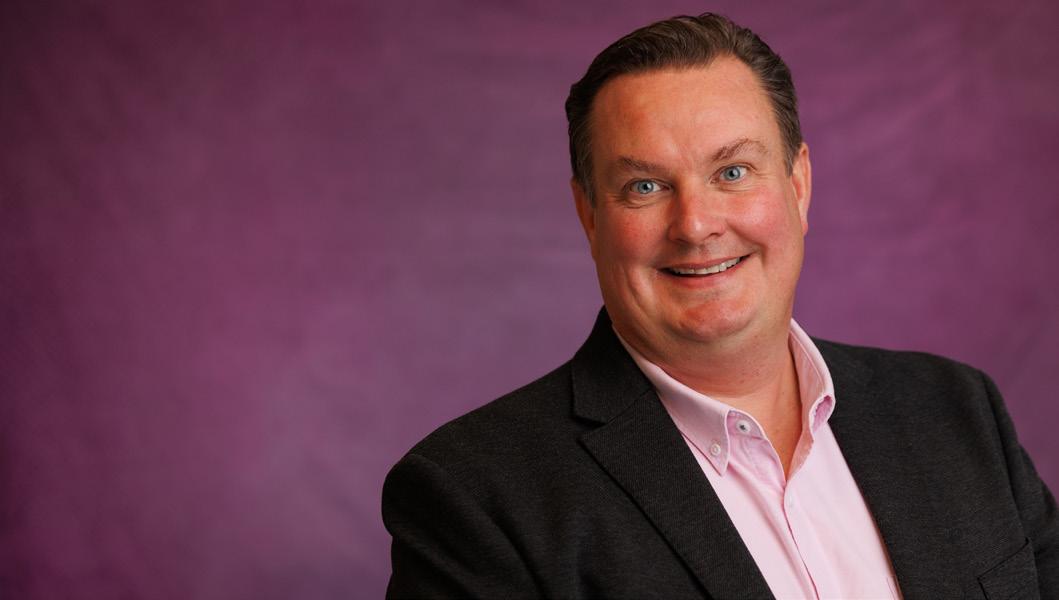
Shoulder to shoulder
Through all of life’s ups and downs, we’re next to you every step of the way.
Find out more about our Tax Investigation Service on our website @ monahans.co.uk /tax-investigation
“In this world nothing can be said to be certain, except death and taxes.” So said Benjamin Franklin, and HMRC is doing its best to live up to this famous quote.
With government borrowing set to tip £2tn, after the effects of the Coronavirus Job Retention Scheme (furlough) and the estimated costs of the energy support package are taken into account, the tens of billions of pounds that tax investigation activities bring in each and every year are crucial to recouping some of this expenditure.
So much so that HMRC hired a 4,100-person strong taskforce last year to launch additional investigations, raising £34.1bn. In the six months up to 31 March 2022, there was a 116% increase in checks that had been opened from the previous six months. Fraud has also been a problem during the pandemic due to the ease with which businesses could claim furlough for their employees – it’s estimated that as many as 10% of claims were fraudulent.
But HMRC doesn’t need to suspect you of wrongdoing – any taxpayer who submits a tax return can be selected at random. And for those who are targeted, investigations can be lengthy – lasting months, even years – intrusive, stressful… and extremely expensive. Paying for an accountancy firm to help you through the process will cost an average of £3,200 in fees. Which is a lot, when as many as 30% of cases result in no additional tax being owed, so you’re needlessly paying out fees when you’re entirely innocent.
So, can you afford to have your tax affairs investigated?
Fortunately, Monahans, the South West’s largest accountancy and business advisory firm, can protect you from such eventualities with a subscription service that mitigates against the risk of being targeted at a fraction of the price. Our Tax Investigation Service removes the financial repercussions and the added stress of undergoing an enquiry, as we stand shoulder to shoulder with you throughout the whole process.
For more information on Monahans’ Tax Investigation Service, visit: www.monahans.co.uk/tax-investigation
Business Leader - Inspire • Inform • Connect 25 ADVERTORIAL
Monahans 2022 BL Dec 22 Ad.indd 1 07/11/2022 15:10 COMMENT
T: 01225 472800 www.monahans.co.uk
BUSINESSFASTLEADER TRACK

In each edition of Business Leader Magazine, we profile a UK business that is experiencing exponential growth in a feature called Fast Track. In this edition, we spoke to ethical packaging firm, Tiny Box Company.
Since being founded in 2007, the multi-awardwinning firm has grown its turnover on average by 40% year-on-year for the past 15 years. So, how have they been able to do this? According to company Founder, Rachel Watkyn, it’s down to flying in the face of convention and going against everything that she





A GAP IN THE MARKET
Prior to setting up the Tiny Box Company, Rachel was running a small, Fairtrade jewellery start-up, but found it incredibly difficult to acquire the gift boxes she needed to send out her goods.
“I just wanted like 10 jewellery boxes, but you couldn’t buy them off the shelf, you had to get them made especially for you, with a minimum quantity of 1,000 units per size, lead time of 10 to 12 weeks and by the way, we’ll send you a quote in the post,” says Watkyn.
December/January 2023 26 FAST TRACK
was told about how a successful packaging business needs to run.
Rachel Watkyn
Founder - The Tiny Box Company
“I could not get my head around why you couldn’t buy off the shelf and why I had to have them specially made. So, I planted myself in the British Library and did loads of research around whether it was just me experiencing this problem, or with the explosion of Etsy at that time, was it waiting for a market disrupter. And it was, so I appeared.”
A year after founding the company, Watkyn and her business partner at the time, Christian Richardson, made an appearance on Dragons’ Den. But not all the Dragons wanted to invest.
Watkyn continues: “I was on Dragons’ Den in May 2008 and Deborah Meaden said to me that my business would always be niche, sustainable packaging was never going to be mainstream, and Theo, who did invest, said that I would have to compromise on my product offering and sell non-sustainable products.”
But despite agreeing verbally whilst on the show, Watkyn has never compromised her eco-credentials. Tiny Box Company doesn’t use any single-use plastics unless they are recycled, they use 100% recycled tissue paper, ribbon made from recycled bottles and all their gift boxes are made using recycled and FSC-certified materials.

DIVERSIFYING THE CUSTOMER BASE
That appearance on Dragons’ Den saw Watkyn walk away with £60,000, but all the company’s growth has been selffinanced, making its journey even more remarkable. A big driver of the company’s success has been down to its unique sales strategy, which enables the firm to cater to businesses of all sizes but not become too reliant on one segment of the market for its turnover.
Watkyn continues: “I started off with a product range of about 500 products, all off the shelf with a minimum order of one, and the idea was to keep that minimum order amount and that no one customer would account for more than 1% of our turnover. And we’ve stuck to that. This means we’ve got 120,000 customers and a solid customer base. So, if we walk into another recession, hopefully by having such diverse markets, if one market is
booming and another is going down, we can remain stable.
“Our sales strategy is to focus on the UK’s cottage industry, and because there is no minimum order, there are no barriers to entry for new businesses on the packaging side. But we also offer knowledge and consultancy – it’s not just selling packaging. It’s about selling a service and solutions for those bigger companies that do want to be more environmentally friendly.”
we are a vibrant team that seem to be going somewhere, so there’s a good chance of promotion.

“But the biggest thing is we really encourage creative thinking. It’s a very flat management structure and we really encourage people to be the best that they can be, rather than telling them to adhere to stringent guidelines. If you’re looking for a workplace where you can make a difference, bring your own personality and be who you want to be, you can.”
As Tiny Box Company was founded at the end of 2007, this meant it walked straight into the Great Recession of 2008, the largest global economic decline since the Great Depression. Yet despite this, they’ve been profitable since their second year of trading, maintaining a net profit between 10% and 16% every year. Aside from navigating some incredibly tough economic conditions, they’ve faced several unique challenges on their growth journey.
Watkyn continues: “There have been so many but one that sticks out in the early days was being blacklisted from Google. I didn’t even know that was a thing, but as we were an e-commerce business and 50% of our revenue came from online orders, that was catastrophic.
“We’ve been flooded and, as you can imagine, water and cardboard are not a great mix. Our first warehouse also caught fire. It was a really hot day and there was a halogen light where the insulation had been built right on top of it. The tin roof overheated, the light caught fire, and then dropped down onto one of our boxes.”
A key part of growing any business is the staff. And although 2022 has been a challenging one for Tiny Box Company where recruitment is concerned, generally, they have not struggled to acquire the talent they need for several reasons.
Watkyn explains: “We’ve never been able to offer huge salaries, but we offer quirky things like staff always get a birthday present, easter eggs, Christmas bonuses, and a Christmas present. I think the people that have joined do because
According to Watkyn, space has been an ongoing problem for the company too because they’ve been growing all the time and most leases want to tie you in for five to ten years. However, their continual growth means they’re outgrowing their premises much too quickly.
Business Leader - Inspire • Inform • Connect 27 TINY BOX COMPANY
Cont.
“I WAS ON DRAGONS’ DEN IN MAY 2008 AND DEBORAH MEADEN SAID TO ME THAT MY BUSINESS WOULD ALWAYS BE NICHE, SUSTAINABLE PACKAGING WAS NEVER GOING TO BE MAINSTREAM”
But no matter what adversity they’ve faced, one overriding theme has ensured they’ve been able to overcome any challenges.
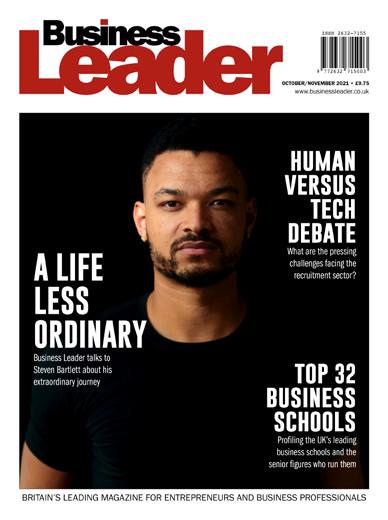
“The overriding theme is when people say it can’t be done, you’re like, why can’t it be done?”, says Watkyn. “We’ve got to find a workaround here and I’m a right bloody pain. For example, with the print room downstairs, where we’ve got a bottleneck, I’m saying we need to set another printing machine up to get the work out, but the print room say there’s no space for it. Well, we need to find somewhere to put it.
“I drive everyone mad, but that’s the only way you’re going to get through problems. There’s no point saying, ‘Oh, we’ve got a problem, or let’s just give in’. So, it’s sheer tenacity.
“I’m not bright, at school they thought I had learning difficulties and ADHD. So, tell me why it won’t work and then we can come up with creative solutions to overcome those barriers.”
BIG PLANS FOR THE FUTURE
The Tiny Box Company is aiming for £30m turnover in three years and has already started a dropship model to help them meet this target. But that’s not all the future holds for this fastgrowing firm.
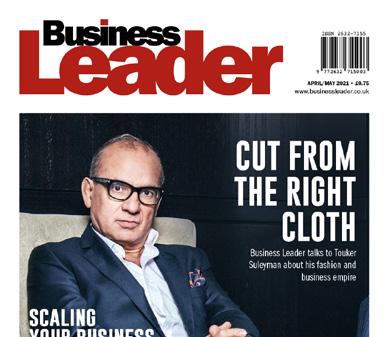
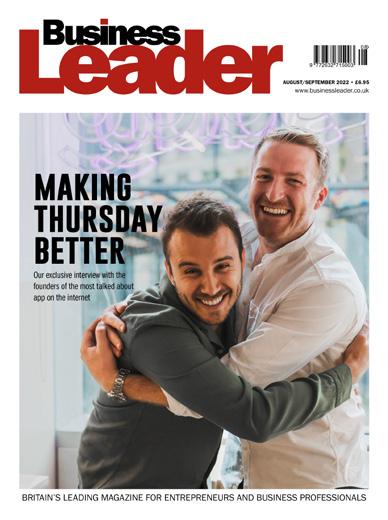
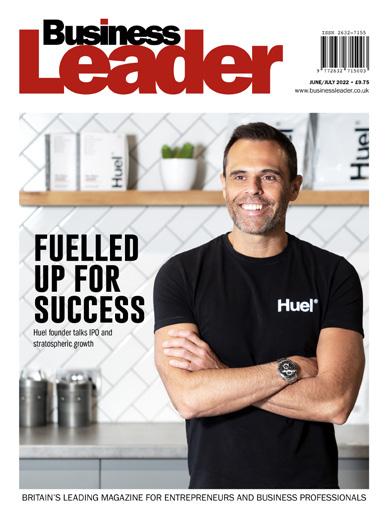
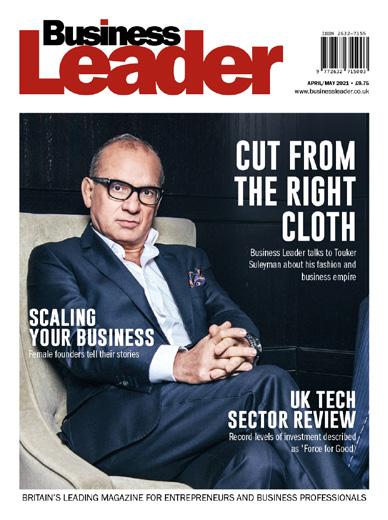
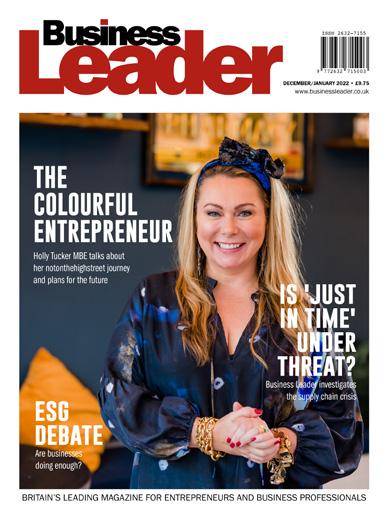
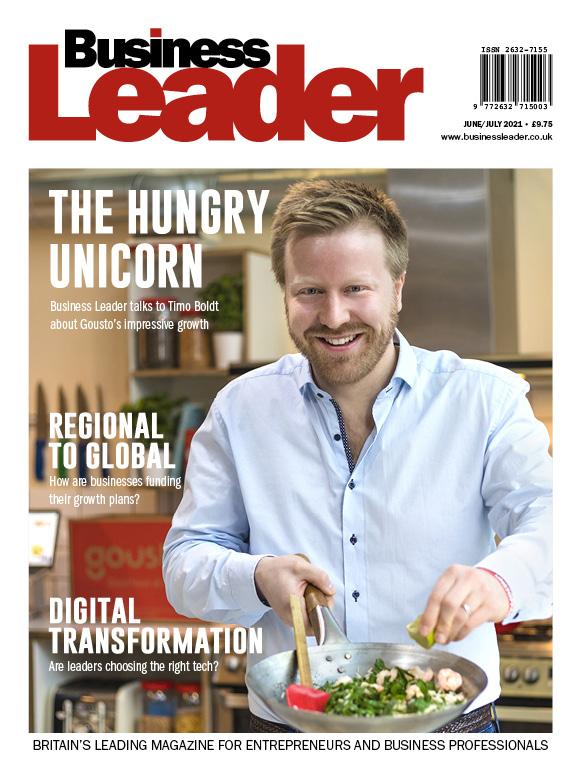
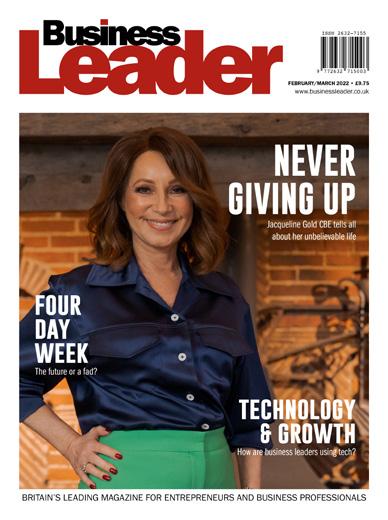

Watkyn continues: “We’re really focusing on corporate customers where we can add value as a consultancy, solution selling as opposed to just packaging. We also want to ramp up manufacturing. We’ve already got a factory in Cornwall, but there’s a lot more that we can be doing, for example, semi-manufacturing.”
Despite their ambitious growth plans, Watkyn has no plans to sell the business. She continues: “We’ll keep growing and see what happens. Maybe we’ll do a bit more acquisition
because all we’ve done is bought the factory in Cornwall, so the logic would be to acquire other companies where there’d be vertical and horizontal diversification, which minimizes risk.”

December/January 2023 28 FAST TRACK TINY BOX COMPANY
WIN A FREE 1-YEAR SUBSCRIPTION TO BUSINESS LEADER* BUSINESSLEADER.CO.UK/WIN * terms & conditions apply ENTER NOW
It’s a jelly roller set. It’s a hairdo... hairdough.

Some things leave you guessing. But not Mailchimp.
We take the guesswork out of marketing to help you grow your business. Our tools analyse millions of data points from the billions of emails we send to give you personalised suggestions on how to improve your engagement and revenue.
Guess less and sell more with the #1 email marketing and automation brand.*
Quiet quitting is a workplace trend that has become increasingly prominent in recent months. Often associated with younger generations, we investigate whether it’s a symptom of a more vocal youth or part of a wider trend.
WHAT IS QUIET QUITTING?
Quiet quitting is a term used to describe when an employee opts out of doing tasks that are beyond their assigned duties. So, whilst they continue to complete their primary responsibilities, they are less willing to stay late, arrive early or engage in other nonmandatory activities, such as answering emails outside of work hours. Essentially, quiet quitters do exactly what their job requires of them and nothing more.
Global analytics and advice firm Gallup found that quiet quitters make up at least 50% of the workforce in the US. This is based on Gallup’s definition of being “not engaged” at work.
Bearing the previous point in mind, Gallup’s ‘State of the global workforce’ report also found that just 9% of UK workers felt enthused by their work and workplace in 2022, suggesting that quiet quitting could be even more prominent in the UK.
However, a recent poll of 1,000 workers and 500 decision-makers across the UK and Ireland by Ricoh Europe found that 78% of workers described themselves as feeling ‘engaged’ at work and 67% said they are enthusiastic about what they do. So, it might not be as widespread as first thought.
But what is the reason behind its rise in recent months?
Gautam Sahgal, CEO of Perkbox explains: “Quiet quitting isn’t a new phenomenon. Rather, it has been accelerated by socioeconomic and political factors including the post-pandemic cost of living crisis, and an increased awareness around mental health and purposeful work. This has led employees to question their relationship with employers and what they want from their career.”
CAUSE FOR CONCERN?
In organisations where quiet quitting is present, this can translate to a loss in productivity if you’re used to staff members going above and beyond. This can be particularly problematic if you get a competitive edge from staff going the extra mile. Therefore, there is a need for employers to think carefully about the quiet quitting phenomenon. Although, there is doubt over just how widespread the issue is.
Quiet quitting has largely been associated with Millennials and Gen Z. This might be a bit of a generalisation, but these generations make up a large percentage of the UK’s workforce and will eventually comprise most of it in years to come. So, it would be unwise for employers to disregard their expectations of work, even if their own expectations do not align with them.
The same can be said for all employees, regardless of how old they are. This is especially true considering Philippa White, the founder and CEO of The International Exchange, believes quiet quitting is not just limited to younger generations.
She says: “I think the post-pandemic reboot or re-evaluation has left a lot of people with things to reflect on. The time at home, flexible working, and time with family woke people up from the monotony of the day-to-day grind. They had space and time to think about what is important to them. And what they are happy, and not happy, to put up with.
“I would say that the dehumanisation of work, and the workplace, is probably a major factor creating unhappy and disengaged employees. The relentless commute to work, feeling like a cog in a machine, the daily stress, anxiety, and not feeling valued, or able to reach your full potential. Essentially, leadership seeing employees as consumers of jobs, rather than citizens of companies. Being more interested in the clients of the company, rather than first and foremost being worried about their employees’ well-being. And I’m not sure this is restricted to age.”
However, Dominic Wade, co-founder of Wade Macdonald, associates the trend more with those in the younger generations.
December/January 2023 30 FEATURE
WORKPLACE
He comments: “I believe Millennials and Gen Zs particularly have resorted to turning down the dial and ‘acting their wage’ and rejecting the notion of ‘going above and beyond’.
“Why is this? I think it could be for a number of reasons, but not least a delayed response to the burnout caused by the pandemic, as well as concerns over inflation and their salaries failing to keep up with the rising cost of living.
“But for whatever reason, behaving like this at the start or in the earlier years of your career could definitely be damaging. This is a critical time when talented workers should be grasping as much opportunity and gaining as much kudos as possible to set up a long and fruitful career. If you have this sort of attitude and work ethic this early on, it’ll be hard to bounce back from it.”
ARE YOUNGER PEOPLE THE PROBLEM?
Although it wouldn’t be fair to limit the quiet quitting phenomenon to younger generations, it’s important to consider how much their expectations of work differ from the UK workforce’s older participants.
LiveCareer’s study, Different Generations in the Workplace 2022, found that all the generations expected flexibility in working options, with 76% of Millennials, 69% of Gen Z and 64% of Gen X expressing this expectation. Additionally, when asked which benefits were most important, 38% of Millennials, 33% of Gen X and 32% of Gen Z identified flexible working benefits as most important. Finally, 64% of Gen X, 59% of Baby Boomers, 58% of
Millennials and 53% of Gen Zs all rated job prestige as their highest priority in their work. Job security was the second most important aspect of work for Baby Boomers (46%) and Gen Z (44%).
Furthermore, Oyster’s Employee Expectations Report 2022 found that “flexible working options” was the second-most important priority for all age groups, and “the ability to work from anywhere” was third. Regular pay rises were most highly valued by all generations. This was true for 91.4% of Gen X respondents, 90.5% of Millennials and 87.2% of Gen Z.
However, Oyster’s study found that Gen Z rated career development as the most important attribute of work, whereas the LiveCareer survey found growth was the second-most important element, with it being the priority for 46% of Millennials and 42% of Gen X. Sahgal also says younger generations have clear expectations of what they want from their employer and businesses cannot afford to underestimate these if they want to remain attractive to this growing section of the employment market.
He continues: “For example, our recent research found that Gen Z employees are seeking greater well-being support from their employer; 75% want financial well-being support, while 70% and 56% want their organisation to help take care of their mental and physical health, respectively.”
Whilst there appears to be some differentiation when it comes to what different generations want from work, the disparities are not as striking as many people might think. As such, the increasing prominence of quiet quitting in recent months might not necessarily be a reflection of changing workplace attitudes amongst younger generations. So, why is the trend more associated with them?
Sahgal suggests that younger generations are more vocal when it comes to expressing their discontent, but they are not the only ones.
He comments: “While quiet quitting is being openly articulated by younger generations, it is not a phenomenon exclusive to them. Much like the Great Resignation, such workplace trends are reflective of wider frustrations.
“As the talent market is so competitive, employees young and old are more empowered than ever to raise issues they see as detrimental to their careers, and if nothing is done, will take matters into their own hands. The problem could be rooted in any number of things, including feeling undervalued or unappreciated at work, lack of communication around company mission and direction, or feeling isolated from key decisions. The most impactful thing a company can do to address this is to investigate why such behaviours are taking place. Only then can the right resolution be found.”
Whilst younger generations might be more likely to vocalise their disharmony in a work environment, quiet quitting is far from a youth phenomenon. An abundance of quiet quitters in an organisation can be highly problematic too, so taking steps to ensure staff are getting what they need, regardless of age, can help prevent companies from falling victim to this not-so-new trend.
Business Leader - Inspire • Inform • Connect 31 HR
38% 76% VIEWED FLEXIBLE WORKING AS THE MOST IMPORTANT BENEFIT EXPECT FLEXIBLE WORKING OPTIONS GEN X AT44% GEN Z OF 64% BOOMERS OF BABY 1ST 59% JOB PRESTIGE CHOOSE PREFER FLEXIBILITY IN THE WORKPLACE OF MILLENNIALS JOB SECURITY WAS THE 2ND MOST IMPORTANT ASPECT OF WORK FOR EXPECTATIONS
THE
IN
HOW
BUSINESSES
The Bank of England has warned the UK is at risk of plummeting into the longest recession since records began, as it lifted interest rates to 3%. The costof-living crisis, the war in Ukraine and soaring energy prices have compounded in a post-pandemic UK, and businesses must contend with the fall out. In challenging times, survival is paramount, but is it possible to grow in the face of adversity? Gallagher’s South West business leaders Andy Ferguson, Mark Holmes and Cheryl Phillips join forces to discuss the risk and rewards associated with growth in the current climate.
WHAT DOES GROWTH MEAN TO YOU IN 2022?
Mark: “As a business we can achieve growth through retaining and winning new clients. But our costs are set to increase so much that our margins will inevitably still be squeezed. It’s the difference between growth in profit not revenue that’s important as revenue needs to grow just to stay as we are.”
Andy: “Revenue growth can’t be considered in isolation; managing costs and increasing margins is where businesses are feeling the bite. If there is an expectation that costs will be the same as they were in 2020 and 2021,
then that is difficult to achieve when pay expectations alone are so high before even considering other costs such as energy and running an office.”
Cheryl: “We understand where the squeeze is coming from – employees are genuinely concerned about the significant rise in the cost of living, and the pressures that come with that for us in retaining quality talent.”
Cheryl: “For many businesses, the pandemic has made them so much more robust. Because they've been agile and they've responded quickly. They changed their model. Putting them in a strong position to ride the current financial uncertainty.”
WHAT IS THE ROLE OF A BUSINESS LEADER IN ACHIEVING GROWTH?

Mark: “For me, the key is ensuring you've got the right people in place to work through these challenges. I am really proud of Gallagher’s graduate scheme and I know there are many great schemes out there. It feels like the right time for further expansion in this area as we also look to attract college and school leavers. Businesses may not always be able to afford the cost of experienced people but what they can do is get the right younger people in and train them internally.”
Mark: “My question is, what growth rate do you have to achieve just to stand still? Our clients have got to make tough choices on where they channel their spend. Businesses need insurance to continue to trade. But will they buy as much protection, or will they cut back? Are we going to see more businesses exposed as a consequence?”
Cheryl: “You just touched on one part of it, which is fundamental for any businesses – succession. Having a clear vision and a one, three and five-year plan is crucial. By doing this, we show our people longevity and instill confidence. Our positioning and messaging must explain what we're trying to do from a profitability perspective and how that actually benefits colleagues. We're an acquiring business. So for any
December/January 2023 32 FEATURE
business
EXAMINING THE GROWTH MINDSET IN TODAY’S CHALLENGING ENVIRONMENT
MUCH DO
NEED TO GROW TO STAND STILL?
GROWTH CAN’T BE CONSIDERED IN ISOLATION; MANAGING COSTS AND INCREASING MARGINS IS WHERE BUSINESSES ARE FEELING THE BITE.”
“REVENUE
Andy Ferguson
considering this, future stability for people has got to be a key element.”
Andy: “Everyone is furiously competing to retain staff, and that is a challenge that isn’t going to go away. We've all been saying this for a long time. The challenge for many businesses is that they cannot reduce marginal growth rate. So you have to incorporate that cost into your business at the same time.”
HOW FOCUSED ARE YOUR CLIENTS ON GROWTH?
Mark: “Clients have been adapting. People are investing, and we have seen some sector-specific diversification postCOVID-19, with varying levels of expansion in different services.”
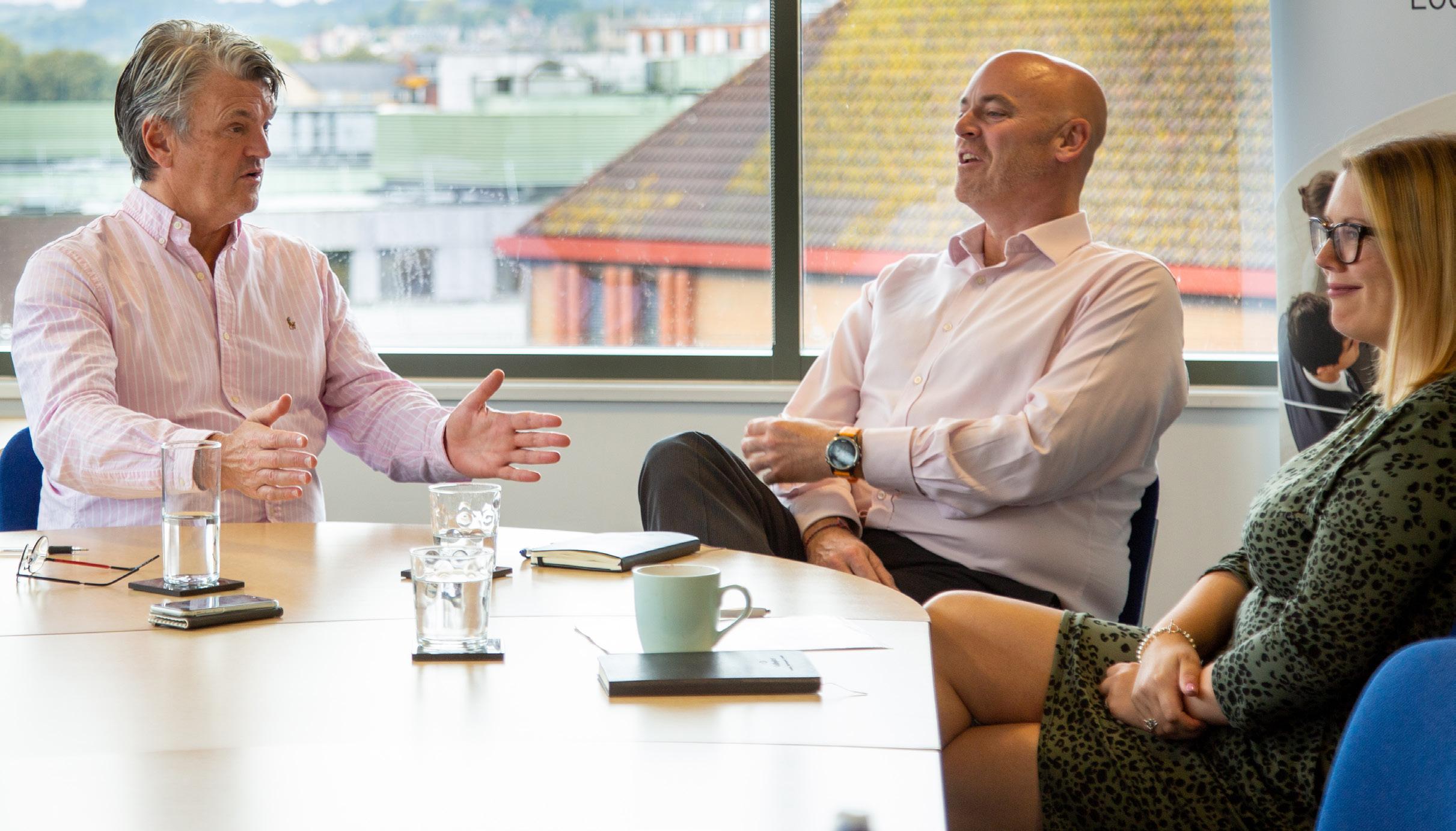
Cheryl: “Overall the majority of clients I've been involved with have got a good sense of purpose and a solid operating model.
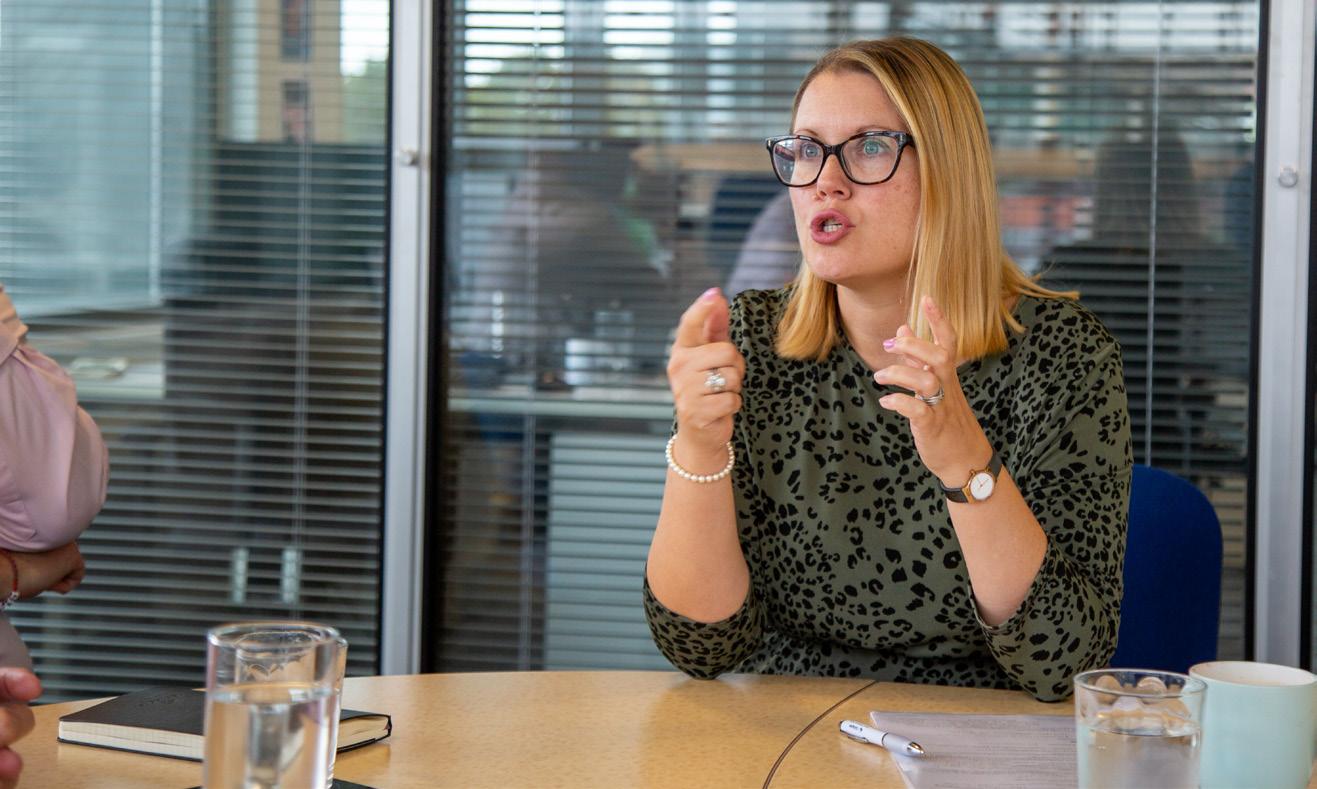
“So then, at times like this, they've got the capacity to understand how they will be impacted.”
Mark: “This depends on where their revenue came from to start with. It's quite important to see how much are they reinvesting as well. It’s only natural that business leaders will become more cautious in the current climate.”
Cheryl: “There are some fabulous stories of business growth here in the South West. I think the brakes might go on because everyone is understandably worried about what's coming down the line. Sometimes you don't want to shout about your success, but the irony is that now is the time we should be inspiring one another by sharing these aspirational stories.”
Andy: “I’m certainly seeing clients diversifying for growth opportunities. One of my clients acquired land for development and it sat there for two years due to planning issues. He's now changed tack and is now looking at the land as a storage opportunity. He’s put shipping containers on the land and estimates he can match his investment with one month’s income.”
Mark: “The client is clearly thinking entrepreneurially. It comes back to Cheryl’s point on knowing what you want and having
a good sense of purpose, but you also have to be prepared to adapt and respond to the current climate.”
HOW IMPORTANT IS CONFIDENCE TO BUSINESS GROWTH?

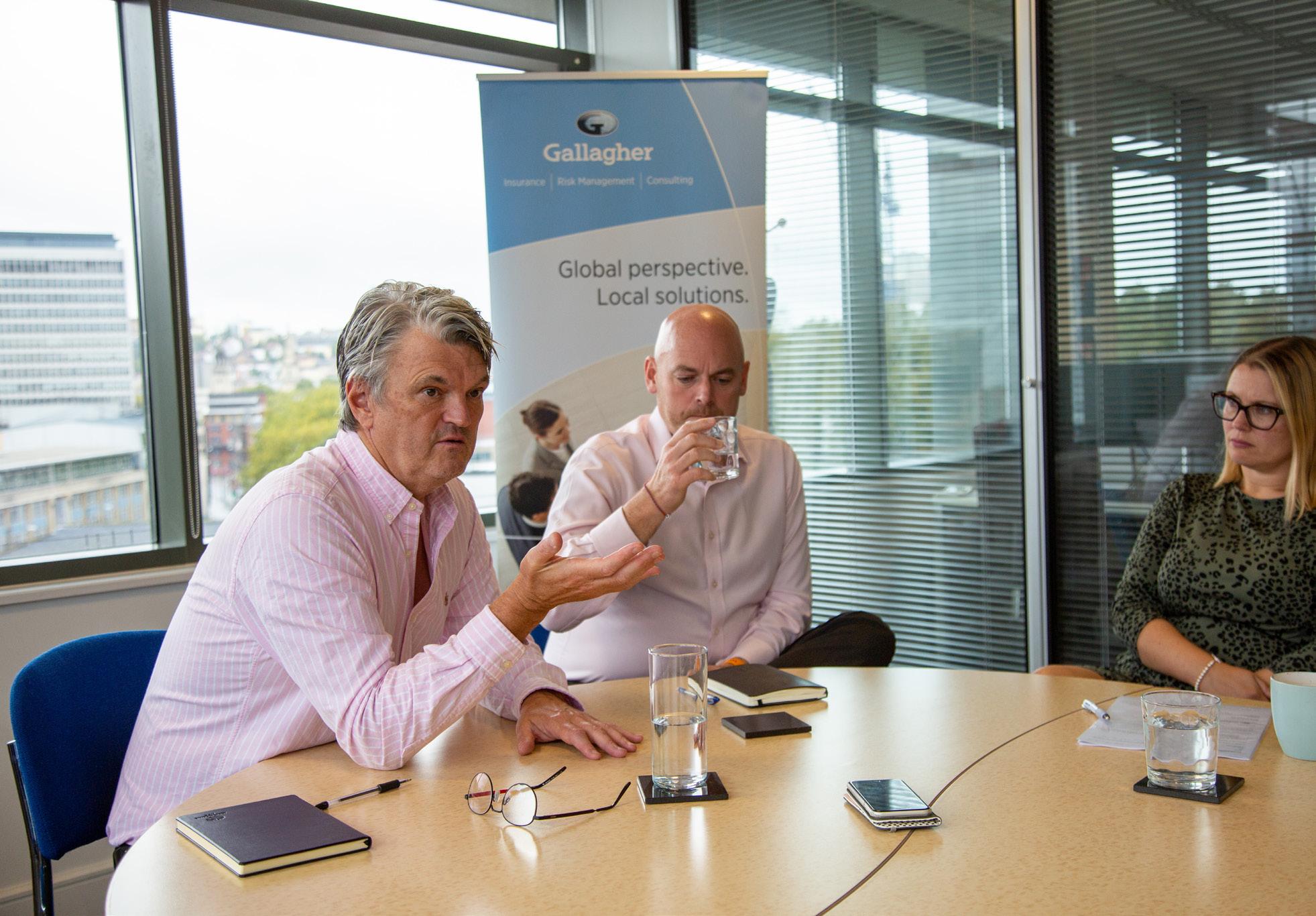
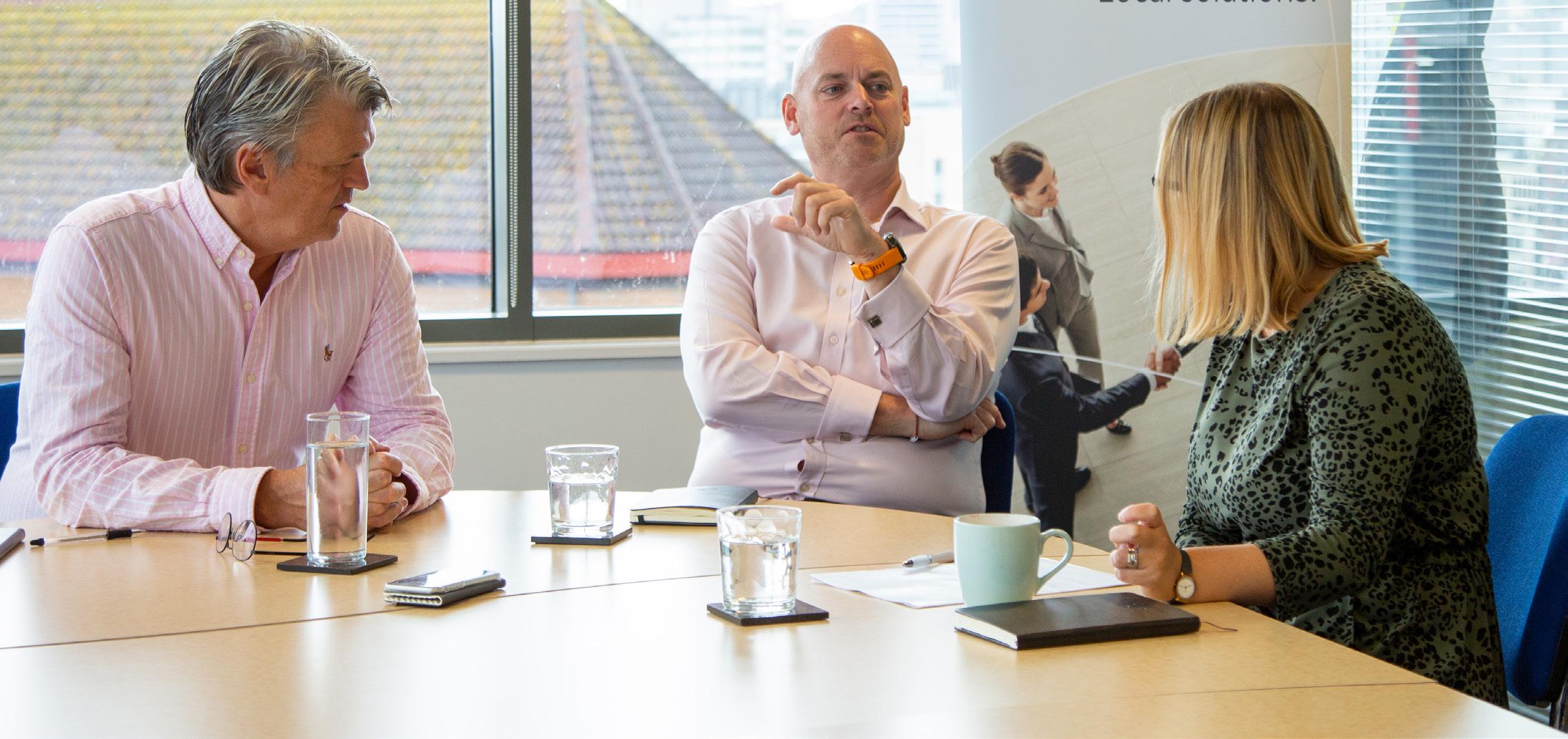
Cheryl: “It's fundamental. Confidence is essential because, with everything that's going on, there's so much negativity. Taken in isolation it could make it challenging for us to maintain the positive outlook we need to have as leaders in our businesses. But what does reality feel like in your world?
“Confidence is being able to bring your direction of travel back to where you want to be. We've got to plan for this. We can't be reckless, but we can keep moving forward.”
“Growth has a complex infrastructure. A business can grow in one context, be it revenue or headcount, but still be operating at a loss due to costs and margin increases. In these unprecedented times, agile businesses that can adapt and diversify quickly tend to be the first to recognise existing opportunities.
“Organisations have already shown astounding resilience throughout the pandemic and those lessons learnt are now helping many continue to grow against all odds.”
Business Leader - Inspire • Inform • Connect 33 LEADERSHIP
“FOR MANY BUSINESSES, THE PANDEMIC HAS MADE THEM SO MUCH MORE ROBUST. BECAUSE THEY’VE BEEN AGILE AND THEY’VE RESPONDED QUICKLY.”
Cheryl Phillips
HOW CAN A NON-EXECUTIVE DIRECTOR HELP YOUR BUSINESS?
The pandemic has had a tremendous and varied impact on the working world, with some job roles becoming less important and some defining themselves as crucial to a company’s growth. No other role than the Non-Executive Director has seen itself grow in prominence and become ever more en vogue since the lockdown ended. But what is a NED? How do they differ from an Executive Director, and do you need one in your company? Business Leader investigates…
A Non-Executive Director is a board member that isn’t a company employee. They don’t have an executive function in the organisation or engage in its dayto-day management, but they act as an independent advisor and are involved in
influencing the overall direction of the business through policymaking and planning. Non-Execs have the responsibility of acting in the interest of stakeholders and monitoring those in the executive team, but most notably, they ensure the company is aligned to meet its overarching objectives. Essentially, a NED acts as a guardian of corporate governance.
Considering this, NEDs come in a variety of forms and business owners can choose a NED based on their skill set and what the company requires. Paul Munden from the Institute of Directors explains: “NonExecutive Directors come in all sorts of hues, and they do quite a lot of different things in different companies.
“A Non-Executive Director of an FTSE100 company is likely to be all about overseeing the executive team, ensuring good governance and good internal controls. Whereas an investee director of a small company, who’s also a nonexecutive, might get involved with the management of the company a lot more.”
HOW ARE THEY DIFFERENT FROM AN EXECUTIVE DIRECTOR?
Even though a NonExec role might seem similar to an Executive Director role, the two are very different. An Executive Director is integral to the dayto-day running of the business, strategic planning,

budgeting and boosting growth. While a Non-Executive is there to give advice and challenge the executive team. Because the NED isn’t an employee, they provide an independent viewpoint, which ultimately helps the business come to alternative and fresh solutions whilst guiding them in their growth journey.
WHAT VALUE DOES A NED BRING TO A COMPANY?
A business owner might choose to bring a NED into the company for a variety of reasons. A Non-Exec brings a level of impartiality to decision-making. This can be important in disintegrating the emotional drive and bias that naturally exists in decision-making within an executive team.
“It’s basically like having a coach alongside you,” says John Farrugia, CEO at finnCap Group. He continues: “An entrepreneur typically has a great idea and then they grow a business. A NED has a wealth of experience in either growing their own business and selling it, or having been sat on multiple boards, so this puts them in a good position to guide you as an entrepreneur.
“They can help you navigate your journey and sometimes help to tell you what will happen if you continue down a certain path. They can help you avoid perils and bring in the right MD, sales team, or operations team.”
FEATURE
NEDs essentially provide checks and balances, holding ideas to account and challenging directors – this can lead to more thoughtful outcomes and company growth.
Fiona Hudson-Kelly, entrepreneur, investor, and NED at What’s Yours is Mine, comments: “The key responsibility of a NED is to provide a balanced view to the board of directors through the lens of impartial external expertise. To bring good governance and ensure fiduciary duties are followed by the board directors, to assist the board with oversight of management performance and direction, to establish a high-performing and transparent culture within the board of directors and challenge and support executive directors.”
Being able to challenge and scrutinise directors in terms of their vision, direction and decisions define the NED role. A NonExec may look at the current landscape in which your business is operating in, look at what is important to your consumers or clients, and steer your business in a helpful direction, but they can also open you up to their own network.
Michelle Tempest, investor, advisor and NED for Cognitant Group Limited, says: “NEDs bring vital experience and their expansive network of people to a company, plus they provide scrutiny of your executives – which can be helpful words of wisdom. From my experience, NEDs offer long-term visions and focus on sustainability, alongside knowledge of commercials and a strong position on strategy. In this sense, the role of a NED is to ensure a standard of conduct – which may be ensuring healthy company culture or sustainability practices.
“They can also be an essential step in the growth of a company. A keen desire for calculated growth is the main reason a business owner is likely to bring on a NED. In addition to this, because NEDs are impartial actors, they provide an important bridge between the company and its external shareholders. In a private or private-equity-backed business, a NED can work in the interest of shareholders by providing them with confidence that their investment is being used appropriately, offering expertise to what might be an enthusiastic but commercially ignorant executive team.”
Hudson-Kelly comments: “NEDs offer a balance to the views of external shareholding directors and can often bring harmony over contentious issues that existing shareholding directors can become entrenched with.”

WHERE CAN I FIND A NED?
Because NEDs have an important role in influencing decision-making, it is crucial their values align with your business and that they get along with your executive team, especially as the main aspect of their role is to challenge executive directors. Hudson-Kelly comments: “My personal horror story was when we appointed a NED whose culture didn’t fit with ours. You need to do your due diligence with NEDs as you would with any other person involved in your management team. They need relevant skills and expertise, but you must also have someone who fits your values and culture.”
Farrugia points out the necessity to choose a Non-Exec with the correct experience dependent on what your business needs. He says: “It’s about finding the right person, not just getting any NED. Find out where you need their help and then go into the market. It’s not too difficult to ask around or even ask a business like ours. NEDs tend to help you avoid mistakes and grow a little bit faster.
LEADERSHIP
Cont.
“But there’s no issue in moving the NED along as you grow the business and getting someone else in with a different level of experience to help you navigate new issues.”
Finding the right NED for your company can seem like an arduous task, so leveraging your LinkedIn or wider personal and professional network is key in securing the right person. David McQueen, speaker, entrepreneur and NED for Forbes Family Group and Our Game Football, agrees that it’s important to first understand what your business needs before seeking a NED. He says: “Whether or not you need a NED depends on if you have a skills gap in your business they can fill. A NED brings accountability and its own unique skill set to an organisation. The easiest way to find a good NED for your company is to use your network and ask around as much as possible.”
Alternatively, Tempest highlights that selecting someone you already know and thinking of them as a long-term addition could be a smart move. She says: “Choosing a NED is very individual for each company. My suggestion to founders is to choose a NED who is someone you know
and trust and is someone whom you want to be part of your business for the longterm. You can ask people directly, seek people through word of mouth, advertise online or use headhunters.”
In contrast to looking in your own network, you can use agencies or organisations that represent NEDs to find the right fit for you – these NEDs tend to be chartered directors and may have formal training. Hudson-Kelly comments: “I trained to be a director. In this training, the framework of learning covered everything you need to know about strategy, leadership, finance and governance with intensive examinations in all subjects.
“Following the successful achievement of these examinations, there is a further advanced examination that is based on a current case study. I have an MBA and this was the most challenging examination I have achieved thus far.
“To become a chartered director, you must provide a portfolio of your experience and successfully be interviewed by a panel of examiners.” In this sense, NEDs come from a variety of backgrounds, with varying experiences and skill sets.

HOW MUCH WILL A NED COST?
According to research, the average retainer for a NED in the UK in 2019 was £69,238. Whereas NEDs on the boards of FTSE100 companies got paid an average of £70,000 in 2020. Despite this, the average NED pay for AIM-listed companies is £36,000 and it’s £44,000 for small market capitalisation companies.
However, because many NEDs operate on a part-time basis, and their role is unique to each company, a NED might not always have a fixed salary, and can sometimes have shares in the company as a form of remuneration.
Michelle Tempest highlights the varied nature of a NED’s salary. She comments: “NEDs usually have a mix of salary plus options and/or shares. Amounts vary and, in some start-ups, some take on the role without an income, others expect £12-24k pa.”
David McQueen points out the usual parttime nature of the NED role, and that NonExecs can be paid on a case-by-case basis. He says: “In terms of cost, a NED might start from £2,500 for four meetings, but it really depends on what you are looking for to benefit your business.”
Ultimately, as a business owner, you can decide how often you will need your NED and choose how you pay them based on that. NEDs will usually have their own expectations based on their experience and expertise, so it’s worth negotiating this once they have been selected.
NEDs are business custodians that can guide you through the trials and tribulations of scaling your firm. It’s crucial to remember to first identify what your business is missing and then choose a NED with the right skill set to fill your knowledge gap, this could be the secret to helping your company scale at pace.
December/January 2023 36 FEATURE LEADERSHIP
“IT’S ABOUT FINDING THE RIGHT PERSON, NOT JUST GETTING ANY NED. FIND OUT WHERE YOU NEED THEIR HELP AND THEN GO INTO THE MARKET. IT’S NOT TOO DIFFICULT TO ASK AROUND OR EVEN ASK A BUSINESS LIKE OURS.”
John Farrugia
TOP 32 non-exec directors
The people responsible for providing independent oversight and constructive challenges to company executives, NonExecutive Directors (NEDs) can be a highly useful resource in boardrooms. For our most recent Top 32 list, we profiled the very best NEDs right now.

HOW HAVE THE TOP 32 BEEN CHOSEN?
We asked our readership to suggest NEDs that deserve to have their achievements celebrated and provide evidence of those achievements across their career.
However, if you feel there are others that deserve to be included on this list, please email editor@businessleader.co.uk and they will be included in the digital version on businessleader.co.uk This list is in no particular order.
Business Leader - Inspire • Inform • Connect 37
paul goodman
NATIONAL ASSOCIATION OF COMMERCIAL FINANCE BROKERS (NACFB)
Having worked in accountancy practice and in-house industry roles for more than 32 years, Paul Goodman’s invaluable knowledge working with SMEs has helped strategically drive NACFB forward, with the clear objective to stand as the professional association of choice for all commercial finance brokers and lenders. Now in his eighth year as Chair, he is responsible for delivering the strategic direction that the current board have committed to, drawing on his 11 years of knowledge as a Non-Executive Director on the board. Paul aims to grow and support the significant £41bn of commercial finance facilitated through the NACFB members last year.
gary ashworth
INTERQUEST GROUP
In a career spanning more than four decades, serial entrepreneur Gary Ashworth has founded or backed over 30 businesses across sectors including recruitment, healthcare and property. With extensive experience across executive and nonexecutive roles, Gary is the current Chairman of three specialist recruitment businesses: InterQuest Group, Albany Beck and Positive Healthcare.
Ashworth is also a media commentator, specialist business coach and mentor, and even has his own book, ‘Eat the Pudding First’, which is a how-to business manual packed with invaluable tips on how to start or scale up your own successful business.
samantha payne mbe
SOUTH WEST CREATIVE TECHNOLOGY NETWORK
The co-founder and COO of Open Bionics, an awardwinning healthcare company delivering revolutionary low-cost bionic hands, Samantha Payne MBE has been named one of the top 25 women in robotics you need to know about by Robohub and Marie Claire’s Top Women In Tech.

In addition to being awarded an MBE, she has appeared as a guest speaker and panellist at the UKTI Brazil Wearables Conference 2015 in addition to several other high-profile tech events. Samantha is also Chairwoman at the WECA Creative Scale-up Fund, and a Board Member at both the South West Creative Technology Network and the Bristol and Bath Creative Cluster.
adriènne kelbie cbe

THE SEVENTY NINTH GROUP
Adriènne Kelbie is an independent non-executive, coach and consultant. She has been a showjumper, PA, Trainer, Operations Manager, Chief Executive and Non-Executive Director in varied sectors across voluntary organisations, public bodies, and private companies. During her career, she led the modernisation of the criminal record system while leading the Disclosure & Barring Service and most recently transformed the Office for Nuclear Regulation into a multiple-award winning organisation.
Holding five professional fellowships in Energy, Nuclear, Management, Leadership and Personnel Development, she is qualified in a range of psychometrics and received a CBE honour to recognise her impact on the nuclear sector and more broadly, inclusion.
December/January 2023 38 TOP 32
faaiza ramji
SHEFFIELD CHAMBER OF COMMERCE
Canadian entrepreneur Faaiza Ramji is a Non-Executive Director at the Sheffield Chamber of Commerce. She lives in Edmonton, Canada, and her company, Field Notes, is the first in North America to make herbal liqueurs using distilled field peas. Its innovative products are found on shelves across Canada.

Championing the idea that cities across the world should link up to find new ways of solving problems, Faaiza met members from the Sheffield Chamber of Commerce by chance at MIPIM, a real estate investment conference in Cannes and after several meetings, was invited to apply for the NED position in March 2021.
david mcqueen
FORBES FAMILY GROUP
David McQueen is the co-founder of the professional coaching company Q Squared and Black Founders Hub, a network for black-owned high-growth businesses. He is also a Non-Exec Director for Forbes Family Group and Our Game Football, a public speaker, coach to executive-level leaders and the host of The Brave Leader Podcast.
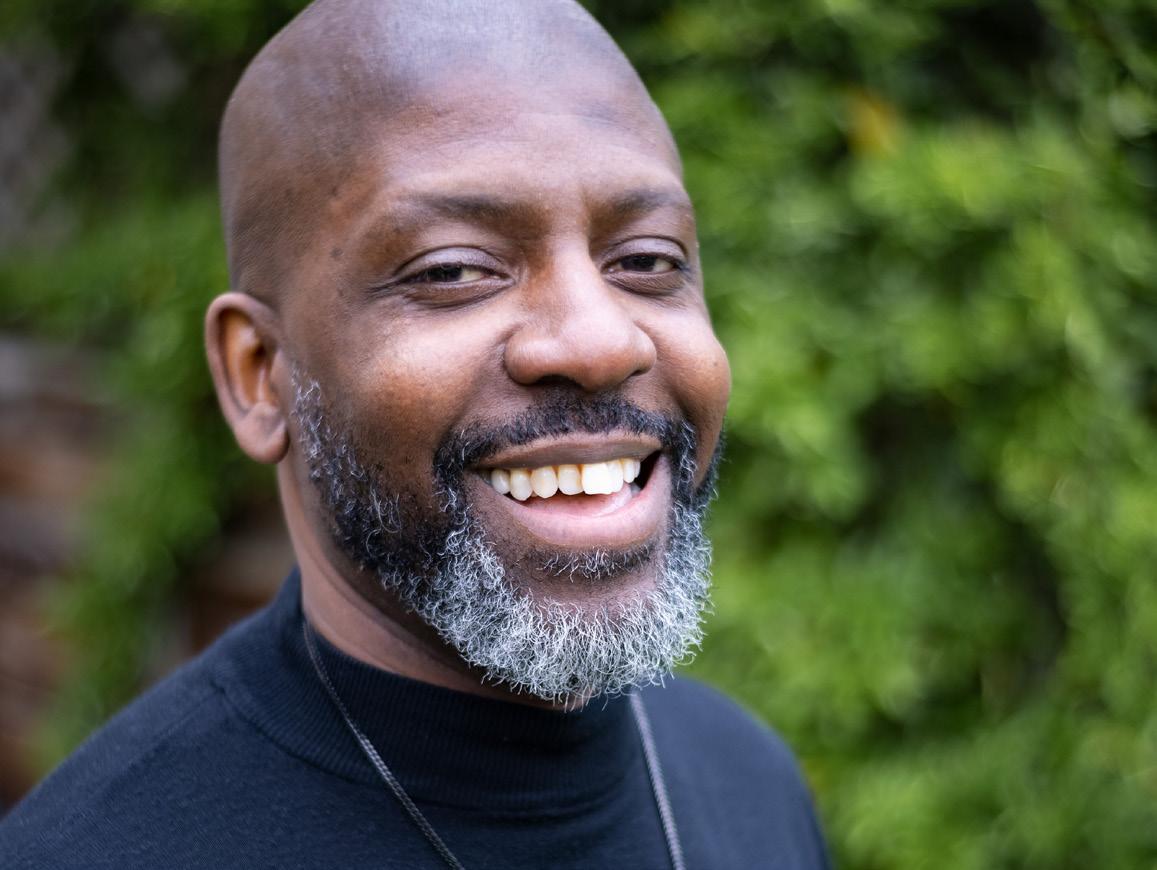
After starting his career in accounts, David moved into IT and then worked as a project manager before realising he could make a career as a speaker and facilitator. As an international speaker, David has spoken on nearly every continent, while he has worked as an executive coach for high-profile clients including Investec, RBS and Fidelity Investments.
ann hiatt
ARMADILLO CRM
As well as being an author, podcaster, business owner and leadership strategist, Ann Hiatt is the Non-Executive Director of Armadillo, an independent CRM agency that combines data, insight, and strategy with talent, personality, and craft to deliver fantastic results for global brands.
Ex-Silicon Valley and with 15 years’ experience as the Executive Business Partner for Amazon founder Jeff Bezos and Eric Schmidt, the CEO/Executive Chairman of Google, Ann is committed to helping high-performing CEOs obtain their ultimate dreams through strategic decision making and chooses to only take five consulting clients at a time to ensure her ability for deep impact and availability.

Business Leader - Inspire • Inform • Connect 39 NON-EXEC DIRECTORS
kate bright
SECURITY INDUSTRY AUTHORITY
Before setting up the award-winning security-focused recruitment and concierge firm UMBRA International Group, Kate Bright worked as a Personal & Executive Assistant and Chief of Staff to a wide range of international wealthy and high-profile families in private and family offices for 15 years.
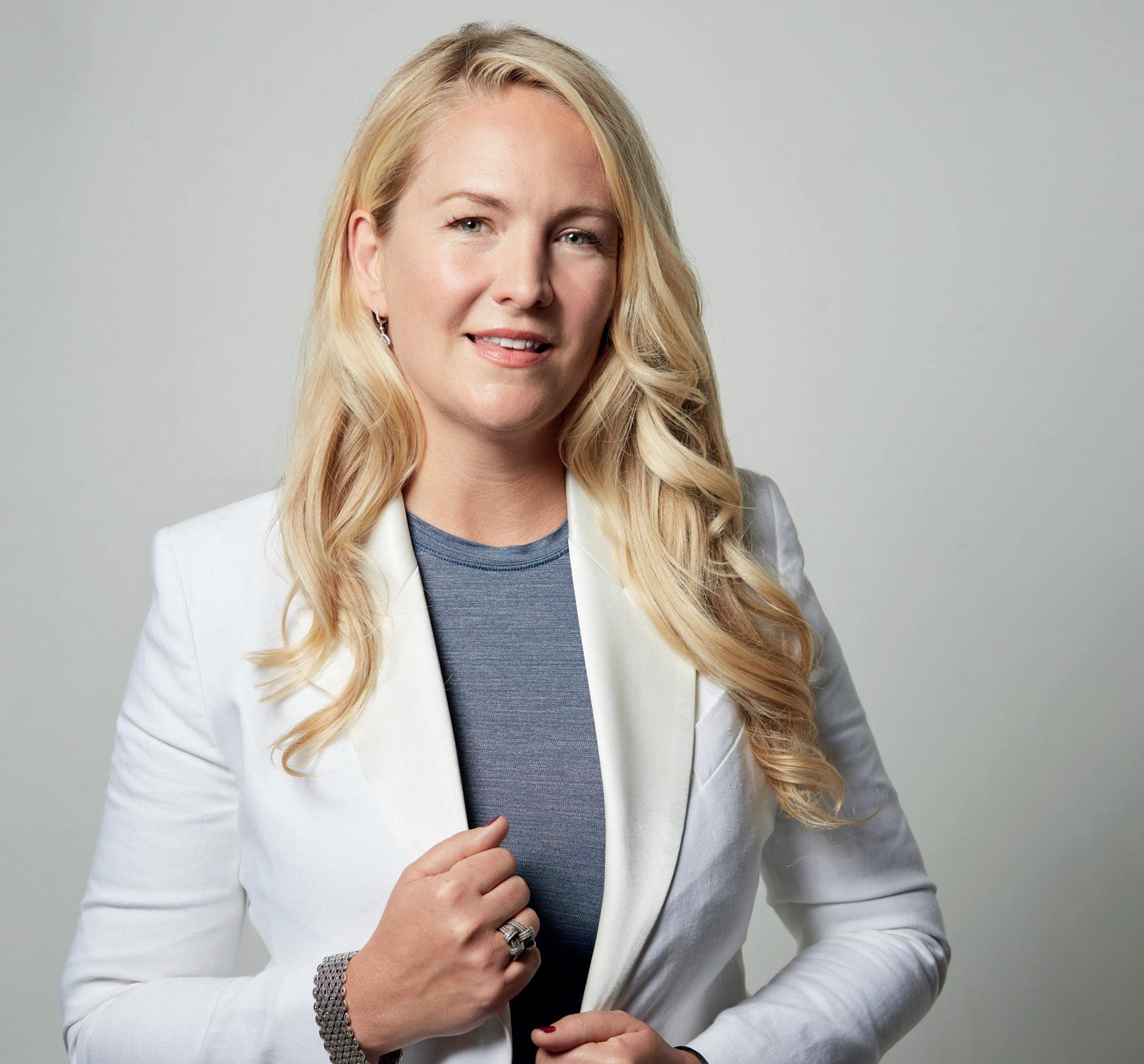
In 2020, Kate became a Freeman of the City of London and NonExecutive Member of The Security Industry Authority, whilst she also sits on the British Army Gender Advisory Council and works as a Non-Executive Director of Amatte, a coffee business that empowers African Female Farmers.
mike gahir
RE:ADVISORY LIMITED
As the owner of Re:Advisory Limited, experienced debt structuring professional Mike Gahir offers expert advisory and non-executive services on a self-employed basis. Previously serving as Chair of the Board of Trustees at Walsall-based Steps to Work, he is also the Managing Director at Lakes Showering Spaces, a manufacturer and supplier of shower enclosures, doors and bath screens.
Mike’s executive and non-executive experience includes cashflow lending, MBOs, acquisitions, recapitalisations, debt advisory, working capital, trade finance, ABL, and secured lending.
December/January 2023 40 TOP 32
richard thornton
WALR
Richard Thornton is NED of res-tech company Walr, as well as a number of other portfolio companies. A consultative and operational executive leader with a passion for helping clients grow and optimise their businesses through smarter technology adoption and automation, Richard is focused on driving growth through value-selling and a strategic partnership approach to build scalable long-standing relationships.
He has a proven track record of hiring and nurturing the best industry talent to collectively create successful transformative businesses. He was also part of the management team at Cint that led the business to a successful IPO in February 2021, helping to scale the company from €2m to €100m in revenue and a 10x ‘unicorn’ valuation.

shalini khemka cbe
MARKET FINANCE
Shalini is the Founder and Chief Executive Officer of E2E, a company she founded in 2011 to help founders scale and avoid many of the challenges she had faced during the establishment of her first business. Shalini has grown E2E to an organisation that supports 23,000 founders who contribute £213bn to the UK economy and employ 1.15 million people.
A former NED at UK Export Finance, Shalini is a Member of the Mayor of London’s Business Advisory Board, is on the Supervisory Committee of Market Finance, and was appointed a CBE in the New Year’s Honours List 2022 for her services to UK entrepreneurship and the UK economy.
sir philip hampton
THE HAMPTON-ALEXANDER REVIEW
Sir Philip Hampton has had a long and prestigious career operating in non-executive roles, so much so that he won the Lifetime Achievement Award at the 2022 Non-Executive Director Awards. He was the first Chairman of UK Financial Investments Limited and has served in the same role at The Royal Bank of Scotland Group, GlaxoSmithKline and J Sainsbury.
Currently serving as Chair of The Hampton-Alexander Review, which was set up to ensure that talented women at the top of business are recognised, promoted and rewarded, Hampton’s business expertise has also seen him serve as Group Finance Director of several high-profile UK firms, including British Gas, BT and Lloyds TSB.
jasi halai
PORVAIR FILTRATION GROUP
Jasi Halai has worked at private equity firm 3i Group for 17 years, recently taking a position on the Board of Directors as Chief Operating Officer. Additionally, Jasi is a Chartered Management Accountant with an MSc in Investment Management from the CASS Business School.
She’s also a Non-Executive Director and Chair of Audit Committee at Porvair plc, a company that develops and supplies highperformance, innovative materials and solutions for applications in filtration and separation. For her outstanding work as a NED, Jasi made the shortlist in the ‘NED to Watch’ category at the NonExecutive Director Awards 2022.
karl moss
HUBOO
In addition to being the co-founder at Roseta.io, which is part of Huboo Technologies, Karl Moss has spent over 20 years actively running, consulting, and investing in a range of e-commerce businesses, including online retailers, ticketing and travel providers and most recently, platform connectivity and fulfilment. He can be plugged into the detail of operations, marketing and logistics, while also providing strategic leadership on growth and industry developments.
As a NED for Jersey Post, he advises techniques to enhance customer engagement and acquisition, and on worldwide fulfilment and logistics. He also has a wealth of experience dealing with global marketplaces and how businesses can operate alongside and within them.
Business Leader - Inspire • Inform • Connect 41 NON-EXEC DIRECTORS
funmi adegoke
MELROSE PLC
A Cambridge graduate with a Masters in Law, Funmi Adegoke is an experienced business leader with legal functional expertise. An executive board member and NED, she is Group General Counsel and Chief Sustainability Officer of Halma plc, the global group of life-saving tech companies, and a member of the board at Melrose plc, the firm that purchases manufacturing businesses with strong fundamentals with the aim of improving them.
Funmi’s impressive work as a Non-Executive Director is evidenced by her win at the 2022 UK Sunday Times NED Awards in the ‘NED to watch’ category.

sarah pullen
BUSINESS WEST
Sarah Pullen is the Non-Executive Director at Business West, a Certified B Corp trusted by 24,000 businesses to help them start and grow, as well as lobby Government on their behalf. After beginning her career as an account manager in field sales, Sarah was promoted to various roles including Field Sales Manager, General Manager and Advertising Director, before becoming a Regional Managing Director in Bath & Somerset 14 years ago.
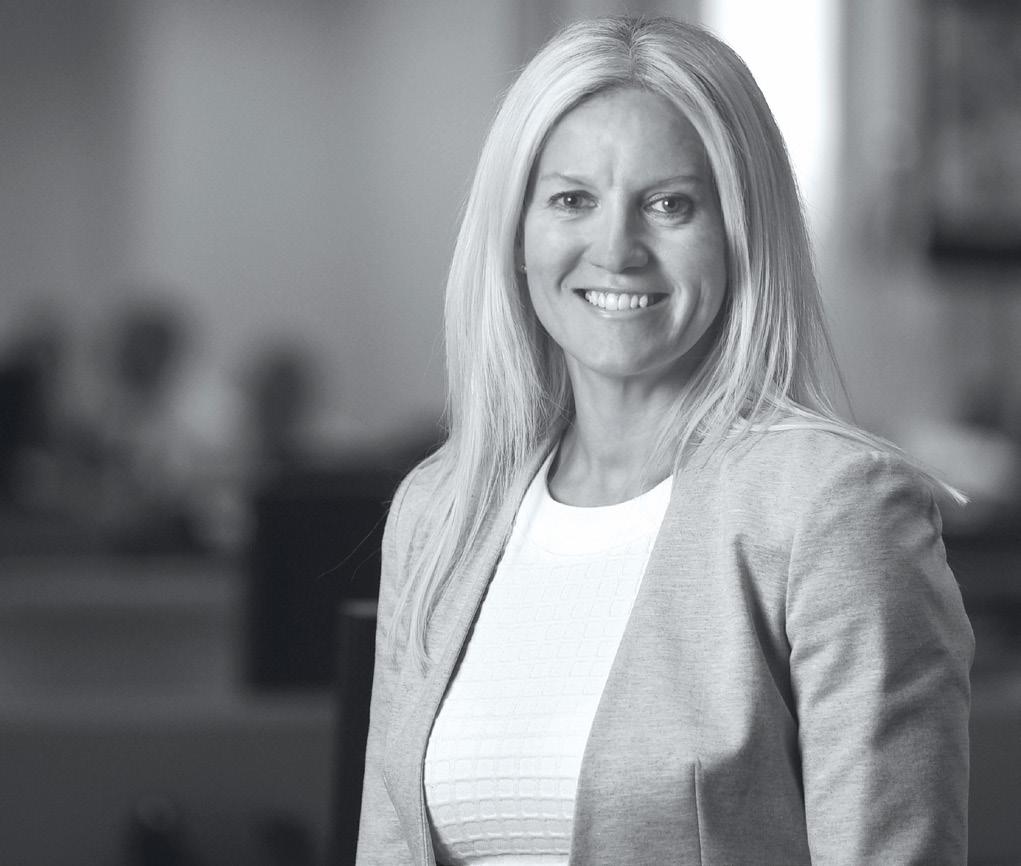
In addition to her current role as Commercial Director, Field Sales & Events across the UK for Reach PLC the largest commercial, national and regional news publisher in the UK, Sarah is a Business Fellow at UWE and in her spare time loves triathlons, half marathons and has even completed the Royal Marine Commando Course in Lympstone.
michael bartholomeusz
AMIGO
Michael Bartholomeusz joined Amigo, a UK-listed FCAregulated consumer credit firm, as part of an entirely new Board to transform the business, supporting financial inclusion and mobility for customers. Since, there has been a return to balance sheet solvency, and a new company purpose, vision and set of cultural values introduced. These are underpinned by new policies and procedures and a strengthened control environment, critical to the successful regulatory approval to launch a new lending proposition.
Professionally qualified in both finance and risk management, Michael is an experienced INED, passionate about maximising societal and business value of different lived experiences, including gender, ethnicity and neurodiversity, and an active member of NEDonBoard.

December/January 2023 42 TOP 32
renée jacobs
TECHSPARK
Renée Jacobs is the Founder of B in Bath, an organisation which is passionate about supporting and empowering individuals from UK minority and low-income backgrounds, as well as LGBTQ+ people in the workplace. A positive and driven go-getter, who is determined in supporting the success of those she works with, Renée is a TEDx Speaker, a Partner Business Manager at Aria Networks and a NED at TechSPARK, the not-for-profit tech community that is dedicated to connecting, educating and strengthening tech ecosystems from Swindon to Swansea.

helge lund
BP
Helge Lund is Chair at energy giant BP and is renowned for his open-minded and forward-looking approach as he leads the company’s Board in its oversight of the delivery of BP’s strategy. He has had a long and distinguished career as a business leader in the energy industry, previously serving as CEO of several companies, including the BG Group, Equinor and the industrial conglomerate Aker Kvaerner.
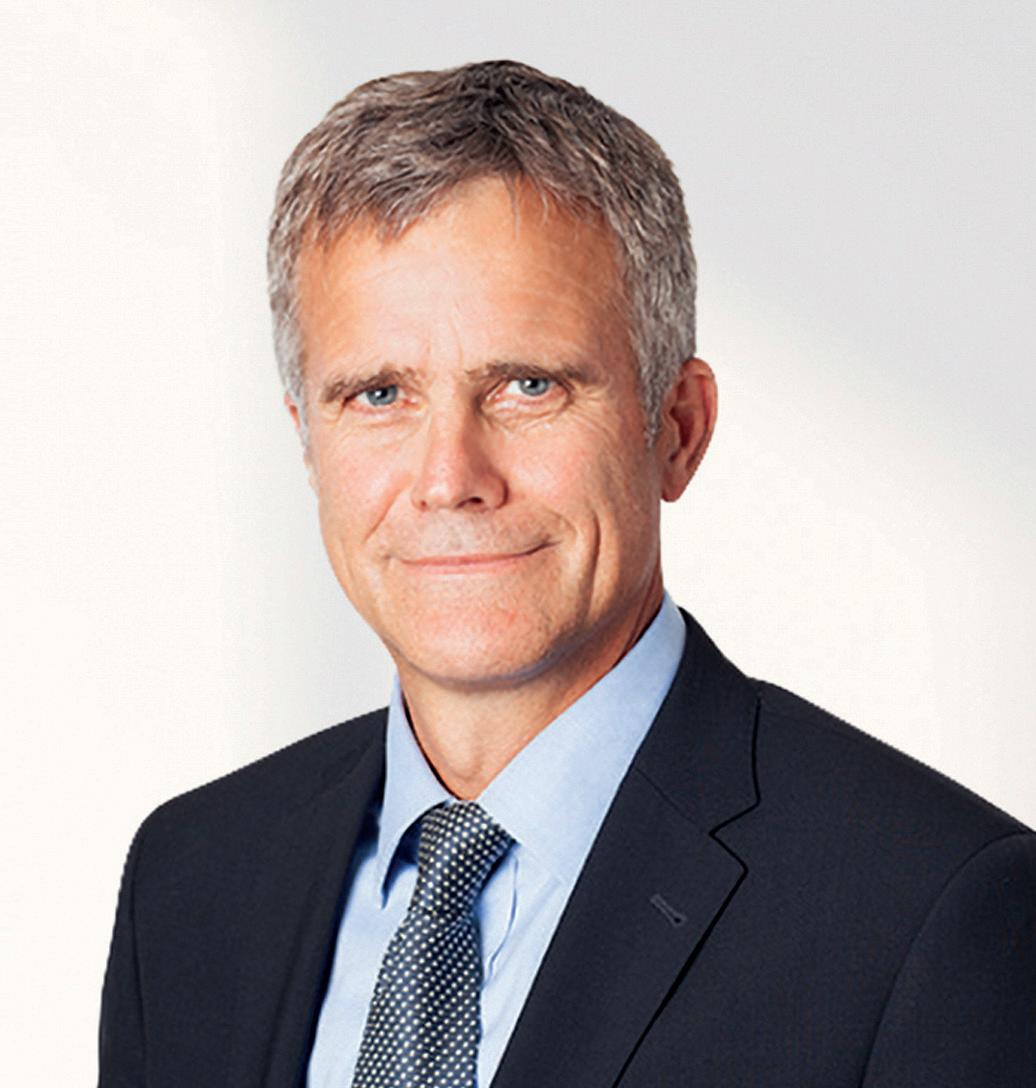
Prior to joining BP, he was NED for oil service group Schlumberger, but his extensive business experience extends to pharmaceuticals, healthcare and construction. Helge was also a winner at the 2022 Non-Executive Director Awards in the FTSE 100 category.
shriti vadera
ASTRAZENECA
With over 35 years of experience spanning the public and private sectors, in the UK and internationally, Shriti Vadera has carried out a variety of executive and non-executive roles for some of the world’s most prestigious companies.
When she became Chair of Santander UK in 2015 – a role she held for five years – she became the first woman to head a major British bank. She is currently the Chair of Prudential plc, and when she became the Chair of The Royal Shakespeare Company last year, Shriti became the first woman and person of colour to hold the position.
nikki walker
LEARN AND THRIVE
Nikki Walker is a board-level executive with 25 years of commercial leadership and general management experience within global organisations. In addition to her role as CEO of Quality Compliance Systems, Nikki is the Chair at Learn and Thrive, a company that enables children with Downs Syndrome to thrive through the provision of a broad library of educational videos and learning resources.
In her career, she has worked for fast-moving consumer goods giants including Coca-Cola, Schweppes and Henkel, and for Cisco, the US tech conglomerate. Nikki’s specialities include organisation excellence, finance, diversity & inclusion, strategic planning, conference speaking, and virtual team management.
Business Leader - Inspire • Inform • Connect 43 NON-EXEC DIRECTORS
ross graham
KEYWORDS STUDIOS
Ross Graham currently serves as the Independent Non-Executive Director and Chairman at Keywords Studios, the Irish video game services industry company. However, he has extensive executive and non-executive experience in the tech sector. This includes non-executive directorships at Psion plc when the company was successfully sold to Motorola Solutions Inc., and Wolfson Microelectronics plc prior to its sale to Cirrus Logic Inc.
A qualified Chartered Accountant since 1969 and Fellow of the Institute of Chartered Accountants in England & Wales, his executive experience includes more than a decade at Misys plc, a global software product and solutions provider, the latter part of which he served as the company’s Corporate Development Director.
anna uprichard
BLACKHAWK NETWORK
Anna Uprichard joined Blackhawk Network in 2014 as Digital Director, driving their EMEA strategy for digital gifting before moving into a Business Development Director role. Before this, Anna was at Tesco Bank where she spearheaded the project that launched the Tesco Gift Card Mall.

Anna is now the Regional Lead for EMEA, at Blackhawk Network, where she oversees the sale of gift cards through B2C channels in 14 countries. A key achievement of Anna’s has been creating a firstof-its-kind, innovative and flexible solution for major global retailer, Carrefour as part of a five-year global deal. The partnership gives consumers choice and a seamless experience running across in-store third-party malls, third-party e-commerce and ScanIt, Blackhawk Network’s latest technology.
irene dorner
 TAYLOR WIMPEY PLC
TAYLOR WIMPEY PLC
Experienced NED Irene Dorner currently serves as Chairman of the Board at housebuilder Taylor Wimpey and Chairman of Control Risks, the global risk and strategic consulting firm that specialises in political, security and integrity risk. Irene’s previous non-executive roles include a spell as the Chairwoman of Virgin Money.
She has also had a very distinguished career in the financial services sector, serving as the Deputy Chairman and CEO of HSBC in Malaysia and CEO and President of HSBC USA, with her experience at the latter leading to Irene being dubbed the first most powerful woman in the banking sector by US trade publication American Banker.
paul cadman
STEPS TO WORK
In addition to being the Chair at Steps To Work, a charitable organisation that supports local unemployed residents to obtain secure employment and financial stability, Paul Cadman supports several major West Midlands charities, including Acorns Hospice and St. Basil’s.
A forthright chair and NED that can develop consensus on difficult strategic issues, Paul has dyslexia and is a regional champion for people with disabilities. He’s also a Non-Executive Director for the Technology Supply Chain, which helps the manufacturing sector in the West Midlands to access growth support, a Professor of Enterprise for Birmingham City University, and a Fellow of University College Birmingham.
December/January 2023 44 TOP 32
bernadette conroy
FINANCIAL CONDUCT AUTHORITY
Currently serving as Non-Executive Director for the Financial Conduct Authority, Bernadette Conroy is an experienced executive and non-executive director across the public and private sectors, covering financial services, housing, urban regeneration and education. Bernadette’s other current non-executive roles include Chairperson for the Regulator of Social Housing, Independent Chair of Buildings and Space Management at Cambridge University, and NED at the North London Estates Partnership.
A Master of Arts graduate in Mathematics from the University of Cambridge, she is a previous winner at the Non-Executive Director Awards, having won the Not-For-Profit/Public Service Organisation award in 2020.
sir hossein yassaie
ULTRALEAP
Sir Hossein Yassaie is a legend of Britain’s semiconductor industry and an entrepreneur with a deep belief in technological and business model disruptions that can solve real problems, move markets and make significant differences for the better.
Awarded a Knighthood in 2013, the former CEO of Imagination Technologies currently serves in a wide range of non-executive chairmanships and directorships. This includes Board Director & Strategic Advisor at hand tracking pioneers Ultraleap; Chairman at Uniphy Ltd, the innovative smart surface firm; and Chairman & Strategic Advisor at Mindtech Global Limited, a platform that empowers data scientists with a fast way to specify, create and curate datasets.

Business Leader - Inspire • Inform • Connect 45 NON-EXEC DIRECTORS
ruth bender
THE CASE CENTRE
A chartered accountant who was a committee member of the ICAEW’s Faculty of Finance and Management for 13 years, Ruth Bender’s previous roles include non-executive directorships of a Health Authority and an NHS Trust, and membership of the Independent Remuneration Panels for two local authorities.
Her other previous roles include Corporate Finance Partner at Grant Thornton and Investment Manager at Legal & General Ventures.
Ruth is currently Emeritus Professor of Corporate Financial Strategy at Cranfield School of Management and the Chair of The Case Centre, a not-for-profit organisation and registered charity dedicated to advancing the case method worldwide.
nick sturge mbe
CENTRE FOR MODELLING & SIMULATION
Nick Sturge MBE is an experienced innovator and hands-on economic development practitioner. He IPO’d his first business - which would have been a unicorn in today’s money - in the UK aged 29. He holds the position of Non-Executive Chair at Diva Agency, Helastel, Fusion Processing Ltd and TechSPARK, whilst he is also a Non-Executive Director at the Centre for Modelling & Simulation (CFMS).
Previously, Nick was the Director at Engine Shed and the CEO of the Science Research Foundation, a wholly-owned subsidiary of the University of Bristol that operates The Bristol SETsquared Centre, as well as Engine Shed.
tessa bamford
SPENCER STUART
Tessa Bamford’s experience as a NED includes more than 10 years on the board of Ferguson plc, the leading plumbing and heating product distributor, and nine years on the board of Barratt Developments, one of the UK’s largest homebuilders. She currently leads the UK Board Practice at global search and leadership consultancy Spencer Stuart, where Tessa has been a consultant for the past 11 years.
Previously spending 18 years as an investment banker, she was also a founding Director of Cantos Communications, the online corporate communications company serving many FTSE 100, FTSE 250 and international businesses.
page nyame
INSTITUTE FOR COMMUNITY STUDIES
Qualified barrister Page Nyame currently serves as Advisory Board Member at the Institute for Community Studies, the community-led research and evidence centre based in Bethnal Green, London. She is also a former Trustee at the National Children’s Bureau, a charity that provides support to children so they can grow up safe and happy.
Page has a keen interest in charity governance, especially in causes related to advocacy for, and by, young people and the criminal justice system. She previously served as Director of Vocalise, an initiative which sees Bar students train prison inmates in the techniques of debating.
wol kolade cbe
NHS ENGLAND
Wol Kolade CBE is a highly experienced private equity leader as well as a Chair and NED of not-for-profit and public sector organisations in healthcare, education and culture. In addition to being the Deputy Chair at NHS England, Wol is a co-founder of the 10,000 Black Interns Initiative and a Trustee of Somerset House Trust. He also sits on the advisory boards of Level20, Acorn Capital and the Prudence Trust.
In June of last year, he was awarded a CBE for services to Financial Services in the Queen’s Birthday Honours, whilst he has served as Managing Partner of mid-market private equity firm Livingbridge for nearly 30 years.
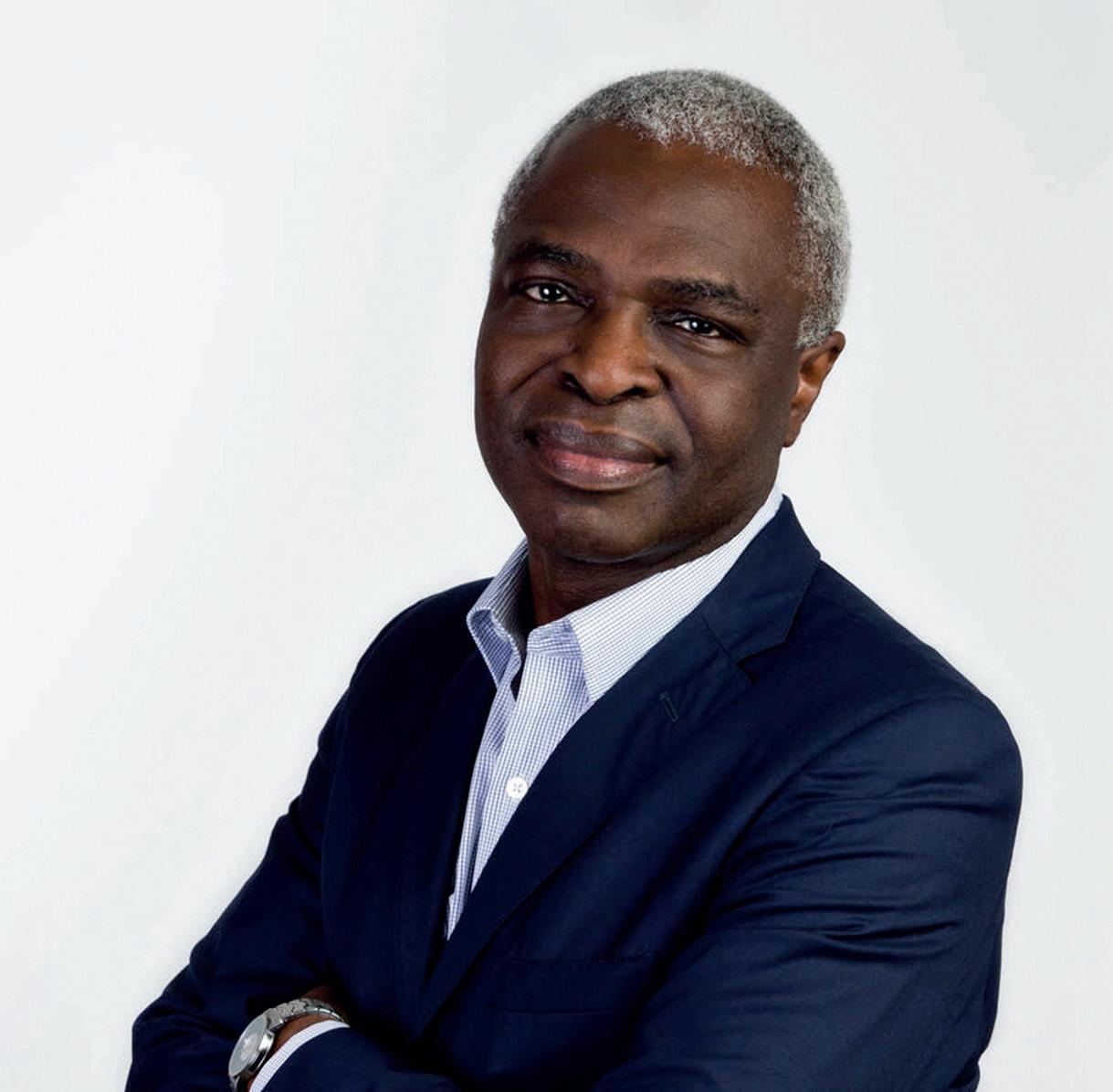
December/January 2023 46 TOP 32 NON-EXEC DIRECTORS
FABULOUS YOUR TEAM ARE
We couldn’t agree more.
Albert Goodman, a friendly, fair, forward-thinking and fabulous bunch of accountants.
Our brilliant people are with you wherever you are on your journey, through the ups and the downs. We will be here to celebrate with you when things are fabulous and support you through them when they’re not.
See what the rest of our clients have to say at www.albertgoodman.co.uk
leader in focus
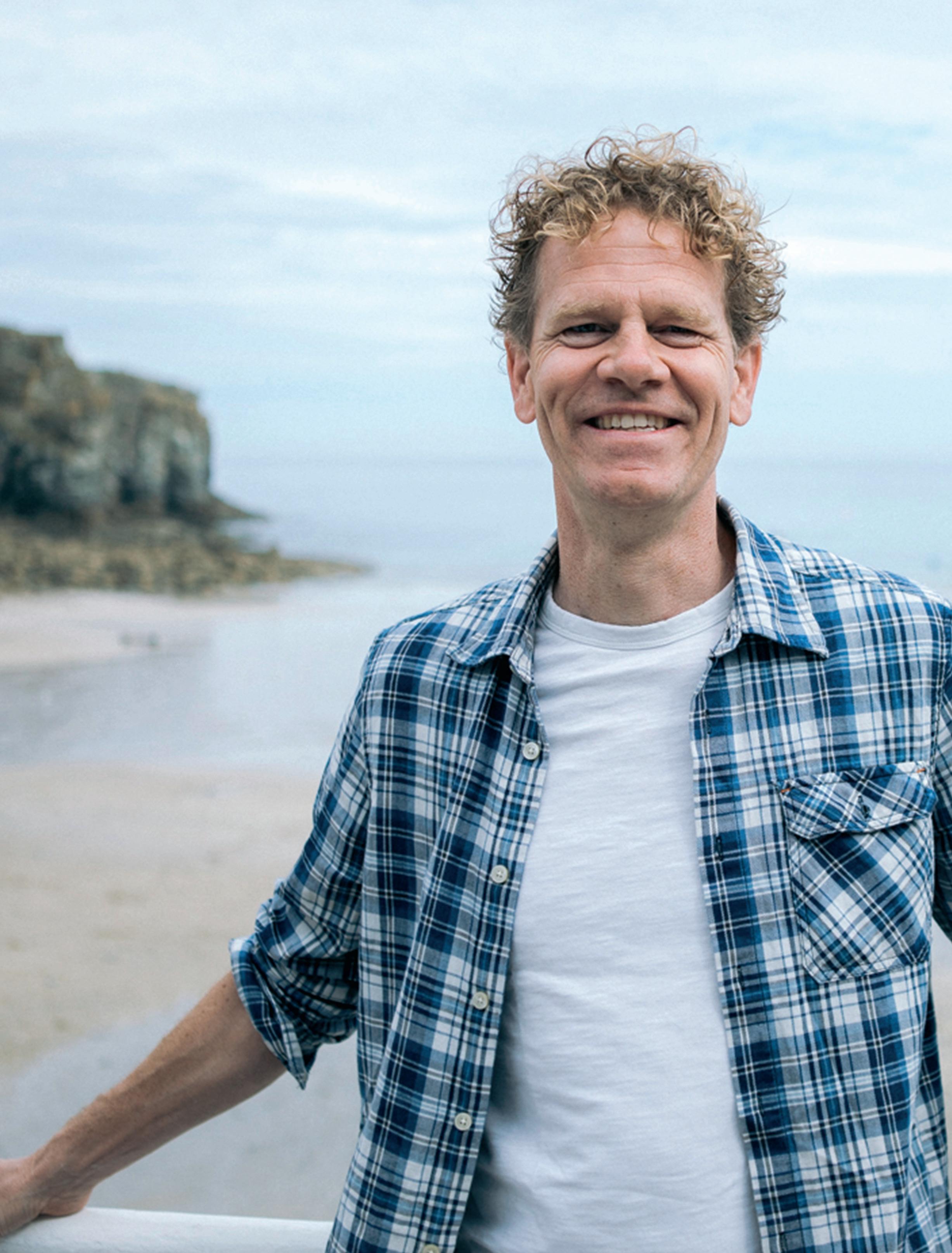
LEADER IN FOCUS
TENZING DRINKS huib van bockel
Huib Van Bockel is the Founder of TENZING, a 100% natural energy drink. Founded in 2016, TENZING is now the third largest functional energy drink in UK Grocery, according to Nielsen, and is stocked in all major UK supermarkets. In this feature, Van Bockel tells us why he left his position as Red Bull’s Head of Marketing to start his own energy drinks company, the biggest challenges he’s faced in his career, and why he lets employees choose their own managers.

CAN YOU TELL US A BIT ABOUT YOUR BACKGROUND AND YOUR EXPERIENCE PRIOR TO CREATING TENZING?
Growing up, we lived abroad a lot because of my Dad’s job. One of those places was South Africa, which is where my love of nature really developed. We’d play in the rivers and run around barefoot - it was such a formative time in my childhood. I also lived in Holland and Mexico and think the fact that I’ve lived in so many places has definitely influenced the international team we’ve hired at TENZING.
I read once that you’re more creative if you’ve lived in different cultures as you find different ways of interpreting and doing things. Living all over the world has been incredibly formative for me and for building TENZING as well.
WHY DID YOU DECIDE TO START YOUR OWN ENERGY DRINKS COMPANY?
I’d reached that moment in my life where I wanted to make a positive impact with what I was doing each and every day. I’d previously worked my way up in big companies and I wanted to see what I was made of!
I had this idea of creating a new way of energising people, one that was better for your health and for the planet. I stumbled across a Himalayan tea recipe used by Sherpas to energise themselves whilst on their high-altitude expeditions.
Intrigued to learn more about the history and benefits of this long-standing recipe, I went to meet the Tenzing family - descendants of Tenzing Norgay, one of the first two men to summit Mount Everest. They told me of Sherpa Tenzing’s closeness to nature, drive for adventure and above all, his burning ambition to reach the world’s highest summit.
We continue to work with the Tenzing family and he has become the brand’s guide, inspiration, and the plant-based teas he drank are the foundation of the TENZING recipe.
In 2016, “natural energy” drinks didn’t exist. We created the category which is now thriving. Something I’m very proud of.
Cont.
HUIB VAN BOCKEL
WHAT ARE THE MAIN CHALLENGES OF TAKING ON BIG NAMES IN THE ENERGY DRINKS CATEGORY?
There have been many challenges along the way - that’s all part of starting your own business! It was quite a shock that I couldn’t simply rely on the network I had built from my previous career. I’ve never been afraid to call on my connections, but a lot of people I’d worked with in the past weren’t interested. I had to persevere and build new connections who were interested in my vision.
In terms of taking on the big dogs, TENZING is trying to change the energy drinks game for good, but that’s not an easy feat when the market is traditionally filled with sugar, artificial ingredients and gas-guzzling marketing activities. Making people aware of a plant-based, lowcalorie and sustainable energy drink that energises you just the same has probably been our biggest hurdle, but we know it’s what people want and our growth shows that.
WHAT ARE THE BIGGEST CHALLENGES YOU’VE FACED IN YOUR CAREER AND HOW HAVE YOU OVERCOME THEM?
I’m a big believer in trial and error - just go out and do it, and if it doesn’t work, try
something else. With this mentality, comes resilience.
Back in 2016, I emailed Selfridges to see if they would be interested in stocking TENZING. I rocked up at Selfridges (after my email was met with silence) with nothing but a couple of TENZING cans - I didn’t even have a box! The person I had emailed got halfway down the stairs, saw me and said: “I told you I wasn’t interested!” - and walked straight back up. I cried.
It wasn’t just my ego that was hurt, it was a moment of “why am I doing this, why did I leave the security of my previous job, how is this going to pan out for my family?” I had risked everything for this business, and I had been utterly rejected, in person!
After a few back and forths, some strong data from Planet Organic and other stores, Selfridges did take us on and we’re still in there, now with 4 SKUs!
WHAT TRENDS ARE YOU CURRENTLY SEEING IN THE ENERGY DRINKS SECTOR?
The energy drinks market is constantly evolving. Sourcing locally is increasingly important as consumers want to know where their products are coming from.
Consumers are also becoming increasingly health-conscious and the impact of what they consume has on both their body and the planet.
WHY DO YOU LET EMPLOYEES CHOOSE THEIR OWN MANAGERS?
We’ve always operated a self-managed structure, which isn’t always easy, but it empowers our team members to stick to their guns and flourish. And that’s what I really look for when hiring my team. Someone who is self-reliant, not afraid to network, who gets on with things and who doesn’t like being told what to do!
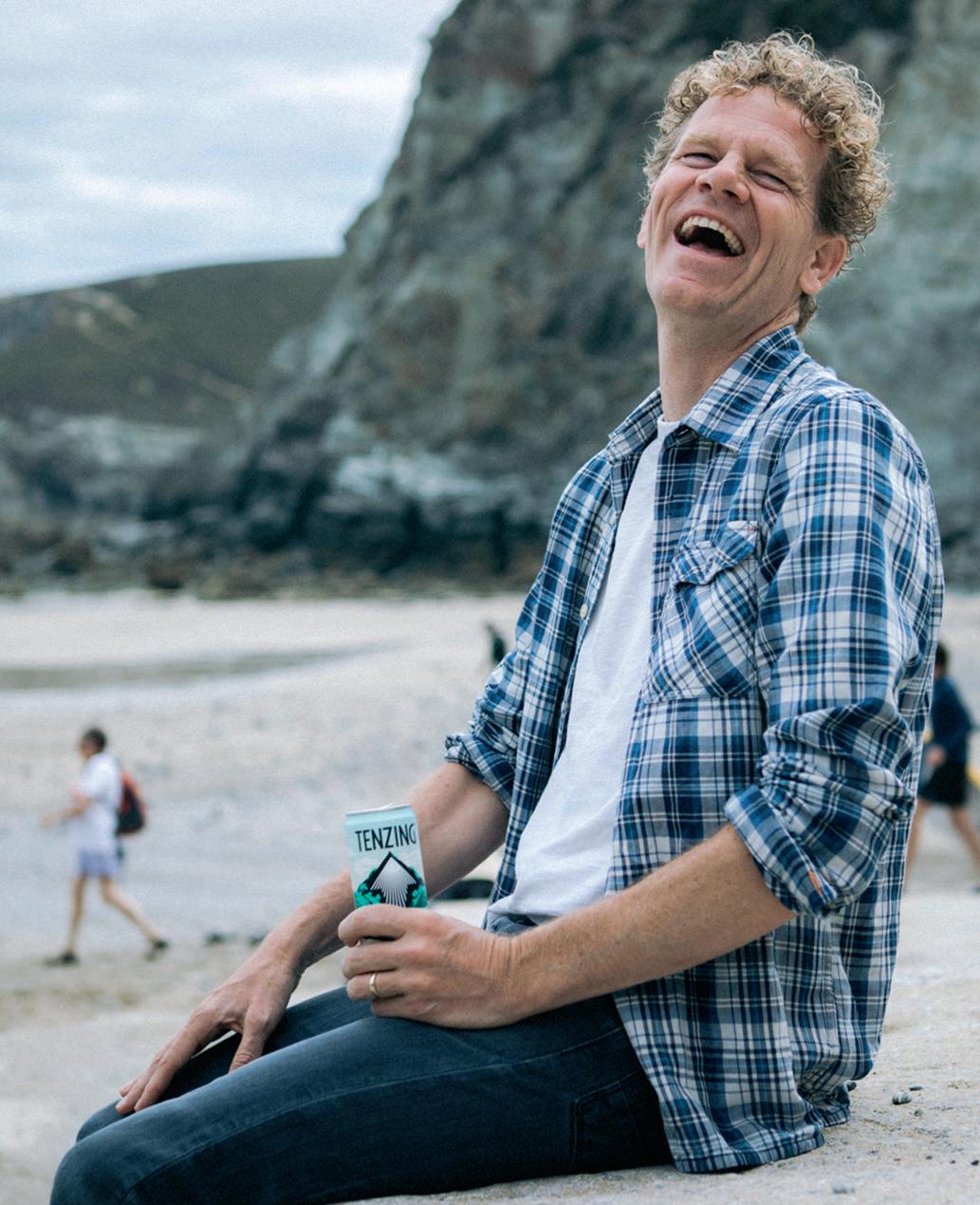
I’ve always hated people telling me what to do, so this is where the whole idea came from. I believe that when people have a feeling of freedom, they make better decisions. It’s also a great feeling to know that your ideas and strategy have led to success, identified when they haven’t and ultimately know what does or doesn’t work for you.
If your boss tells you to do something and then it doesn’t work out, you see it as their fault, rather than taking responsibility for the fact that you did it - which means you don’t learn for next time.
YOU PREVIOUSLY ALLOWED EMPLOYEES TO
SET THEIR OWN SALARIES – WHY DON’T YOU DO THIS ANYMORE?
I figured, we’re a start-up, employees will take that into consideration and make a decision based on what we can afford and what they think they’re worth.
What I didn’t realise at the time was that the psychological side of this kind of decision-making is incredibly tricky. Someone could think “oh I’m only going to ask for X, but what if someone else asks for Y?”. Everyone really struggled with it, and it began to affect everyone, including my partner! It became very messy, and I got rid of that initiative pretty quickly - but again, this comes back to the principle of trial and error - and we all learned as a result.
WHAT DO YOU THINK MAKES A GOOD LEADER AND HOW WOULD YOU DESCRIBE YOURSELF AS ONE?
I truly believe that a flat hierarchy system works. The ability to bounce ideas off each other within a close-knit team is really important to me. Work/life balance is also very important, so we go on annual team ski trips to bring the team even closer together and to celebrate our successes.
December/January 2023 50 LEADER
IN FOCUS
“WE’VE ALWAYS OPERATED A SELF-MANAGED STRUCTURE, WHICH ISN’T ALWAYS EASY, BUT IT EMPOWERS OUR TEAM MEMBERS TO STICK TO THEIR GUNS AND FLOURISH.”
IS THERE ANYTHING THAT YOU THINK CAN IMPROVE ON IN REGARD TO YOUR LEADERSHIP STYLE?
Like lots of entrepreneurs, I’m often fizzing with ideas! When I get very excited about something, I can find myself getting distracted.
I’ve always made sure that I hire people who aren’t afraid to tell me to get on with the task at hand or who will disagree with me and offer a solution or alternative idea. The best advice I can give to other leaders or founders is to ensure that you don’t surround yourself with ‘yes’ people!
ARE THERE ANY PEOPLE OR TYPES OF PEOPLE WHO INSPIRE YOU?
My biggest inspiration has to be Sir David Attenborough. Many people might not know this, but he was the Head of Content for the BBC and was approached to be the Head of the BBC, a job he turned down because he wanted to continue to create nature programmes. A lot of people would jump at the chance to have that job - but that wasn’t his goal.
He followed his passion and gave up a potentially huge career path, all because he wanted to focus on what he wanted to do. I think it’s very inspiring to follow your heart and what you really love.
I read somewhere that he was away from his family a lot because of the documentaries he was filming. I don’t want to follow in his footsteps in that way, but his being away from his family and creating the shows he did brought so many other families together, including my own - we’ve always watched his shows and he brought the love of nature to my kids.
This year, TENZING is now the third largest functional energy drink in UK Grocery according to Nielsen, and by the end of 2022, we’re set to double our growth again with global expansion on the horizon.
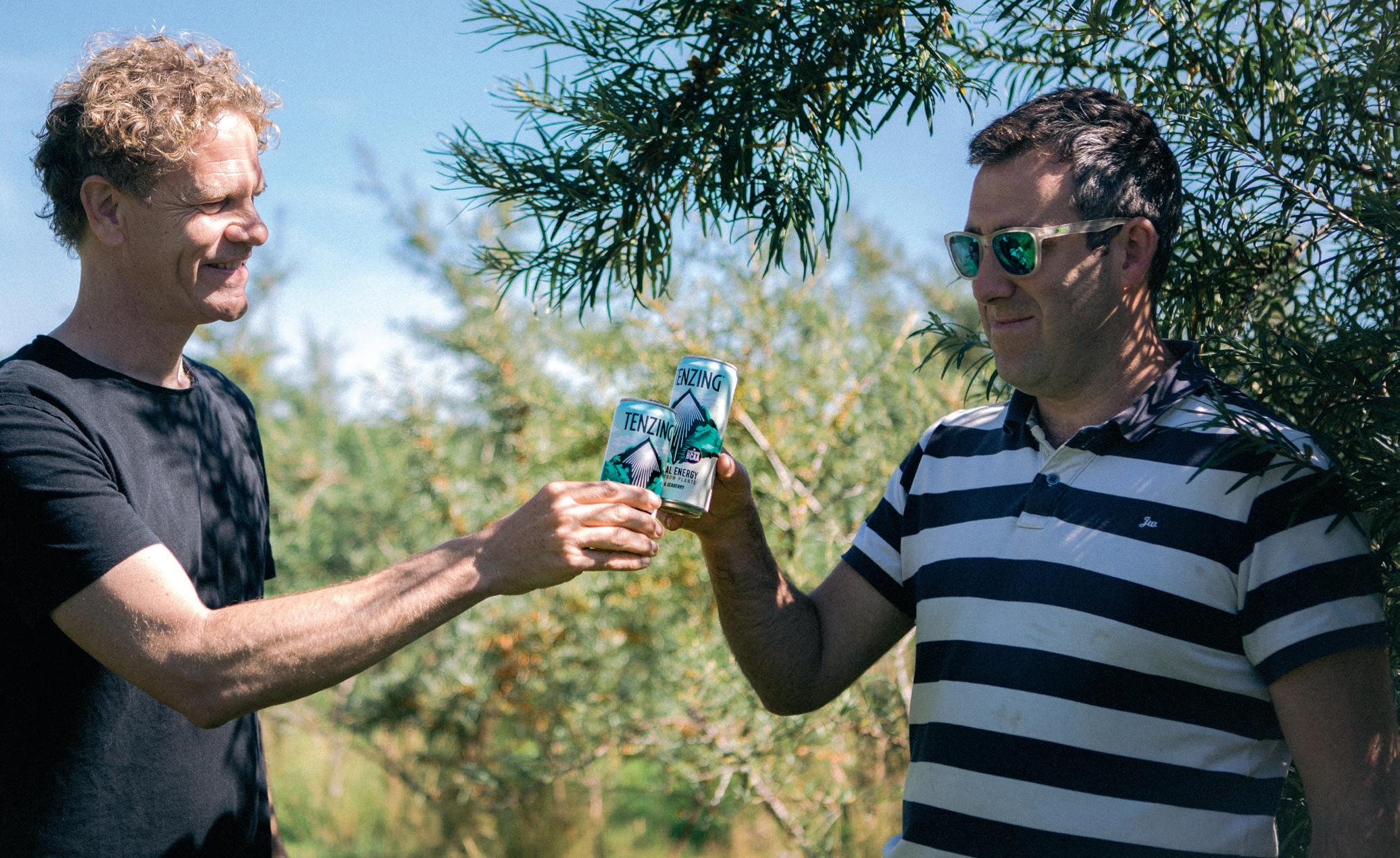
WHAT WOULD YOU LIKE YOUR LEGACY TO BE?
TENZING exists to inspire people to drink, experience and protect the power of nature. It’s why we create plant-based energy drinks that are big on energy and low on impact.
From being carbon negative to cleaning up Everest, I’m so proud of the work that we do to protect our planet. Nothing beats the thrill of climbing clean mountains, surfing pristine oceans and running through fresh air.
At the end of the day, making an impact in this world is a little bit like climbing a mountain - hard but worth it. The only difference is when you’re climbing a metaphorical mountain instead of a real one is that you’ll never reach the summit because there will always be more to do.
It’s a really exciting time for TENZING! We’re now stocked in all major supermarkets in the UK, and we’ve doubled our sales last year - despite the aftereffects of lockdowns.
If by the end of all this, TENZING has made a noticeable impact on our industry and the world around us, then I’d say that’s something to be pretty proud of!
Business Leader - Inspire • Inform • Connect 51 HUIB VAN BOCKEL
HOW HAS TENZING MANAGED TO ACHIEVE SUCH STRONG GROWTH IN THE LAST YEAR AND WHAT ARE YOUR PLANS FOR THE FUTURE?
“MY BIGGEST INSPIRATION HAS TO BE SIR DAVID ATTENBOROUGH. MANY PEOPLE MIGHT NOT KNOW THIS, BUT HE WAS THE HEAD OF CONTENT FOR THE BBC AND WAS APPROACHED TO BE THE HEAD OF THE BBC.”
Huib Van Bockel with Seth Pascoe, Co-Founder, Cornish Seaberry Company
ai, the metaverse, geopolitics and the other trends shaping businesses of the future
Bernard Marr is a best-selling author, influencer, futurist, and strategic business and technology advisor. His books, which explore data, performance indicators, business management and business trends have been translated into over 20 languages and have won multiple awards. Bernard explains why every business will be forced to adopt AI, why businesses need to take the metaverse seriously if they don’t want to be left behind, and why fears around technological advancements are largely unfounded.


December/January 2023 52
INSPIRATION
Listen to the interview here
WHAT DOES YOUR JOURNEY LOOK LIKE TO ENTERING BUSINESS?
I grew up in Germany and studied Business, IT and Engineering. My Professor had a relationship with Cambridge University and so I was given the opportunity to finish my degree at Cambridge, which I really enjoyed. I wrote a dissertation on how companies use data to inform their decision making and then for my second dissertation, I evaluated how companies use different software packages to visualise and analyse data. This was picked up by Gartner, and they published this as one of the first reports on BI and scorecard tools. I was catapulted into the business industry as a result.
Cambridge offered me a job and so I worked as a research fellow there. I never really planned any of this, I just fell into the industry. But I don’t think I was ever really an academic at heart. I’m far more interested in writing mainstream books.
A LOT OF YOUR WORK FOCUSES ON THE INTERSECTION BETWEEN BUSINESS AND TECHNOLOGY – WHAT ABOUT THIS AREA INTERESTS YOU?
We are currently experiencing something in business that we have never experienced before. We are experiencing a new intelligence revolution, where data has become one of the most important business assets for any organisation and where we have technology like AI, which I believe is the most powerful technology the business world has access to.
I believe very firmly that today every company has to see itself as an AI company, and data is at the forefront of this.
My initial work was on data and then AI came onto the scene. AI interacts with so many different technology trends, so suddenly we need cloud computing to enable us to use AI at scale and we need 5G to make it accessible. AI is also used to make virtual environments like the augmented and virtual spaces that are now becoming the metaverse. This is where huge trends are happening in the business world because businesses need to start understanding technology trends.
WILL ALL BUSINESSES NEED TO BE AWARE OF AND TAKE ADVANTAGE OF AI TECHNOLOGY, OR IS IT ONLY RELEVANT TO BUSINESSES WHERE TECHNOLOGY IS INTEGRAL TO THEM?
If anyone wants to take anything away from this interview, it’s that every single company on the planet will be an AI company in
the future. AI has evolved from something that was very complex to something that has become accessible – the technology has evolved.
We can use data to train AI to do things we could have never imagined. Before, we needed to understand rules and then use them to programme the AI algorithm. The area that AI has typically struggled with is the parts we haven’t been able to understand, so we couldn’t write a computer programme for it. We can now replicate a human-learning process in AI algorithms – this enables AI to understand our language.
In the past, we had intelligent robots that could make cars, now we have intelligent robots that can design cars. It’s important for organisations to realise that because AI is taking human jobs, this will mean that our jobs will become even more human.
For example, if you take a radiologist who scans for broken bones and cancer, now there are AI machines that scan for this. We now have machines that are designed with inbuilt AI to spot these issues without missing a thing. Now, the radiologist’s time is freed up and they can carry out other tasks that are more worth their time – spending eight hours looking at scans isn’t necessarily the best use of human time.
THERE IS A FEAR THAT AI WILL STRIP AWAY JOBS FROM A LOT OF PEOPLE – HOW DO YOU THINK AI WILL IMPACT JOBS CURRENTLY DOMINATED BY HUMANS?
Sometimes we are putting out this image that AI will take our jobs – this isn’t the world I’m seeing in the future. If you think about AI as a domesticated animal, this is a good analogy. We are in charge.
If you think about sniffer dogs, we use them because their sense of smell is so much better than ours. But we still need to train them and look after them – the same is true for intelligent machines in the future.
Business Leader - Inspire • Inform • Connect 53 BERNARD MARR
Cont.
WILL AI REPLACE JOBS? WHAT DOES THE WORKING WORLD LOOK LIKE IN THE FUTURE?
They won’t necessarily replace jobs; they will augment them. So, that means that the way we divide what humans and machines do will change. Of course, there will be some jobs that get lost, but this has happened in every industrial revolution. I read research by the Del Institute of Technology which said 80% of the jobs we will have in 30 years’ time don’t exist today. The worst thing a company can do is bury its head in the sand and say: “This isn’t going to happen.” It is going to happen.
If someone said to us 30 years ago that we would have social media managers, data scientists and AI engineers, we wouldn’t have believed them, but it has happened. This intelligence revolution will create more jobs than it will destroy.
WHAT ARE SOME OF THE RISKS INVOLVED IN THIS TECHNOLOGICAL REVOLUTION?
Technology is agnostic, so you can use it for good or bad. We can use technology to address things like sustainability and inequality. For example, AI is used in healthcare where you can now use an app on your phone to diagnose skin diseases, and this is becoming more reliable than even going to a dermatologist – so this has the potential of democratising healthcare because anyone in the world suddenly has access to these tools.
There are so many inequalities that we can address, but at the same time, if we don’t create the right infrastructure and economies where people can earn money in these countries, this could potentially reinforce some of the inequalities we already have in the world. This is challenging because these organisations will need to not only think about the skills they need but also how they will operate.
YOU HAVE SPOKEN ABOUT HOW INDIA AND CHINA ARE LIKELY TO SURPASS THE US AS A GLOBAL SUPERPOWER. IS THIS SOMETHING BUSINESSES NEED TO PAY ATTENTION TO?
Very much so because today we live in a globalised world where we have global supply chains. We see this today with the price of energy, which is a major concern for every single company in this country.
For example, in the tech world, there have been serious supply chain issues for microchips. A big aspect of this is the legacy from Covid-19 and the fact that these goods come from China because they still have a zero-Covid policy. Now, we have China not standing up to Russia in a way that I think they should have. All of these things impact businesses and pose risks, but they also pose opportunities. It starts with understanding your markets and who you are selling to, but even if you’re not selling in that market, you will probably be impacted by supply chain issues. I don’t see any of this going away any time soon.
ONE OF THE BIGGEST TECHNOLOGICAL DEVELOPMENTS HAS BEEN THE CREATION OF THE METAVERSE. IS THE METAVERSE A THREAT TO SOCIETY MORE THAN IT IS BENEFICIAL?

It’s a massive opportunity for organisations. There is so much confusion about what the metaverse is. For some people, it is like the film Ready Player One, where you escape into another world where you can be whatever you want to be. For me, it is the next evolution of the internet.
There have been two aspects to the internet so far: websites and social media. The next generation of the internet will be more immersive and feel more real, using technology like augmented and virtual reality. It will also be more decentralised, using technology like blockchain and NFTs.
WHY ARE BLOCKCHAIN TECHNOLOGY AND CRYPTOCURRENCY CONSIDERED REVOLUTIONARY WHEN IT IS JUST A WAY TO ACCOUNT FOR TRANSACTIONS?
Blockchain has the ability to take away inefficiencies in a lot of businesses because it is a distributed database – it isn’t centralised. Blockchain is a very secure way of storing data, so it has an in-built trust function. It allows us to rely on technology to perform this trust function.
One of the examples I give is the process of buying a house. The buyer and seller need to coordinate with one another and then they need to coordinate with the bank – this is so cumbersome. With the blockchain, you can press a button to buy a house and the paperwork is all done for you. There are a lot of opportunities with blockchain, but we also need to be aware of potential risks.
ALL EPISODES OF THE BUSINESS LEADER PODCAST NOW AVAILBLE ON
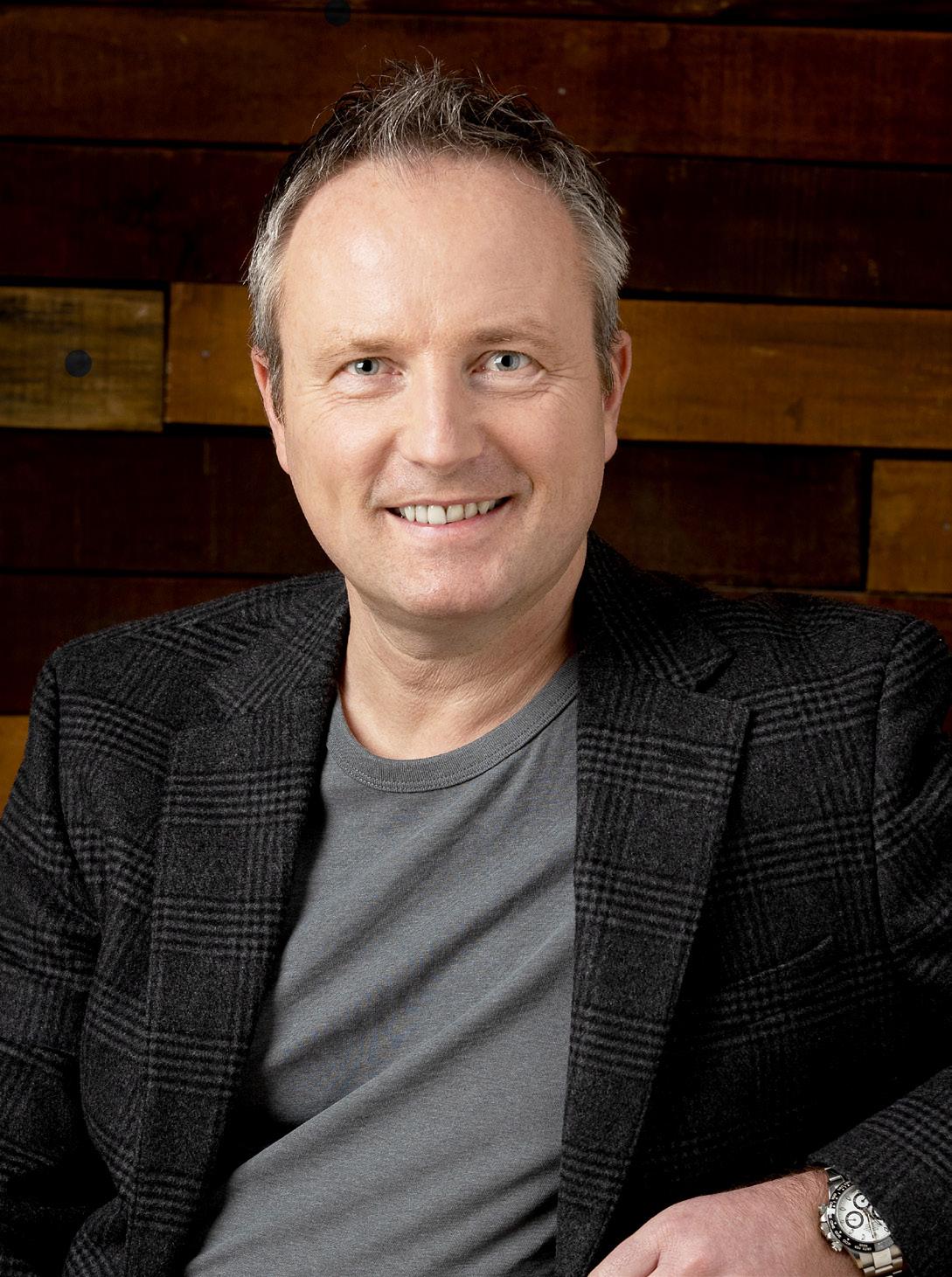
December/January 2023 54
INSPIRATION
TWO-THIRDS OF SMALL BUSINESS OWNERS AGREE THAT MENTORING
SURVIVE
For many small business owners across the UK, mentoring relationships are invaluable. From support with business strategy to working through personal challenges, mentors play an important role in helping businesses to survive, compete and grow.

Mentoring Matters
In the latest Mentoring Matters report, published in October 2022, 823 businesses of different sizes and two focus groups of mentors and mentees provided insight on what the modern mentor landscape looks like and the benefits towards business success.
Across all businesses, people who had been mentored believed that the support they received from their mentor contributed to their growth and survival. Over two-thirds (66%) agreed that access to mentoring was crucial in helping their business to survive and 76% believed mentoring was vital to their business growth.
The report continued with capturing the nature of modern relationships, highlighting the preference of mentees who want mentors that have both life and business experience. Life experience was the number-one attribute for a mentor to have (66%) closely followed by knowledge of specific business growth areas (58%) and relevant sector expertise (43%).
The conclusion of the report is that value and wisdom a mentor can bring can be transformative for a small business and in turn, can provide a boost to our economy. Heading into 2023, UK businesses face a tough macroeconomic environment and mentoring programmes such as the Government’s Help to Grow: Management Course can provide significant benefit to the mentors and participants.
Could you help a small business grow?
The Help to Grow: Management Course was launched in August 2021, and offers thousands of selected business owners, leaders and senior managers, leadership training provided by world-class business schools and access to oneto-one mentoring from an experienced volunteer business mentors.
Volunteer mentors can be anyone with a minimum of five years’ experience working in a business at a senior level or equivalent working closely with a small business. The time commitment for an individual mentor is ten hours over a period of twelve weeks.
Mentors participate in a short training session delivered by the Association of Business Mentors to equip them with the tools they need to become an effective mentor. Upon completion of the training, mentors are matched to participants on the platform based on location and area of expertise. The one-to-one sessions can either be conducted virtually or face-to-face based on what is agreed between the mentor and participant, and can be scheduled at a time that suits both parties.
The programme offers mentors the opportunity to develop new skills and experiences by being exposed to different business cultures and challenges. They can also benefit from access to a fully-funded Institute of Leadership and Management (ILM) Executive Coaching and Mentoring training up to Level 7.
Award-winning Business Mentor and Mentor Relationship Adviser for the Help to Grow: Management Course, Carolene Thompson comments, “Mentoring is a life changing experience for both mentors and mentees which provides the opportunity for both parties to fulfil their true potential through the development of authentic and meaningful relationships where you learn together, grow together and so much more.”
You can join the national effort to help a small business grow by signing up as a volunteer mentor today - scan here
The national mentoring element of the Help to Grow: Management Course is being delivered by a partnership of Newable, Enterprise Nation and the Association of Business Mentors on behalf of the Department for Business, Energy & Industrial Strategy.
Business Leader - Inspire • Inform • Connect 55 ADVERTORIAL
IS CRUCIAL IN HELPING THEIR BUSINESS TO
HOW IS ARTIFICIAL INTELLIGENCE HELPING BUSINESSES TO SCALE?
Futurist Bernard Marr boldly claimed on the Business Leader Podcast recently that ‘every single company on the planet will be an AI one in the future’. It’s hard to know for sure if that will be the case, but it is certainly true that artificial intelligence is being used by more and more businesses to try to give them a cutting edge when it comes to productivity and output.
In this article, we explore how companies are utilising this technology and what real-world impact it is having.
The most common assumption when people talk about AI and machine learning is that jobs will end up being replaced by this technology and somehow people will end up being usurped or undermined by artificial intelligence.
WHO’S ON THE PANEL?
Andrew Tsonchev Director of Technology Darktrace
Andrew Tsonchev, VP of Technology at Darktrace, believes that whilst the technology is exciting, its outcomes are a little less apocalyptic.
Darktrace were one of the early adopters in their sector and use AI to detect cyber security threats. Andrew explains: “We use AI to help our clients navigate the threat intelligence landscape and this can be in the form of detecting ransomware threats, which is a matter of speed, to other bigger examples where it is more about subtlety.
“For example, there was a threat that came out of China in 2020 and one of our customers was targeted by it. However, our technology was able to identify two weeks early that it was a danger and it was all down to AI. This isn’t about replacing jobs but aiding them and making it faster to solve problems.”
Stuart Dorman, Chief Innovation Officer at Sabio, says that AI is not replacing jobs but evolving them.
Stuart
Dorman Chief Innovation Officer Sabio
Lucie
Glenday CEO
MySense.AI
He explains: “We use conversational AI to help our customers solve problems without needing to speak to a human, by using chatbot and voice bot technology. We’re also using AI to tap into the large amount of data that exists in data centres and to better understand customers and why they are calling.
REAL-WORLD EXAMPLES
Artificial intelligence can often be seen as the stuff of movies and for scaling businesses that operate multi-millionpound turnovers, knowing where there can be a real-world application is important.

Dorothy
Agnew Partner
Moore Barlow
Ben
Slater SVP Marketing Beamery
“The net impact of this is that interactions are being handled more efficiently and in a shorter space of time. The calls are becoming more complex and the roles and skillsets required are becoming more skilled and sophisticated – so jobs aren’t being replaced but they are adapting.”
Lucie Glenday is the CEO and founder of mysense.AI – a health-tech business that is using AI to improve health outcomes.
It is already having a positive impact on its sector, as Lucie says: “We are using AI to pick up early signs of infection or mobility issues and we do this by tapping into very
December/January 2023 56 DEBATE Empathy.
Legal advice for your business T: 023 8071 8078 | E: dorothy.agnew@moorebarlow.com | moorebarlow.com
Expertise. Together at last.
advanced data. Working across the NHS, we’re already seeing a 47% reduction in unplanned admissions and a 63% reduction in contact time with GPs.”
When it comes to ownership, the subject of data can be tricky. Many businesses rightfully want to protect the large and complex datasets they are building and mining. But do the public have a right to access it and should companies be making it available?


Dorothy Agnew is a lawyer at Moore Barlow, specialising in AI.
She believes it is a fine balance: “Along with who should own IP rights in AI products, whether or not companies should be sharing confidential data is a burning issue. Companies argue that by making it public, it could impinge on progress and undermine the work they are doing but users rightly are calling for transparency and airing their rights to have access. Lawmakers recognise this issue and the need for more transparency, so watch this space.”
Regarding the ownership of data, Lucie
comments: “Data is the new gold and everyone is out to mine it. But we’re seeing subtle changes in how it’s being used. It’s interesting to look at the new data strategy coming out of Scotland where they are looking at more patient ownership and a much more federated approach, with people having responsibility for looking after their own data.
“I think this will become the norm going forward and it is what consumers want.
Business Leader - Inspire • Inform • Connect 57 AI & BUSINESS
Cont. Empathy.
at last. Legal advice for your business T: 023
8078 | E:
| moorebarlow.com
Expertise. Together
8071
dorothy.agnew@moorebarlow.com
“The temptation with a huge amount of data is to try and keep it to ourselves but it’s important, as organisations, that we understand where that data was generated from and where ownership should sit.”
WHAT IS THE AIM OF AI?
There are data scientists and technologists who disagree with the opening statement that Marr kindly laid out. They believe that many businesses are using AI when they don’t need to and often spitting out complicated marketing messages, with the technology they are using not having an impact on customers, productivity, or profit.
Understanding the fundamental aim of AI for businesses is important. Is it to automate or improve tasks?
Andrew comments: “It is a mixture of both, and you can split its use into scale and automation. Many tasks that were once repetitive can be replaced by AI and allow people to elevate to the next level of supervision, allowing people to be more creative and play at a more strategic, rather than tactical level.
“It can also be used at scale and a more advanced level, as we talked about earlier on how in our sector it can be used to detect cyber security threats.”
Stuart adds: “It is about automating tasks that once would have been handled by a human at the basic level. Then, up the rung on the ladder for us, it’s about interpreting the data to understand who the customer is, why are they calling and how can we learn from that and fix any issues they may have?”
On whether every business should be adopting AI, Dorothy says: “AI can unlock productivity in a business. It’s here to stay and the number of AI products and services is vastly increasing. Businesses should be looking at how they may be able to help with the company’s goals in a lawful way.”
HOW EASY IS IT FOR BUSINESSES TO FUND AI PROJECTS?
With the mood around funding for tech projects starting to change, as investors look for sharper returns quicker – what is the prognosis for funding AI-related endeavours?
Lucie comments: “Like anything, investors are looking for solid management teams that will deliver them a return, but with AI and technology-related projects, there can be a longer-term game and Innovate UK is worth looking at if you have an idea and want to create a business.
“It requires a lot of investment to run an AI-driven business and you need to understand it is not a quick fix – you need to ensure you have the right plan, the right teams, and a sufficient business pipeline.”

Dorothy adds: “We advise our clients to really ensure they are a business ready for investment and know in detail what
their IT estate looks like. This will ensure IP is protected in the business because investors will dig around in the due diligence stage and if there aren’t licenses in place or the copyright is owned by thirdparty developers, then you are going to have an issue.”
SKILLS OF THE FUTURE
It’s prudent to end the discussion by looking at how AI will impact the jobs market of the future.
Ben Slater, SVP Marketing at Beamery - a leader in talent lifecycle management - comments: “We must understand not just who has the skills we need today but who may be able to develop them for tomorrow’s world. It will be the traits that make us uniquely human that will be the most important in the future.
“AI will automate processes and boost productivity and evolve how jobs look, meaning that creativity and empathy are going to become more important. Collaboration is another skill that become more useful in the advent of AI too. Internally, AI has the ability to look at skill degradation in business and the life cycle of a skill which is usually three to five years. This is as important as what skills we’ll need to hire externally, as it is about productivity.”
December/January 2023 58 DEBATE
AI & BUSINESS
TASKS THAT WERE ONCE REPETITIVE CAN BE REPLACED BY AI AND ALLOW PEOPLE TO ELEVATE TO THE NEXT LEVEL OF SUPERVISION, ALLOWING PEOPLE TO BE MORE CREATIVE AND PLAY AT A MORE STRATEGIC,
THAN TACTICAL LEVEL.”
“MANY
RATHER
your
8071 8078 | E:
Andrew
Tsonchev Empathy. Expertise. Together at last. Legal advice for
business T: 023
dorothy.agnew@moorebarlow.com | moorebarlow.com
people & appointments
Business Leader gives a rundown of recent appointments and promotions across various sectors.
PEOPLE AGAINST POVERTY
APPOINTS
BELINDA WADSWORTH AS CEO

South West-based humanitarian charity, People against Poverty, has appointed a new CEO, as the organisation looks to grow its operations to help more people who are experiencing poverty in the UK and abroad. Belinda Wadsworth has been appointed as CEO, bringing extensive third-sector expertise gained through leadership roles in a variety of national and international charities over the last 25+ years.
RGB BUILDING SUPPLIES APPOINTS NEW MD
RGB Building Supplies has appointed Jenny Naylor as Managing Director, replacing Andy Gamble, who is retiring at the end of 2022, and will oversee RGB’s continued growth across the South West.
Jenny joined RGB as HR Manager in 2005 and was appointed to the board as HR Director in 2016, where she became more involved in the operational aspects of the company.
PATCHWORKS CHOOSES NEXT CEO
E-commerce integration provider, Patchworks, has appointed technology, engineering, and consulting heavyweight Jim Herbert, as Chief Executive Officer. Herbert joins from his position as SVP and General Manager EMEA at SaaS leader BigCommerce to lead Patchworks through its next stage of growth.
EXOTEC SELECTS NEW CFO
Global warehouse robotics provider, Exotec, has announced the appointment of Yann Leca as Chief Financial Officer. Previously Executive Vice President and CFO of OVHcloud, Yann will be responsible for structuring the organisation and driving Exotec’s financial strategy to ensure profitable and sustainable growth.
BILLIE BRADBERRY APPOINTED CMO FOR BULK
Bulk has recently announced the appointment of Billie Bradberry as Chief Marketing Officer. Heading up the health and nutrition company’s marketing team, Billie is charged with overseeing the planning, development, and execution of the marketing strategy to reinforce the overall brand position.
BRIDEWELL
STRENGTHENS EXECUTIVE
LEADERSHIP TEAM WITH NEW DIRECTOR
UK-based cyber security services business, Bridewell, has strengthened its executive leadership team further by appointing a new Director of Consulting.
Emma Leith, a globally recognised cyber security leader with 17 years of experience across security leadership, consulting, and services, will join Bridewell with full ownership of the business’s consultancy capability.
Business Leader - Inspire • Inform • Connect 59 APPOINTMENTS ROUND-UP
THE CHINA OPPORTUNITY FOR BRITISH BRANDS:
UNLOCKING GROWTH THROUGH ALIBABA’S 11.11 GLOBAL SHOPPING FESTIVAL
Roland Palmer from Alibaba Group speaks to us about one of the world’s largest retail events, 11.11 Global Shopping Festival, and the significant opportunity for British brands to engage with Chinese consumers.

WHAT IS ALIBABA GROUP’S 11.11 GLOBAL SHOPPING FESTIVAL?
Now in its 14th year, 11.11 Global Shopping Festival was an eleven-day event which this year featured more than 290,000 brands from across the world, and more than 21 million products. Around 40,000 overseas brands participated via Tmall Global, Alibaba’s cross-border platform, and more than 1,000 overseas brands on Tmall Global achieved year-on-year gross merchandise value (GMV) growth of more than 100%.
The festival began with participation from just 27 brands as an event to raise awareness about the value of online shopping. It is now an opportunity for brands to embrace the latest trends and technologies in retail innovation, unveil new products, showcase their latest offerings, and cultivate lasting relationships with consumers across China.
WHAT WAS NEW FOR 2022 11.11 GLOBAL SHOPPING FESTIVAL?
Brand loyalty
This year, we were focused on quality consumption and helping brands attract, engage and retain high-value customers.
Customer loyalty has been a key driver of sales growth for brands. As the consumer market becomes increasingly segmented, membership programs with high retention and strong loyalty are critical to brands. During the presale period of 11.11, brands on Tmall added more than 66 million new members. Beyond that, 600 brands have loyalty membership programs with over 1 million members
Nike, for example, launched an advanced membership program that customers experience using their virtual avatars. Customers could engage with the brand through 3D characters, games, and reward points. These interactive customer experiences helped to strengthen brand recognition and sales among its loyal fans.
Tech innovation
We are continuing to champion the advancement of new technology-driven marketing solutions.
For example, Alibaba’s livestreaming rooms provide immersive consumer experiences, which brands used to host online launch events through pairing with key opinion leaders (KOLs) and celebrities to promote their products. Incentives for merchant and
influencer-hosted livestreaming sessions was one of the many ways Alibaba provided support to SME businesses on its platforms.
Holland and Barrett engaged in a livestream during 11.11 by using a virtual KOL who was able to answer questions from consumers, replicating its product expertise that offline consumers would benefit from in a store.
During the Festival, 62 influencer and merchant-run livestreaming channels surpassed ¥100m in GMV and 632 influencer and merchant-run livestreaming channels surpassed ¥10m in GMV.
Sustainable practice
More merchants are participating in green logistics through Alibaba initiatives, which help to grow eco-friendly supply chains and drive more green consumption. This year, in total, more than 16 million consumers purchased eco-friendly products on Tmall and Taobao.
In addition, low-carbon products were labelled clearly to help encourage consumers make more sustainable choices and check the impact of their purchases on the environment.
Through enhanced digital technology and smart devices, Alibaba‘s logistics network, Cainiao, continues to deliver more sustainable logistics services for brands – this year, over 150,000 products joined the sustainable supply chain. Cainiao works with brands to explore low-carbon practices throughout their supply chain and encourages broader consumer participation in green logistics.
Recycled packaging is just one such initiative, which customers are offered free of charge at Cainiao Post stations. This year, the Post stations recycled nearly 4 million carton parcel boxes.
December/January 2023 60
INTERVIEW
Roland Palmer General Manager for the UK, Netherlands and Nordics
COMMENT
WHICH
BRANDS WERE SUCCESSFUL AT 11.11 THIS YEAR?
Popular categories such as beauty, FMCG and consumer electronics continued to perform well. However, this year also saw a rise in niche product categories, from collectible toys, pet products, jewellery, outdoor recreational sports and even record players! Emerging sports in China such as camping, skateboarding, and fishing more than doubled year-over-year in the first check-out period. In particular, the GMV of camping products surpassed that of the entire first day last year in the first 45 minutes of the Festival.
When it comes to the UK, Chinese consumers hold British brands in extremely high regard. This year, stand out British brands ranged from Fortnum and Mason to Fentimans, Hawkins & Brimble and Ella’s Kitchen. Fortnum and Mason’s exclusive gift hamper with its famous tea and biscuit products was one of its top selling items during the Festival and was developed in response to the Chinese trend for ‘highend’ gifting
WHAT ADVICE WOULD YOU GIVE TO BRITISH BRANDS ENTERING THE CHINESE MARKET?
Taking the first steps to export to China can be daunting. Our research shows that 48% of UK businesses believe exporting internationally is a viable opportunity but are concerned about the challenges of cross-border trade. Increased paperwork and customs rules, as well as payment security and late payments, are among the top concerns.
Our cross-border marketplace, Tmall Global, enables British brands to forego the need for local processing and infrastructure. More than 80% of brands on Tmall Global have made their China debut on the platform. British brands wishing to enter the Chinese market regularly reach out to our Alibaba team members in our London office and we provide advice based on our experience.
The partnership between British men’s grooming lifestyle brand Hawkins & Brimble and Alibaba has led to the brand’s dynamic growth in China, which now represents 25% of its overall business. This success is down to understanding local market dynamics and key trends across the product category, resulting in Hawkins & Brimble becoming a frontrunner brand that has brought the concept of the ‘traditional English gentleman’ to the Chinese.
It’s important to test and learn – and 11.11 Global Shopping Festival is an opportunity for brands to gain valuable insights in how to localise to the China market and optimise success. It’s an event at the cutting-edge of ecommerce, fuelling innovative ideas that help to drive growth for brands, whether already established in China or just taking the first steps.
William Warnock Partner, Real Estate

Time to switch on to energy efficiency standard changes
As many business owners continue to navigate the current economic and political climate, an area that may have been overlooked is the pending changes to the energy efficiency standards of commercial buildings.
Under the current Minimum Energy Efficiency Standards regulations, commercial buildings have an EPC rating that goes from A to G – where F and G are the worst performing.
From 1st April 2023, the rules are to become stricter, and it will be unlawful for landlords to continue to let a property with a rating lower than a ‘E’. Fines of up to £150,000 will be issued for those who fail to comply.
Prudent business operators in rented office space will wish to ensure compliance and avoid unwanted surprises. Checking whether your rented property complies with the regulations is a quick and free process, via the government online portal: www.gov.uk/find-energy-certificate
If your property has a rating of E or better, you’re ok for now although the Government plans to change the minimum EPC rating to C by 2027 and B by 2030.
Where a property has a rating of F or G, the landlord and tenant should open dialogue with one another as soon as possible; to agree upon works to the property to improve the energy efficiency; and improving the EPC rating to comply with the regulations.
Works to improve the rating of a rented property should be at the building owner’s cost and completed in advance of 1st April 2023 to enable a new EPC to be obtained to demonstrate compliance with the new rules.
There are limited exemptions from the new rules for certain properties or where there are legitimate reasons such as the cost of improvements being disproportionate recorded on the PRF Exemption Register. Advice should be taken where you are not certain of compliance.
To find out more, contact william.warnock@moorebarlow.com
Business Leader - Inspire • Inform • Connect 61 ROLAND PALMER
moorebarlow.com
CONGRATULATIONS TO OUR 2022 WINNERS
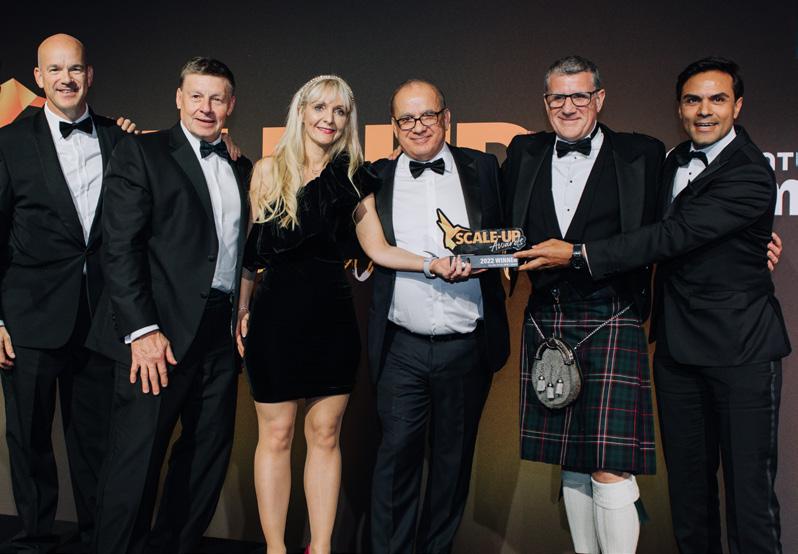


shel force


EST 1839
2022 gallery



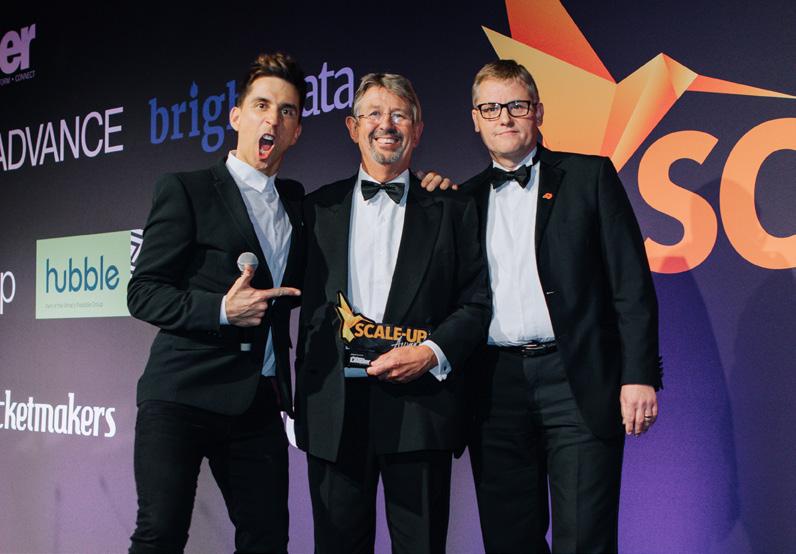

Become a sponsor and take advantage of a multi-channel marketing campaign, reaching the UK’s top scale-up businesses and the individuals that run them 2023 SPONSORSHIP DISCUSS THE OPPORTUNITIES AVAILABLE TODAY. 020 3096 0020 | SPONSORSHIP@BUSINESSLEADER.CO.UK THANK YOU TO OUR 2022 SPONSORS 2022 PARTNERS
HOW RETAILERS CAN IMPROVE SUSTAINABILITY AND PROFITABILITY IN HOME DELIVERY
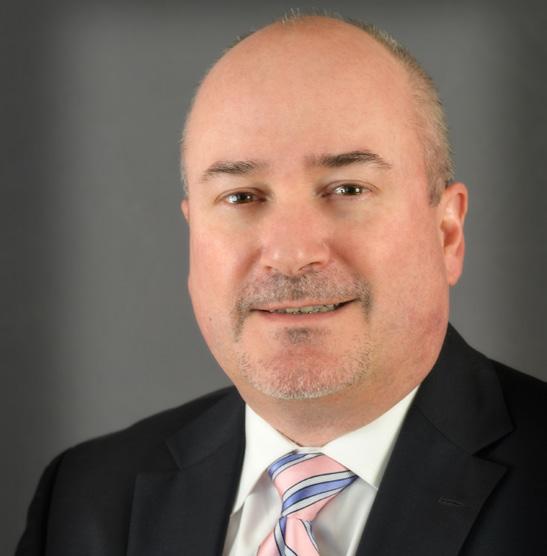

Today, home delivery and sustainability are coming together in consumers’ minds. Descartes recently conducted a comprehensive study to help retailers understand not only how this convergence is changing consumer home delivery preferences; but also how retailers can take advantage of these evolving preferences to help themselves and the environment.
The good news is that consumers are becoming more flexible about their delivery choices. They want retailers to provide sustainable delivery options; and favour retailers that are focused on sustainability.
The even better news is that most of the sustainable delivery options come at a lower cost for retailers to operationalise, compared with traditional deliveries. This presents a strong opportunity for retailers to create more customer loyalty and to reduce delivery costs, while helping the environment. Chris Jones, EVP, Descartes explains and reveals key findings from Descartes’ recent research.
THE DEMAND FOR “ECO-FRIENDLY” HOME DELIVERY IS STRONG
The study pointed to a number of findings that indicate that many consumers care about the environment and what retailers do about it does impact their buying decisions. The first of the below findings is a significant one for retailers because it helps to drive the other three metrics:
45%
Were quite/very interested in environmentally friendly home delivery options.
Said that helping the environment is quite/very important in their daily lives
39%

Would buy more from grocers who demonstrated that their supply chains were more sustainable than the competition
Said that they always/regularly make purchasing decisions based upon the environmental impact of a company or a product
THREE SUSTAINABLE DELIVERY OPTIONS WERE HIGHLY APPEALING TO CONSUMERS
Respondents were asked what sustainable delivery options were most important to them. The following findings point to the three most appealing sustainable delivery options for consumers—all of which can reduce costs for retailers:
• 50% thought the ability to combine orders to have them arrive all at once was quite/very important
• 48% said that they were quite/very interested in having retailers recommend the most environmentally friendly delivery option
• 38% were quite/very were willing to wait longer for deliveries to make them more environmentally friendly.
MAKING SUSTAINABLE DELIVERY HAPPEN
Achieving these three sustainable delivery options allows retailers to better consolidate deliveries and increase delivery density. The key to leveraging eco-friendly delivery options, though, is to understand which are more sustainable and present them to customers before they make a delivery decision.
Specialised delivery appointment scheduling tools, such as those Descartes offers, provide retailers with the capabilities they need to highlight the most environmentally friendly delivery options to their shoppers (see Figure 1); to dynamically offer services that combine deliveries; and to present options that extend the delivery time (e.g. slow down the delivery) to create more environmentally delivery plans. These options all combine to help create more efficient and profitable delivery operations for retailers, and they reduce their carbon footprint.
At Descartes, we’re focused on helping customers improve their performance while contributing to greener, more sustainable and productive logistics.
64 REVIEW
40% 50%
Chris Jones Executive Vice President, Marketing
and Services
Descartes

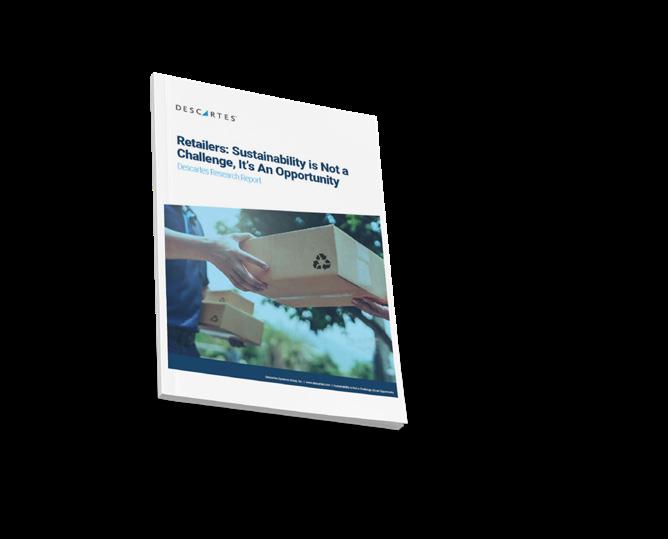
SUSTAINABILITY FIGURE 1: ECO-FRIENDLY STANDARD DELIVERY OPTIONS Call 01249 477099 | Email: info@descartes.com To download a copy of the full report Sustainability Is Not A Challenge, Its An Opportunity, visit: routinguk.descartes.com/resources/sustainability-research 7am9am 9am11am 11am1pm Wed 26 Oct 22 Thur 27 Oct 22 • • • Fri 28 Oct 22 • • Sat 29 Oct 22 • • Sun 30 Oct 22 Mon 21 Oct 22 • • Premium Delivery (£10.00) & Same Day Delivery (£25.00)
Leadership: Becoming a better boss
By Geoff Lawrence, Vistage Managing Director UK
It’s often said that people don’t leave companies; they leave bosses. That’s because no one has a greater impact on the day-to-day life of a worker — along with their personal performance, productivity and attitude — than their direct boss. Their boss creates their job description, defines their activities, sets their standards and expectations and reviews their performance.
More importantly, the boss creates and instils the vision, purpose and local culture for the work team. The CEO may profess high ideals, values and beliefs to the company, but it is the boss who dictates and drives the culture that employees work and live in every day.
At the same time, no role has experienced greater change because of the COVID-19 pandemic than the frontline manager, also known as the boss. This is primarily due to the shift from the traditional, Mondayto-Friday, 9-to-5 workplace to the hybrid workplace.
Once capable of managing employers in the office, bosses are still adjusting to how they best digitally connect and engage with remote employees. This requires greater clarity around tasks, deliverables and accountability. Bosses will need to maximise in-office days for collaboration, innovation, problem-solving and team-building events, or risk losing the focus of their team.
A newly empowered, enlightened and remote workforce will demand more from their bosses than ever before. In any scenario, employees still require job structure, task identification, deliverable schedules, goals and metrics, but they also need their bosses to simultaneously serve as a leader, coach and manager:
• LEADER: Leaders engage and connect their team to the organisation’s goals. They set the vision and direction for the workgroup, aligning the efforts of individuals and teams to broader objectives. They embrace culture at the team level and provide a consistent connection to the company’s culture. They also recognise and reward behaviours that exemplify culture and performance expectations.
• COACH: Coaches empower individuals to improve and teams to excel. They motivate and inspire workers to realise their goals and become the best they can be. They work with people to develop their skills, enhance their capabilities and realise their potential. Along with helping people set goals, they hold them accountable for the activities and results needed to achieve those goals.
• MANAGER: Managers are responsible for individual and team performance. They must clearly define roles, activities and responsibilities; set standards and expectations; and evaluate, critique and grade performance. Performance management is no longer about counting numbers or tracking attendance, but about ensuring the quality of deliverables.
Employee development — inclusive of leadership development — is one of the top 10 investments for small and medium sized businesses in 2022, according to Vistage research. Specifically, 78% of CEOs are directing resources towards programmes that develop the “bosses” in their organisation — that is, managers of people and other leaders.

These are wise investments. Why? Because bosses have the greatest direct impact
on the employee experience, which in turn impacts business performance. Building better bosses, then, builds stronger, high performing organisations
It’s hard to overstate the importance of a boss. A boss dictates the employee experience. A boss contributes to the performance of an organisation. A boss reinforces a CEO’s strategy, culture and performance expectations. However, a boss doesn’t instinctively know how to fulfil these duties; they must be guided. This is especially true in the new, digital workplace.
As CEOs look to develop their bosses, they should anticipate a steep and rocky learning curve. Bosses will make mistakes as they learn how to adapt to the new workplace and while some will adapt naturally, others will follow at a slower pace. To accelerate this process, CEOs should create opportunities for bosses to share what’s working and what’s not working. Thus, investing in the training and development of bosses — and helping them become better leaders, coaches and managers — is essential for CEOs. Those who do this first will be the fastest to realise productivity gains.
December/January 2023 66 CASE STUDY
WWW.VISTAGE.CO.UK
Why some CEOs go further and higher
As a business leader, you know that the hardest climb isn’t Kilimanjaro, Denali or Everest. It ’s the CEO ’s leadership journey, and it ’s fraught with all kinds of challenges and opportunities, setbacks and advances. The good news is you don’t have to go it alone. You can travel with an experienced guide who knows the lay of the land and an elite team of peers who’ve got your back.
You can equip yourself with world-class resources to navigate changing environments and uncertain conditions. You can take an approach forged over 60 years and travelled by 100,000+ CEOs of small and medium sized businesses around the world.
With that kind of support, how high could you ascend?
If you’re ready for the climb of a lifetime, the path starts here. Learn more at vistage.co.uk
CEO Climbers Wanted


Join a team of peak performers and take your business and your leadership to a whole new level.
Start with your FREE guide: Journey to the Summit
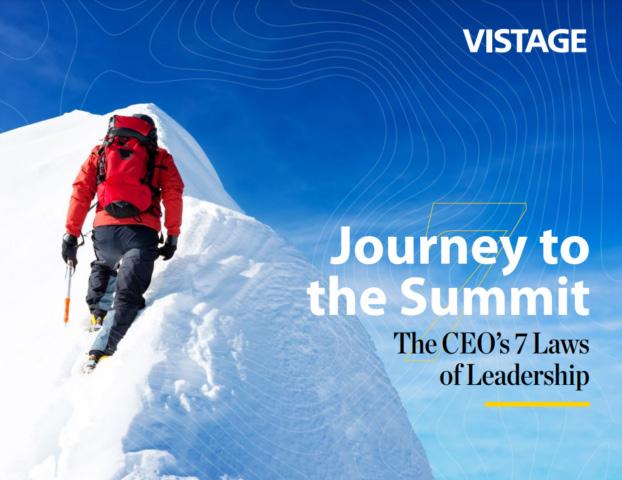
The CEO’s 7 Laws of Leadership Visit vistage.co.uk/what-is-the-climb/

JOIN THE CLUB...
Home Grown, London’s leading business club, is fast becoming the UK’s number one community of experienced entrepreneurs, sophisticated investors and trusted advisors. Still only in its third year and despite the challenges of the wider environment, we delve into what makes this club the home of entrepreneurialism.
Standing proudly on the corner of Great Cumberland Place, Marylebone, distinctly marked by its crimson Cedric flag, Home Grown has become the go-to venue for business, bringing together London’s brightest minds and most dynamic entrepreneurs and investors.
Launched in March 2019 as part of the Home House Collection, the Grade II listed townhouses provide the perfect setting to meet clients, work and expand your network with access to a community of over 4.5k leading professionals. The club features business lounges, pitching and meeting suites, private dining rooms, a restaurant and Unicorn Bar and 35 bedrooms.

Home Grown has always had community at its heart, now further heightened in the post-pandemic world where the need for purposeful and valuable connections is more important than ever. Regular member events such as their Food for Thought Supper Series, speed networking, monthly Meet the Members, Masters of Scale and pitching evenings provide ample opportunity to connect and gain insights, and, in their
F*ck Up Club, learn from others’ mistakes. The Home Grown flagship Rockstar series has welcomed the likes of David Howden, Howdens Insurance; Mr & Mrs Smith Co-Founders and former Dragon, Piers Linney, to the stage this year, as well as hearing from some of London’s most highly esteemed investors in their Million Pound Menu Meet the Investor dinner series. With the launch of their members’ benefits programme this year, members have access to over £5k’s worth of business support packages from accounting support, HR through to leadership and coaching.
‘Home Grown - a fantastic idea that takes the concept of a beautiful private members club and allies that to being dedicated to entrepreneurship’ Stephen Page, CEO of SFC Capital is an ambassador for the club and has collaborated with them on multiple fronts including on the flagship regular pitching event, Crocodile Lair and has hosted two lobbying events on behalf of SEIS which was recently improved as a result. ‘The only truly dedicated entrepreneurs club in London which can claim that title. ‘THE entrepreneurs club!’
Whilst the club has a business focus, Home Grown continues to bring the membership community together with its monthly social suppers, live music evenings, comedy nights, wellness programme and celebrity chef kitchen takeovers. Look out for a full calendar of members events throughout 2023 including the return of the Home House Collection Golf Day and celebrate the successes of members in a newly launched annual awards.
‘It’s always a delight to meet, network and entertain amidst the generally relaxed vibes that radiate throughout Home Grown’ Gladstone Small, travel entrepreneur and English Former Cricketer.
The continued support from members, ambassadors and key partners, including Business Leader who held the launch of their 2022 Scale-Up Awards at Home Grown, London & Partners, Beauhurst, UKBAA, Coutts and The Company of Entrepreneurs to name a few keeps this club going from strength to strength and continuing to attract the entrepreneurial pioneers of tomorrow through its doors.
ADVERTORIAL For more information or to arrange a
Grown experience day Call 020 3928 8088 / Email:
WWW.HOMEGROWNCLUB.CO.UK 44 Great Cumberland Place, Marylebone, London W1H 7BS December/January 2023 68
Home
membership@homegrownlcub.co.uk
NIS2: THE NEW LEGISLATION FOR EUROPEAN PERATORS OF ESSENTIAL SERVICES
BY ANTHONY ATKINS – SALES DIRECTOR, UK & AFRICA
In the last 12 months, the world has witnessed a tsunami of cyberattacks on European soil.
From parliaments, to hospitals, to manufacturers plus oil and gas networks, these attacks were carried out by ransomware gangs and state-sponsored adversaries with the sole mission of causing harm and disruption to European citizens and businesses.
Not surprisingly, in response to this wave of attacks, the European parliament has recently voted in favour of strengthening the cyber defences of member states through new legislation to improve resilience.
The new legislation will replace the existing NIS Directive, which MEPs deemed no longer fit to secure modern organisations as they become increasingly digitised and interconnected.
An Overview of the NIS Directive
The NIS Directive was adopted in 2016 and it was aimed at unifying cybersecurity for critical organisations across the EU.
However, one of its biggest challenges was that it didn’t consider each member state’s ability to build out a security posture. For instance, countries like France and Germany would be far better resourced than a country like Croatia. This led to inconsistencies, and it often meant information on attacks and threat actors wasn’t getting shared between countries.
The COVID pandemic also played a massive part in the demise of NIS, as more organisations were becoming digital and implementing remote working, which in turn heightened their cyber risk.
And where there is opportunity, there are cybercriminals.
Threat actors jumped on this digitalisation to launch endless attacks, which is one of the key reasons for the overhaul of the NIS Directive.
The new directive, which has been dubbed NIS2, will impose stricter security controls on member states and it will also impact more organisations. Operators of essential services, large businesses, financial organisations and all public sector bodies will need to follow the new legislation, which will tighten cybersecurity rules and aim to reduce the inconsistencies in NIS, while also encouraging more collaboration between member states.
However, as with any legislation or regulation, the big question is will it be enough?
The answer to this is that it is a big step forward, but attackers are determined and are constantly developing new ways to target businesses, particularly, industrial organisations that provide essential services into societies.
So, in addition to following the NIS2 Directive, what other steps can these member states and organisations take to improve their cyber resilience? Particularly as their environments are growing increasingly connected and Operational Technology is providing attackers with a route into their networks.
Here are five best practices to help organisations build out a robust and resilient industrial cybersecurity posture:
1. ICS-specific incident response plan
Create a dedicated plan that includes the right points of contact, such as which employees have which skills inside which plant, as well as robust next steps for specific scenarios at specific locations. Consider tabletop simulation exercises to test and improve response plans.
2. Build defensible architecture OT security strategies often start with hardening the environment - removing extraneous OT network access points, maintaining strong policy control at IT/OT interface points, and mitigating high risk vulnerabilities.
3. Improve visibility and conduct monitoring
You can’t protect what you can’t see. A successful OT security posture maintains an inventory of assets, maps vulnerabilities against those assets (and mitigation plans), and actively monitors traffic for potential threats.
4. Secure remote access
Secure remote access is critical to OT environments. A key method being multifactor authentication (MFA). Implement MFA across your systems to add an extra layer of security for a relatively small investment. Where MFA is not possible, consider alternative controls such as jump hosts with focused monitoring.
5. Manage and patch vulnerabilities
Knowing your vulnerabilities – and having a plan to manage them – is a critical component to a defensible architecture. While patching an IT system is relatively easy, shutting down a plant has huge costs. An effective OT vulnerability management program requires timely awareness of key vulnerabilities that apply to the environment, with correct information and risk ratings, as well as alternative mitigation strategies to minimize exposure while continuing to operate.
The NIS2 Directive places new requirements on industrial organisations in Europe to improve their cybersecurity defences. But it should only ever be viewed as a baseline and organisations should strive to do more to harden their networks against attacks.
By following these five best practices above, organisations can improve their cyber resilience and also reduce the impacts of security incidents within their environments.
www.dragos.com

Business Leader - Inspire • Inform • Connect 69
CYBERSECURITY Business
GAP
THINK THEY’RE RECEIVING!
We recently sat down with Marcus Herbert, the Head of Wellbeing at British Safety Council. In this exclusive interview, Marcus told us about the common gaps in an organisation’s wellbeing strategies, how companies can develop and implement a wellbeing strategy that works for their employees, and more.

HOW CAN COMPANIES DEVELOP A COMPREHENSIVE WELLBEING STRATEGY AND WHAT DO THEY CONSIST OF?
CAN YOU TELL US ABOUT YOUR BACKGROUND AND WHAT YOU WERE DOING BEFORE JOINING BRITISH SAFETY COUNCIL?
My journey with wellbeing began with personal training, and during that time, I found I got a lot of satisfaction from helping normal people achieve amazing things. I was studying for a Masters in sport and exercise science and was convinced I wanted to work with elite athletes.
So, I started working with a professional rugby team, which involved working with some household Welsh rugby greats (any young Welshman’s dream) but was surprised to find I didn’t get as much satisfaction helping amazing athletes achieve normal things.
So, I ended up turning down a fully funded PhD with a Premier League football team to become a health and wellbeing physiologist. That was in 2011 and I’ve been helping either individuals or organisations with wellbeing strategy ever since.
The traditional model we often see is companies will put in place interventions and benefits that they see as being helpful to their organisation because they want their employees to have access to services and benefits. This is admirable as the organisations clearly want to do the right thing for their employees, but those benefits are often not used by the employees, and this is often because the employer hasn’t started the process of capturing what the employee need is. Sometimes, employees also don’t engage with benefits because they don’t know they exist.
So, the first stage in developing a comprehensive wellbeing strategy is to understand what your employees require to improve their wellbeing and then understanding what communication channels work for them. Then you need to understand how to engage with your workers to ensure they make use of the benefits. More often than not, organisations will find more success when the message comes from the top down, so you need to have engagement and encouragement from leadership at all levels for any form of wellbeing benefit or provision to work.
ARE THERE ANY COMMON THEMES WHEN WORKING WITH ORGANISATIONS TO DEVELOP WELLBEING STRATEGIES?
We have consistently found there is a gap between what organisations think they’re doing for their company versus what employees
think they’re receiving. That is one of the major reasons why there’s a failing in traditional wellbeing programmes. For example, a company might train mental health first aiders thinking that’s the right thing to do, but then no one in the organisation knows who the first aiders are and what support they provide.
There are similarities between guiding an individual on how to improve their wellbeing and how you guide an organisation on approaching their wellbeing strategy and it comes down to focusing on what’s most important. Let’s say you went for a health assessment and underwent a full range of tests. You find that 90% of results are healthy and don’t need to change, 5% are not quite healthy but not at risk, so they might benefit from tweaking, and the final 5% are at-risk areas that need to change. The sensible
INTERVIEW
THERE IS A
BETWEEN WHAT ORGANISATIONS THINK THEY’RE DOING FOR THEIR COMPANY VERSUS WHAT EMPLOYEES
December/January 2023 70
thing to do would be to focus on the at-risk areas to reduce the risk of disease later in life.
The same thing applies with organisational wellbeing. We tend to find that organisations provide a huge host of wellbeing benefits that may not actually focus on the specific needs of that organisation.
FOCUSING ON HEALTH AND SAFETY, IS WELLBEING TIED INTO THAT AREA?
Absolutely. Traditionally speaking, when you look at health and safety, there’s been more focus on the safety part, but the definition of health includes wellbeing. Yet because there’s been more focus on the safety side and preventing the risk of harm occurring in the workplace, it’s been more difficult for the industry to realise that someone’s wellbeing has an impact on their safety risk.
For example, if someone is using machinery that could cause serious injury if used incorrectly, and that same person is
distracted due to poor mental health, there is an increased risk of an incident taking place. Furthermore, we often find that if somebody is going through any form of challenge, whether it be physical, mental, social, or financial, they might turn to coping mechanisms such as drugs and alcohol. And somebody that’s impaired through alcohol or drug ingestion will further increase the risk of incidents occurring.
There’s a lot of data showing that people with poor wellbeing for any number of reasons are at increased risk of non-fatal incidents happening in the workplace, which is why British Safety Council is now advising organisations on how to approach wellbeing.
IS THERE A DIFFERENCE IN WELLBEING PROVISION BETWEEN SMALLER AND LARGER COMPANIES?
According to the CIPD’s annual report on health and wellbeing in the workplace, around 70% of organisations above SME level report having a wellbeing strategy in place, compared to only 30% of SMEs. You
might think this makes sense because larger workforces have a higher rate of absenteeism and a bigger budget to accommodate someone in the organisation dedicated to wellbeing.
However, SMEs have up to 250 employees, which is very significant if you don’t take a strategic approach to wellbeing. SMEs may suffer more if someone is away from work for a prolonged period of time as a result of illness, stress or another issue because the absentee might be the only person in that organisation who knows how to complete a particular task.
The CIPD report also shows that when you look at the outcomes of wellbeing activity, like reduced staff turnover, improved morale and lower presenteeism, the companies that have a strategy in place outperform those who take an ad-hoc approach, so those who take a strategic approach to wellbeing that addressed the needs of the organisation are attaining better business outcomes.
If you’d like further information on wellbeing strategies in the workplace, call 020 3510 8355 or email: Marcus.herbert@britsafe.org.
MARCUS HERBERT
Business Leader - Inspire • Inform • Connect 71
ipos on the horizon

IPO activity has experienced something of a fall from grace in 2022, a far cry from the dizzying heights of the previous year, with interest rates rising around the world, geopolitical challenges and uncertain market conditions creating an unfavourable IPO landscape. At the end of Q3 2022, there had been 992 IPOs globally raising $146bn, a 44% and 57% decrease year-over-year (YOY) respectively. The tech sector has experienced the most significant IPO activity, although the average deal size dropped $261m to $123m YOY.
YOY, Europe has seen proceeds from IPOs drop 76%, but the Middle East has seen a 209% increase in proceeds despite the number of deals in the region dropping 51%. Despite a 25% decrease by deal numbers YOY, Asia-Pacific exchanges have performed better, housing five of the top 10 global IPOs so far in 2022 and contributing 69% of the global share of proceeds. We have profiled four upcoming IPOs that could happen before the end of 2022 or at the beginning of 2023.
redditMany expected an IPO for US social media aggregation and discussion site Reddit in early 2022, but the company is yet to release an IPO date, and whilst they have submitted a draft to the Securities and Exchange Commission (SEC), there has been no official S-1 filing. After raising $410m from Fidelity Investments last year, Reddit reached a valuation of about $10bn, and as of March 2022, it ranks as the ninth mostvisited website in the world and the sixth most-visited in the US, according to Semrush.
revolut


Revolut’s IPO was originally planned for 2022, but company CEO and co-founder, Nikolay Storonsky has said this is now looking increasingly unlikely. The British fintech has now passed the 25 million customer mark and has a valuation of over £24bn, so if an IPO was to take place in early 2023, it could be a bright start to the year, especially considering IPO activity so far in 2022 has dwindled in comparison to the previous year.
klarna
Buy Now Pay Later firm Klarna is reported to be considering going public this year, with an estimated valuation of almost $50bn. The Stockholm-based firm, which says it has nearly 150 million customers worldwide and operates in 45 countries, has experienced considerable growth in recent years thanks to the growth of online shopping during the pandemic. The value of the third-party purchases it has financed rose 42% YoY in 2021, and revenues also rose 38%.
starlink
Starlink, the satellite constellation company that provides internet access to most of the Earth, is valued at around $42bn and currently generates annual revenues of $10bn. Elon Musk first announced plans for the company to IPO in February 2020, but the spin-off from parent company SpaceX is yet to release an official IPO, claiming that it will only do so “when its cash flow is more predictable”. The company already has regulatory approval in the UK, Australia, Greece and Germany, and over 10,000 users globally.

IPO ROUND-UP


































































2023 SPONSORSHIP 2023 SPONSORS Become a sponsor and take advantage of a multi-channel marketing campaign, reaching the UK’s top tech decision makers. DISCUSS THE OPPORTUNITIES AVAILABLE TODAY. 020 3096 0020 | SPONSORSHIP@BUSINESSLEADER.CO.UK 40 JUDGES TO MEET GAIN ACCESS TO THE SENIOR JUDGING PANEL CONNECT WITH 500+ ATTENDEES TICKETS TO THE PRE-EVENT & AWARD CEREMONY 1M BRAND IMPRESSIONS NATIONAL MULTI-CHANNEL MARKETING CAMPAIGN £17M AVERAGE TURNOVER OF ENTRANTS MEET FINALISTS & COMPANIES THAT ENTER
December/January 2023 74
joined-up
FREE INITIAL CONSULTATION AVAILABLE BT201 • Flexible health, safety and wellbeing solutions tailored to your needs • Unique tools to benchmark your organisation • Access to industry leading HR, health, safety and wellbeing tools • Advice and support from industry experts to help you every step of the way. Helps you build a healthy, profitable, and sustainable future for your company. Scan here to book your free initial telephone consultation: www.beingwelltogether.org support@beingwelltogether.org
The first truly
approach to employee health, safety and wellbeing for SMEs




















































































































































 TAYLOR WIMPEY PLC
TAYLOR WIMPEY PLC





































































